- COVID-19 travel advice
Considering travel during the pandemic? Take precautions to protect yourself from COVID-19.
A coronavirus disease 2019 (COVID-19) vaccine can prevent you from getting COVID-19 or from becoming seriously ill due to COVID-19 . But even if you're vaccinated, it's still a good idea to take precautions to protect yourself and others while traveling during the COVID-19 pandemic.
If you've had all recommended COVID-19 vaccine doses, including boosters, you're less likely to become seriously ill or spread COVID-19 . You can then travel more safely within the U.S. and internationally. But international travel can still increase your risk of getting new COVID-19 variants.
The Centers for Disease Control and Prevention (CDC) recommends that you should avoid travel until you've had all recommended COVID-19 vaccine and booster doses.

Before you travel
As you think about making travel plans, consider these questions:
- Have you been vaccinated against COVID-19 ? If you haven't, get vaccinated. If the vaccine requires two doses, wait two weeks after getting your second vaccine dose to travel. If the vaccine requires one dose, wait two weeks after getting the vaccine to travel. It takes time for your body to build protection after any vaccination.
- Have you had any booster doses? Having all recommended COVID-19 vaccine doses, including boosters, increases your protection from serious illness.
- Are you at increased risk for severe illness? Anyone can get COVID-19 . But older adults and people of any age with certain medical conditions are at increased risk for severe illness from COVID-19 .
- Do you live with someone who's at increased risk for severe illness? If you get infected while traveling, you can spread the COVID-19 virus to the people you live with when you return, even if you don't have symptoms.
- Does your home or destination have requirements or restrictions for travelers? Even if you've had all recommended vaccine doses, you must follow local, state and federal testing and travel rules.
Check local requirements, restrictions and situations
Some state, local and territorial governments have requirements, such as requiring people to wear masks, get tested, be vaccinated or stay isolated for a period of time after arrival. Before you go, check for requirements at your destination and anywhere you might stop along the way.
Keep in mind these can change often and quickly depending on local conditions. It's also important to understand that the COVID-19 situation, such as the level of spread and presence of variants, varies in each country. Check back for updates as your trip gets closer.
Travel and testing
For vaccinated people.
If you have been fully vaccinated, the CDC states that you don't need to get tested before or after your trip within the U.S. or stay home (quarantine) after you return.
If you're planning to travel internationally outside the U.S., the CDC states you don't need to get tested before your trip unless it's required at your destination. Before arriving to the U.S., you need a negative test within the last day before your arrival or a record of recovery from COVID-19 in the last three months.
After you arrive in the U.S., the CDC recommends getting tested with a viral test 3 to 5 days after your trip. If you're traveling to the U.S. and you aren't a citizen, you need to be fully vaccinated and have proof of vaccination.
You don't need to quarantine when you arrive in the U.S. But check for any symptoms. Stay at home if you develop symptoms.
For unvaccinated people
Testing before and after travel can lower the risk of spreading the virus that causes COVID-19 . If you haven't been vaccinated, the CDC recommends getting a viral test within three days before your trip. Delay travel if you're waiting for test results. Keep a copy of your results with you when you travel.
Repeat the test 3 to 5 days after your trip. Stay home for five days after travel.
If at any point you test positive for the virus that causes COVID-19 , stay home. Stay at home and away from others if you develop symptoms. Follow public health recommendations.
Stay safe when you travel
In the U.S., you must wear a face mask on planes, buses, trains and other forms of public transportation. The mask must fit snugly and cover both your mouth and nose.
Follow these steps to protect yourself and others when you travel:
- Get vaccinated.
- Keep distance between yourself and others (within about 6 feet, or 2 meters) when you're in indoor public spaces if you're not fully vaccinated. This is especially important if you have a higher risk of serious illness.
- Avoid contact with anyone who is sick or has symptoms.
- Avoid crowds and indoor places that have poor air flow (ventilation).
- Don't touch frequently touched surfaces, such as handrails, elevator buttons and kiosks. If you must touch these surfaces, use hand sanitizer or wash your hands afterward.
- Wear a face mask in indoor public spaces. The CDC recommends wearing the most protective mask possible that you'll wear regularly and that fits. If you are in an area with a high number of new COVID-19 cases, wear a mask in indoor public places and outdoors in crowded areas or when you're in close contact with people who aren't vaccinated.
- Avoid touching your eyes, nose and mouth.
- Cover coughs and sneezes.
- Wash your hands often with soap and water for at least 20 seconds.
- If soap and water aren't available, use a hand sanitizer that contains at least 60% alcohol. Cover all surfaces of your hands and rub your hands together until they feel dry.
- Don't eat or drink on public transportation. That way you can keep your mask on the whole time.
Because of the high air flow and air filter efficiency on airplanes, most viruses such as the COVID-19 virus don't spread easily on flights. Wearing masks on planes has likely helped lower the risk of getting the COVID-19 virus on flights too.
However, air travel involves spending time in security lines and airport terminals, which can bring you in close contact with other people. Getting vaccinated and wearing a mask when traveling can help protect you from COVID-19 while traveling.
The Transportation Security Administration (TSA) has increased cleaning and disinfecting of surfaces and equipment, including bins, at screening checkpoints. TSA has also made changes to the screening process:
- Travelers must wear masks during screening. However, TSA employees may ask travelers to adjust masks for identification purposes.
- Travelers should keep a distance of 6 feet apart from other travelers when possible.
- Instead of handing boarding passes to TSA officers, travelers should place passes (paper or electronic) directly on the scanner and then hold them up for inspection.
- Each traveler may have one container of hand sanitizer up to 12 ounces (about 350 milliliters) in a carry-on bag. These containers will need to be taken out for screening.
- Personal items such as keys, wallets and phones should be placed in carry-on bags instead of bins. This reduces the handling of these items during screening.
- Food items should be carried in a plastic bag and placed in a bin for screening. Separating food from carry-on bags lessens the likelihood that screeners will need to open bags for inspection.
Be sure to wash your hands with soap and water for at least 20 seconds directly before and after going through screening.
Public transportation
If you travel by bus or train and you aren't vaccinated, be aware that sitting or standing within 6 feet (2 meters) of others for a long period can put you at higher risk of getting or spreading COVID-19 . Follow the precautions described above for protecting yourself during travel.
Even if you fly, you may need transportation once you arrive at your destination. You can search car rental options and their cleaning policies on the internet. If you plan to stay at a hotel, check into shuttle service availability.
If you'll be using public transportation and you aren't vaccinated, continue physical distancing and wearing a mask after reaching your destination.
Hotels and other lodging
The hotel industry knows that travelers are concerned about COVID-19 and safety. Check any major hotel's website for information about how it's protecting guests and staff. Some best practices include:
- Enhanced cleaning procedures
- Physical distancing recommendations indoors for people who aren't vaccinated
- Mask-wearing and regular hand-washing by staff
- Mask-wearing indoors for guests in public places in areas that have high cases of COVID-19
- Vaccine recommendations for staff
- Isolation and testing guidelines for staff who've been exposed to COVID-19
- Contactless payment
- Set of rules in case a guest becomes ill, such as closing the room for cleaning and disinfecting
- Indoor air quality measures, such as regular system and air filter maintenance, and suggestions to add air cleaners that can filter viruses and bacteria from the air
Vacation rentals, too, are enhancing their cleaning procedures. They're committed to following public health guidelines, such as using masks and gloves when cleaning, and building in a waiting period between guests.
Make a packing list
When it's time to pack for your trip, grab any medications you may need on your trip and these essential safe-travel supplies:
- Alcohol-based hand sanitizer (at least 60% alcohol)
- Disinfectant wipes (at least 70% alcohol)
- Thermometer
Considerations for people at increased risk
Anyone can get very ill from the virus that causes COVID-19 . But older adults and people of any age with certain medical conditions are at increased risk for severe illness. This may include people with cancer, serious heart problems and a weakened immune system. Getting the recommended COVID-19 vaccine and booster doses can help lower your risk of being severely ill from COVID-19 .
Travel increases your chance of getting and spreading COVID-19 . If you're unvaccinated, staying home is the best way to protect yourself and others from COVID-19 . If you must travel and aren't vaccinated, talk with your health care provider and ask about any additional precautions you may need to take.
Remember safety first
Even the most detailed and organized plans may need to be set aside when someone gets ill. Stay home if you or any of your travel companions:
- Have signs or symptoms, are sick or think you have COVID-19
- Are waiting for results of a COVID-19 test
- Have been diagnosed with COVID-19
- Have had close contact with someone with COVID-19 in the past five days and you're not up to date with your COVID-19 vaccines
If you've had close contact with someone with COVID-19 , get tested after at least five days. Wait to travel until you have a negative test. Wear a mask if you travel up to 10 days after you've had close contact with someone with COVID-19 .
- How to protect yourself and others. Centers for Disease Control and Prevention. https://www.cdc.gov/coronavirus/2019-ncov/prevent-getting-sick/prevention.html. Accessed Feb. 4, 2022.
- Domestic travel during COVID-19. Centers for Disease Control and Prevention. https://www.cdc.gov/coronavirus/2019-ncov/travelers/travel-during-covid19.html. Accessed Feb. 4, 2022.
- Requirement for face masks on public transportation conveyances and at transportation hubs. Centers for Disease Control and Prevention. https://www.cdc.gov/coronavirus/2019-ncov/travelers/face-masks-public-transportation.html. Accessed Feb. 4, 2022.
- International travel. Centers for Disease Control and Prevention. https://www.cdc.gov/coronavirus/2019-ncov/travelers/international-travel/index.html. Accessed Feb. 4, 2022.
- U.S citizens, U.S. nationals, U.S. lawful permanent residents, and immigrants: Travel to and from the United States. Centers for Disease Control and Prevention. https://www.cdc.gov/coronavirus/2019-ncov/travelers/international-travel-during-covid19.html. Accessed Feb. 4, 2022.
- Non-US. citizen, non-U.S. immigrants: Air travel to the United States. Centers for Disease Control and Prevention. https://www.cdc.gov/coronavirus/2019-ncov/travelers/noncitizens-US-air-travel.html. Accessed Feb. 4, 2022.
- People with certain medical conditions. Centers for Disease Control and Prevention. https://www.cdc.gov/coronavirus/2019-ncov/need-extra-precautions/people-with-medical-conditions.html. Accessed Feb. 4, 2022.
- Stay up to date with your vaccines. Centers for Disease Control and Prevention. https://www.cdc.gov/coronavirus/2019-ncov/vaccines/stay-up-to-date.html. Accessed Feb. 4, 2022.
- Pack smart. Centers for Disease Control and Prevention. https://wwwnc.cdc.gov/travel/page/pack-smart. Accessed Feb. 4, 2022.
- Travel: Frequently asked questions. Centers for Disease Control and Prevention. https://www.cdc.gov/coronavirus/2019-ncov/travelers/faqs.html. Accessed Feb. 7, 2022.
- Coronavirus (COVID-19) information. Transportation Security Administration. https://www.tsa.gov/coronavirus. Accessed Feb. 7, 2022.
- WHO advice for international traffic in relation to the SARS-CoV-2 Omicron variant (B.1.1.529). World Health Organization. https://www.who.int/news-room/articles-detail/who-advice-for-international-traffic-in-relation-to-the-sars-cov-2-omicron-variant. Accessed Feb. 7, 2022.
- VRHP/VRMA Cleaning guidelines for COVID-19. Vacation Rental Management Association. https://www.vrma.org/page/vrhp/vrma-cleaning-guidelines-for-covid-19. Accessed Feb. 7, 2022.
- Safe stay. American Hotel & Lodging Association. https://www.ahla.com/safestay. Accessed Feb. 7, 2022.
- Khatib AN, et al. COVID-19 transmission and the safety of air travel during the pandemic: A scoping review. Current Opinion in Infectious Diseases. 2021; doi:10.1097/QCO.0000000000000771.
Products and Services
- A Book: Endemic - A Post-Pandemic Playbook
- Begin Exploring Women's Health Solutions at Mayo Clinic Store
- A Book: Future Care
- Antibiotics: Are you misusing them?
- COVID-19 and vitamin D
- Convalescent plasma therapy
- Coronavirus disease 2019 (COVID-19)
- COVID-19: How can I protect myself?
- Herd immunity and coronavirus
- COVID-19 and pets
- COVID-19 and your mental health
- COVID-19 antibody testing
- COVID-19, cold, allergies and the flu
- Long-term effects of COVID-19
- COVID-19 tests
- COVID-19 drugs: Are there any that work?
- COVID-19 in babies and children
- Coronavirus infection by race
- COVID-19 vaccine: Should I reschedule my mammogram?
- COVID-19 vaccines for kids: What you need to know
- COVID-19 vaccines
- COVID-19 variant
- COVID-19 vs. flu: Similarities and differences
- COVID-19: Who's at higher risk of serious symptoms?
- Debunking coronavirus myths
- Different COVID-19 vaccines
- Extracorporeal membrane oxygenation (ECMO)
- Fever: First aid
- Fever treatment: Quick guide to treating a fever
- Fight coronavirus (COVID-19) transmission at home
- Honey: An effective cough remedy?
- How do COVID-19 antibody tests differ from diagnostic tests?
- How to measure your respiratory rate
- How to take your pulse
- How to take your temperature
- How well do face masks protect against COVID-19?
- Is hydroxychloroquine a treatment for COVID-19?
- Loss of smell
- Mayo Clinic Minute: You're washing your hands all wrong
- Mayo Clinic Minute: How dirty are common surfaces?
- Multisystem inflammatory syndrome in children (MIS-C)
- Nausea and vomiting
- Pregnancy and COVID-19
- Safe outdoor activities during the COVID-19 pandemic
- Safety tips for attending school during COVID-19
- Sex and COVID-19
- Shortness of breath
- Thermometers: Understand the options
- Treating COVID-19 at home
- Unusual symptoms of coronavirus
- Vaccine guidance from Mayo Clinic
- Watery eyes
U.S. travel resources
- Check CDC recommendations for travel within the U.S.
- Review testing requirements for travel to the U.S.
- Look up restrictions at your destination .
- Review airport security measures .
Related resources
Your gift holds great power – donate today.
Make your tax-deductible gift and be a part of the cutting-edge research and care that's changing medicine.
- Credit cards
- View all credit cards
- Banking guide
- Loans guide
- Insurance guide
- Personal finance
- View all personal finance
- Small business
- Small business guide
- View all taxes
You’re our first priority. Every time.
We believe everyone should be able to make financial decisions with confidence. And while our site doesn’t feature every company or financial product available on the market, we’re proud that the guidance we offer, the information we provide and the tools we create are objective, independent, straightforward — and free.
So how do we make money? Our partners compensate us. This may influence which products we review and write about (and where those products appear on the site), but it in no way affects our recommendations or advice, which are grounded in thousands of hours of research. Our partners cannot pay us to guarantee favorable reviews of their products or services. Here is a list of our partners .
What Is Travel Protection?

Many or all of the products featured here are from our partners who compensate us. This influences which products we write about and where and how the product appears on a page. However, this does not influence our evaluations. Our opinions are our own. Here is a list of our partners and here's how we make money .
Little things are worse than going through all the work of planning a trip only to have something change on you at the last minute. Whether it’s a broken bone, a canceled flight or a sudden sickness, a lot is on the line when you’re making vacation plans. That’s why many travel companies offer travel protection.
If you’re wondering what travel protection is, you’ve come to the right place. We’ll also talk about how vacation protection works, what it covers and the difference between travel insurance versus travel protection.
What is trip protection?
Trip or travel protection is a limited type of cancellation coverage that you purchase directly from a travel provider. The coverage is typically self-insured by the company through which you buy the protection.
For example, a cruise line may offer its own trip protection option when booking a cruise to allow you to recoup costs if you need to cancel. Likewise, an online travel agency (OTA) might offer protection for a flight and provide you with a voucher in case of cancellation.
Travel protection vs. travel insurance
The terms travel protection and travel insurance are often used interchangeably, and both aim to protect you financially if you have issues during your travel.
Although it can offer some of the same benefits as travel insurance, trip protection is not insurance, and it doesn’t have the same regulatory oversight that insurance policies do. Therefore, it’s important to know what the protection plan covers before you purchase it so you don’t have any unpleasant surprises down the road.
The coverage that trip protection offers is usually quite specific — often, it’s limited only to cancellation. While it may help you out if your trip needs to be canceled, it typically won’t cover medical expenses or reimburse you for lost baggage. For this reason, many travelers opt for more comprehensive coverage in the form of travel insurance.
» Learn more: Trip cancellation insurance explained
What does trip protection cover?
The coverage on any trip protection plan you purchase will vary with your individual policy.
For example, Carnival Cruise Line offers Carnival Vacation Protection. This plan provides both insurance and non-insurance coverage at once. The plan includes trip cancellation coverage, provided by Carnival, along with travel insurance underwritten by Nationwide.
If you need to cancel your trip for a covered reason, you’ll receive a full refund in cash. If you cancel for any other reason, you’ll receive 75% of your trip cost in the form of a Carnival voucher.
But what is travel protection for flights? Is there such a thing? While many airlines offer you the option to purchase insurance when you book your flight, some travel providers still offer trip protection instead.
For example, until recently, the OTA company GoToGate offered its own self-funded cancellation protection that reimbursed airfare expenses for covered events. However, it has now switched to a regulated travel insurance provider.
Another common trip protection offering is travel assistance services. These can include referrals to medical services, help with translation, managing travel documentation and aiding with lost or damaged luggage.
» Learn more: How flight insurance works
How does travel protection work?
The way your travel protection plan works depends on the specific policy. If you need to use it, you’ll likely coordinate directly with the travel provider for a claim.
For example, Carnival’s plan will give you a cash reimbursement or a voucher for future travel, depending on the reason for your cancellation. Either way, you’ll work directly with Carnival to obtain your compensation — not a third-party insurance agency.
» Learn more: What does travel insurance cover?
Should you buy travel protection?
It can be tempting to purchase travel protection, especially if your vacation includes many moving parts or is expensive. This is especially true if your plans aren’t solid — cancellation protection can provide reimbursement if you need to alter your bookings.
However, travel insurance is a better option if you’re looking for more comprehensive coverage. This is because there tends to be a much broader scope of protection included with travel insurance.
Here are some of the most common travel insurance inclusions that you won’t find in most trip protection plans:
Accidental death insurance .
Baggage delay and lost luggage insurance .
Cancel for Any Reason insurance .
Emergency evacuation insurance .
Medical insurance .
Rental car insurance .
Trip cancellation insurance .
Trip delay insurance .
Trip interruption insurance .
Check your credit cards for complimentary coverage
Before buying either trip protection or travel insurance, check the benefits of your credit cards. Many travel credit cards offer complimentary travel insurance as a perk of being a cardholder.
To be eligible for this insurance, you’ll need to charge the trip to your card. Once done, you’ll be covered automatically. The types of insurance and the policy limits you’ll receive will depend on which card you hold.
The Platinum Card® from American Express , for example, provides trip cancellation coverage, trip delay reimbursement , lost luggage insurance, trip interruption insurance, rental car insurance and Premium Global Assist services. Note AmEx will reimburse you for expenses incurred due to a lost bag, it doesn’t cover instances where your luggage is simply delayed.
This contrasts the coverage offered by the Chase Sapphire Reserve® , another premium travel credit card. Like AmEx, the Chase Sapphire Reserve® provides reimbursement for a bag that’s lost or damaged, but it’ll also cover delayed luggage by providing up to $100 per day for five days to purchase necessities.
Terms apply.
» Learn more: Credit cards that provide travel insurance
If you’d like to purchase travel protection
Purchasing trip protection may be tempting if you’ve made a lot of travel plans or you’re worried you’ll need to cancel your trip.
However, because travel protection isn’t actually insurance, it’s not subject to the same regulations as standard travel insurance policies. You’ll want to be sure that any trip protection coverage you purchase is from a legitimate company — read the fine print to be sure.
Otherwise, consider purchasing comprehensive travel insurance for your vacation or using your travel credit card’s complimentary travel insurance offerings for coverage.
How to maximize your rewards
You want a travel credit card that prioritizes what’s important to you. Here are some of the best travel credit cards of 2024 :
Flexibility, point transfers and a large bonus: Chase Sapphire Preferred® Card
No annual fee: Bank of America® Travel Rewards credit card
Flat-rate travel rewards: Capital One Venture Rewards Credit Card
Bonus travel rewards and high-end perks: Chase Sapphire Reserve®
Luxury perks: The Platinum Card® from American Express
Business travelers: Ink Business Preferred® Credit Card

on Chase's website
1x-10x Earn 5x total points on flights and 10x total points on hotels and car rentals when you purchase travel through Chase Travel℠ immediately after the first $300 is spent on travel purchases annually. Earn 3x points on other travel and dining & 1 point per $1 spent on all other purchases.
75,000 Earn 75,000 bonus points after you spend $4,000 on purchases in the first 3 months from account opening. That's $1,125 toward travel when you redeem through Chase Travel℠.

1x-5x 5x on travel purchased through Chase Travel℠, 3x on dining, select streaming services and online groceries, 2x on all other travel purchases, 1x on all other purchases.
75,000 Earn 75,000 bonus points after you spend $4,000 on purchases in the first 3 months from account opening. That's over $900 when you redeem through Chase Travel℠.

1x-2x Earn 2X points on Southwest® purchases. Earn 2X points on local transit and commuting, including rideshare. Earn 2X points on internet, cable, and phone services, and select streaming. Earn 1X points on all other purchases.
50,000 Earn 50,000 bonus points after spending $1,000 on purchases in the first 3 months from account opening.

Taking a summer road trip? AARP has travel resources to help you plan and save. Earn AARP Rewards points while you learn.
AARP daily Crossword Puzzle
Hotels with AARP discounts
Life Insurance
AARP Dental Insurance Plans
AARP MEMBERSHIP — Limited Time Offer-Memorial Day Sale
Join AARP for just $9 per year with a 5-year membership. Join now and get a FREE Gift! Get instant access to members-only products and hundreds of discounts, a free second membership, and a subscription to AARP the Magazine.
- right_container
Work & Jobs
Social Security
AARP en Español
- Membership & Benefits
- AARP Rewards
- AARP Rewards %{points}%
Conditions & Treatments
Drugs & Supplements
Health Care & Coverage
Health Benefits

Staying Fit
Your Personalized Guide to Fitness

AARP Hearing Center
Ways To Improve Your Hearing

Brain Health Resources
Tools and Explainers on Brain Health

A Retreat For Those Struggling
Scams & Fraud
Personal Finance
Money Benefits

View and Report Scams in Your Area

AARP Foundation Tax-Aide
Free Tax Preparation Assistance

AARP Money Map
Get Your Finances Back on Track

How to Protect What You Collect
Small Business
Age Discrimination

Flexible Work
Freelance Jobs You Can Do From Home

AARP Skills Builder
Online Courses to Boost Your Career

31 Great Ways to Boost Your Career

ON-DEMAND WEBINARS
Tips to Enhance Your Job Search

Get More out of Your Benefits

When to Start Taking Social Security

10 Top Social Security FAQs

Social Security Benefits Calculator

Medicare Made Easy
Original vs. Medicare Advantage

Enrollment Guide
Step-by-Step Tool for First-Timers

Prescription Drugs
9 Biggest Changes Under New Rx Law

Medicare FAQs
Quick Answers to Your Top Questions
Care at Home
Financial & Legal
Life Balance

LONG-TERM CARE
Understanding Basics of LTC Insurance

State Guides
Assistance and Services in Your Area

Prepare to Care Guides
How to Develop a Caregiving Plan

End of Life
How to Cope With Grief, Loss
Recently Played
Word & Trivia
Atari® & Retro
Members Only
Staying Sharp
Mobile Apps
More About Games

Right Again! Trivia

Right Again! Trivia – Sports

Atari® Video Games

Throwback Thursday Crossword
Travel Tips
Vacation Ideas
Destinations
Travel Benefits

Outdoor Vacation Ideas
Camping Vacations

Plan Ahead for Summer Travel

AARP National Park Guide
Discover Canyonlands National Park

25 Ways to Save on Your Vacation
Entertainment & Style
Family & Relationships
Personal Tech
Home & Living
Celebrities
Beauty & Style

TV for Grownups
Best Reality TV Shows for Grownups

Robert De Niro Reflects on His Life

Looking Back
50 World Changers Turning 50

Sex & Dating
Spice Up Your Love Life

Navigate All Kinds of Connections

Life & Home
Couple Creates Their Forever Home

Home Technology
Caregiver’s Guide to Smart Home Tech

AI Technology
The Possibilities, Perils of AI

Virtual Community Center
Join Free Tech Help Events

Create a Hygge Haven

Soups to Comfort Your Soul

Your Ultimate Guide to Mulching
Driver Safety
Maintenance & Safety
Trends & Technology

AARP Smart Guide
How to Keep Your Car Running

We Need To Talk
Assess Your Loved One's Driving Skills

AARP Smart Driver Course

Building Resilience in Difficult Times

Tips for Finding Your Calm

Weight Loss After 50 Challenge

Cautionary Tales of Today's Biggest Scams

7 Top Podcasts for Armchair Travelers

Jean Chatzky: ‘Closing the Savings Gap’

Quick Digest of Today's Top News

AARP Top Tips for Navigating Life

Get Moving With Our Workout Series
You are now leaving AARP.org and going to a website that is not operated by AARP. A different privacy policy and terms of service will apply.
Go to Series Main Page
What to Know About COVID-19 Testing for Travel
They can offer peace of mind, but most aren't accepted for return to the u.s..
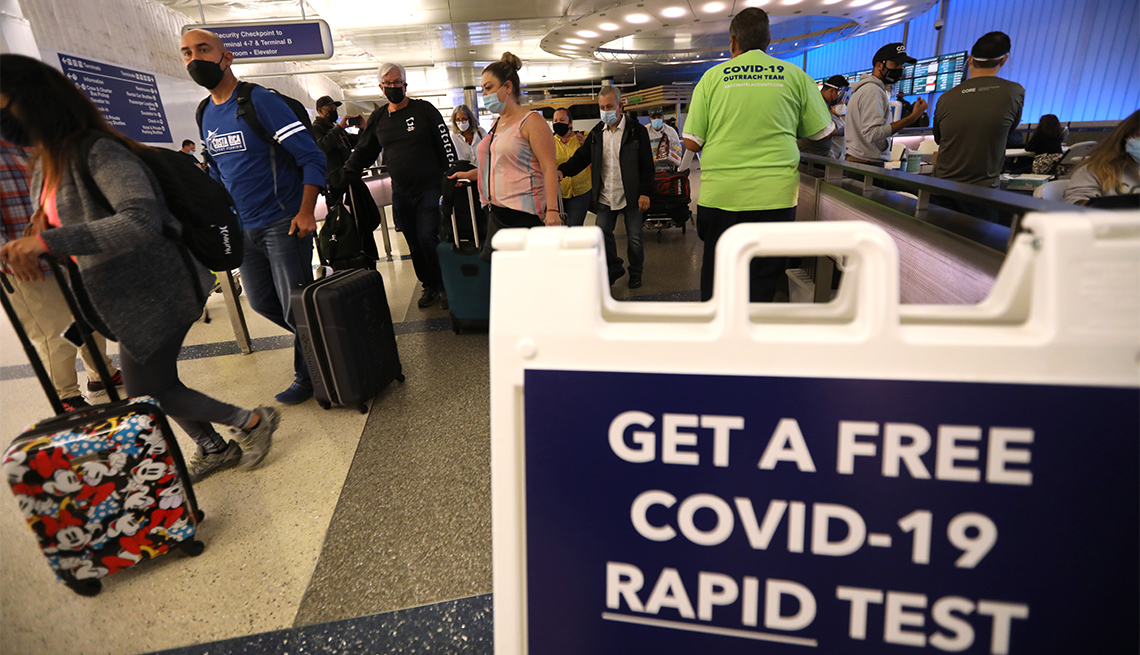
With the Centers for Disease Control and Prevention (CDC) requirement that all travelers coming to the United States provide official proof of a negative COVID-19 test taken within one day of their flight, travelers are understandably nervous — and a bit confused — about the whole process.

AARP Membership — $12 for your first year when you sign up for Automatic Renewal
Get instant access to members-only products and hundreds of discounts, a free second membership, and a subscription to AARP the Magazine.
Here are some answers to common questions about COVID-19 testing for travel.
What is the hotel testing process like? Many hotels have the return COVID-19 testing process set up seamlessly. For example, on my recent trip to Riviera Nayarit, Mexico, the Dreams Bahía Mita Surf & Spa Resort gave me COVID-19 testing forms upon check-in, with a testing appointment scheduled the day before my checkout ($35 per test, free for Club Level guests). At my appointment time, masked guests were waiting with their passports in a hallway outside a conference room converted into a testing center. Inside, a nurse from a contracted health provider administered Abbott’s rapid antigen test with a nose swab. I waited semi-nervously to receive the text message about 15 minutes later, which indicated that my test was negative. (If the test comes back positive, the resort offers free quarantine lodging for up to 14 days.) The hotel provided an official form certifying the results (I took a photo of the page for backup). At the Puerto Vallarta airport, I provided my test results form when I checked in and was good to return home.
What are the U.S. testing rules for international travel?
For reentry to the U.S., the CDC requires all air passengers age 2 years and older (including U.S. citizens and fully vaccinated passengers) to provide either documentation of a negative test taken within one day of their flight or documentation of recent recovery from COVID-19 , along with a letter from a health professional certifying that the person is cleared to travel. The test must be an authorized viral antigen or nucleic acid amplification test (NAAT).
Note that non-U.S. citizens need to show proof of vaccination prior to their flights to the U.S.
ARTICLE CONTINUES AFTER ADVERTISEMENT
How and where can you get tested before your return to the U.S.?
Many international hotels are now offering approved and sometimes free COVID-19 tests for their guests that are almost becoming a standard part of the checkout process (see details of one example in sidebar). Local clinics and some airports offer CDC- and airline-approved tests as well, although costs, availability and timing vary widely — from free to sometimes well over $100 for a test.
AARP® Dental Insurance Plan administered by Delta Dental Insurance Company
Dental insurance plans for members and their families
The CDC has started distributing free tests at three international airports around the U.S. (at Minneapolis-St. Paul, Miami and Chicago O'Hare), and has announced plans to expand the giveaways to other airports soon.
Many U.S. embassies, including in Britain, provide lists of approved local testing providers. Airlines also provide information about testing requirements and airport testing options.
Aside from finding an approved test to take (using local guidance from your airline, hotel and/or embassy), the most important step is to manage the timing of your test. If you plan to take a test at the airport, be sure to allow plenty of time for both the test and receiving the results, as wait times can be unpredictable — some travelers are facing long lines during the holiday travel season — and note that the test station may be far from your departure gate.
Can you test yourself?
While rapid off-the-shelf “at-home” (self-administered) antigen tests can provide an initial screening and peace of mind for travelers, they won’t meet the CDC requirements for reentry. ( See our story for more on home testing .)
For a home test to meet CDC reentry requirements, it must be a SARS-CoV-2 viral test (nucleic acid amplification test or antigen test) authorized by the FDA or the government of the country where you are. The test must also have an approved telehealth component that provides real-time supervision — so you’ll need a good Wi-Fi connection to consult with a medical professional from the test manufacturer who will confirm your identity, watch you administer the test and confirm the results.
And the test must be able to produce approved documentation to share with airline and customs officials. The CDC-approved travel reentry tests available online include Abbott’s BinaxNOW Ag Card Home Test ($70 for a two-pack), which will give you results within 15 minutes. The Qured Video Supervised Rapid Test ($45) is similar, with two tests included: The first is done under video supervision; the second, taken without supervision 24-36 hours later, is meant to confirm the result.
For frequent travelers, Cue Health has introduced its own testing device with a membership service. It's $474 for a device plus three tests, or a monthly service beginning at $50. To return to the U.S. after international travel, you'd need the Cue+ Complete membership, which is $90 per month.
What if you just want peace of mind that you don't have COVID-19 before traveling to visit family and friends within the U.S.?
In that case, you can use over-the-counter tests from drugstores. But there have been severe shortages for these quick-and-easy tests, which offer results in less than 15 minutes, as omicron’s spread has led to a surge in demand .
While many countries have over-the-counter tests available for purchase once you get there, it might be a good idea to bring a few test kits with you (if you can find any). They can provide peace of mind if you are exhibiting symptoms, and save you time searching pharmacies for test kits (or a potentially expensive trip to a clinic at your destination). Again, these over-the-counter tests will not be enough to gain approval for return to the U.S., unless they have the certified telehealth component included.
What happens if you fail your return COVID-19 test?
Regulations for travelers receiving a positive test vary widely by country. Even if you're asymptomatic, you will typically be required to quarantine — either at a government-mandated location or one of your choosing — for at least a week, with a negative test required to exit quarantine. A few countries take care of the cost of quarantine food and lodging, many others do not, and costs can quickly accumulate.
This is the time when you should consider purchasing travel insurance — and choose COVID-19-specific options on your policy. Read the fine print carefully. Given the recent rapid spread of the omicron variant, it certainly would be wise to look into relevant travel insurance options for any international trip.
A few more tips
· Stay on top of CDC guidance. Before traveling, be sure to confirm the latest requirements on the CDC website , and with your airline. You don’t want to be denied access to your return flight with an unapproved test or missing paperwork.
· Check your destination’s testing requirements. Other countries’ testing and vaccination rules vary widely, but many require visitors to provide proof of a negative COVID-19 test within three days (some within 24 hours) of travel with approved PCR or antigen tests.
Editor's note: This article was originally published on December 21, 2021. It's been updated to reflect new information.
Bill Fink is an award-winning travel writer covering global adventures for BBC , Lonely Planet , Thrillist and many other outlets. Follow him @finktravels.
Discover AARP Members Only Access
Already a Member? Login
More on travel
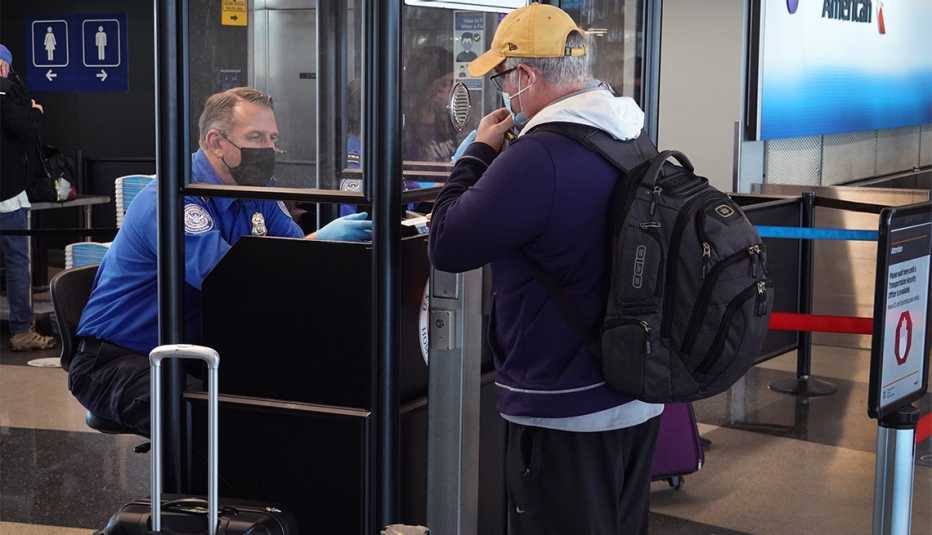
The Latest TSA Security Procedures During the COVID-19 Pandemic
You’ll need a mask, and patience, when passing through airport screenings this winter
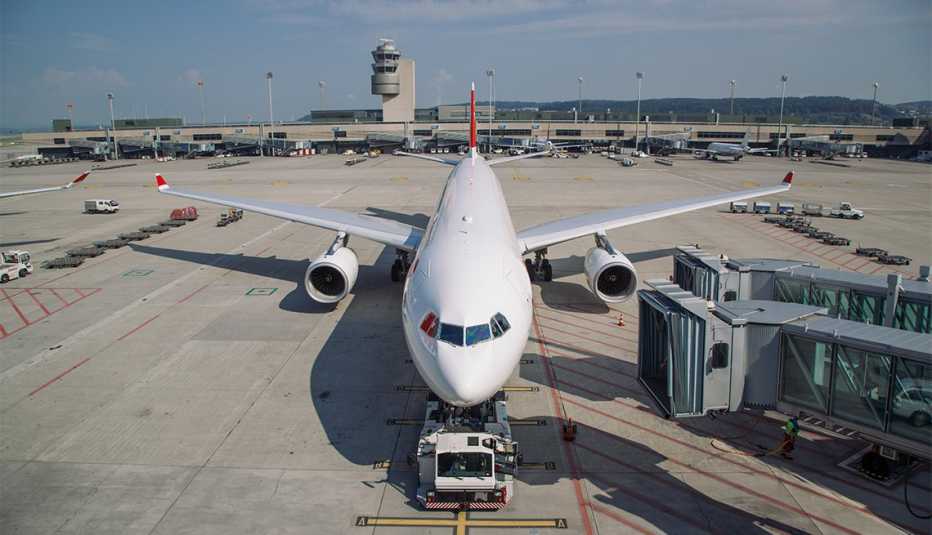
Current Airline Policies During COVID-19 Pandemic
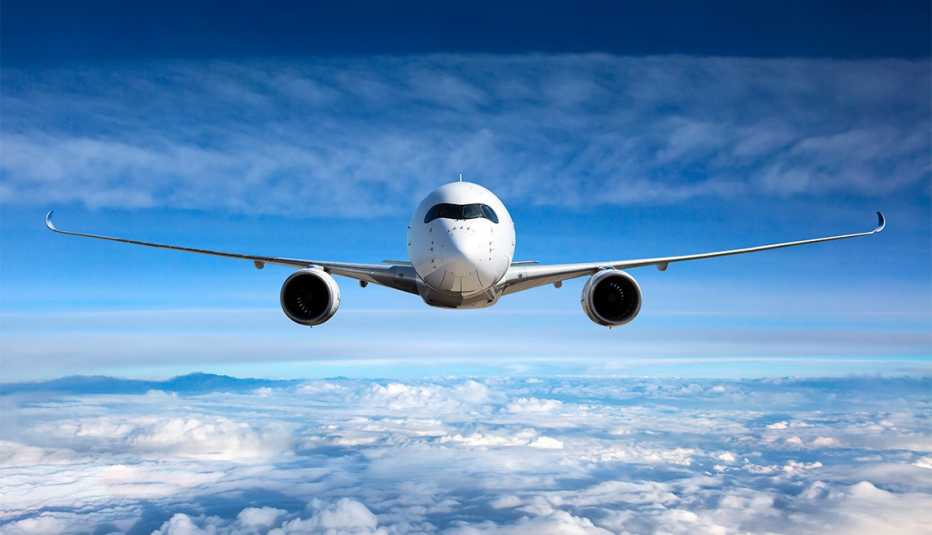
Penalties Grow for Unruly Airline Passengers
Travelers and law enforcement contend with more bad behavior in the skies
Or Call: 1-800-675-4318
Enter a valid from location
Enter a valid to location
Enter a valid departing date
Enter a valid returning date
Age of children:
Child under 2 must either sit in laps or in seats:
+ Add Another Flight
Enter a valid destination location
Enter a valid checking in date
Enter a valid checking out date
Occupants of Room
Occupants of Room 1:
Occupants of Room 2:
Occupants of Room 3:
Occupants of Room 4:
Occupants of Room 5:
Occupants of Room 6:
Occupants of Room 7:
Occupants of Room 8:
Enter a valid date
You didn't specify child's age
There are children in room 1 without an adult
You didn't specify child's age for room 1
There are children in room 2 without an adult
You didn't specify child's age in room 2
There are children in room 3 without an adult
You didn't specify child's age in room 3
There are children in room 4 without an adult
You didn't specify child's age in room 4
There are children in room 5 without an adult
You didn't specify child's age in room 5
You have more than 6 people total
Please select a trip duration less than 28 days
There must be at least 1 traveler (age 12+) for each infant in a lap
Enter a valid From location
Enter a valid start date
Enter a valid drop location
Enter a valid drop off date
Select a valid to location
Select a month
Enter a valid going to location
Enter a valid from date
Enter a valid to date
AARP VALUE &
MEMBER BENEFITS

Denny's
15% off dine-in and pickup orders

AARP Travel Center Powered by Expedia: Vacation Packages
$50 gift card of your choice when booking any flight package

$20 off a Walmart+ annual membership

AARP® Staying Sharp®
Activities, recipes, challenges and more with full access to AARP Staying Sharp®
SAVE MONEY WITH THESE LIMITED-TIME OFFERS
U.S. News takes an unbiased approach to our recommendations. When you use our links to buy products, we may earn a commission but that in no way affects our editorial independence.
The 5 Best COVID-19 Travel Insurance Options

Travelex Insurance Services »

Allianz Travel Insurance »

World Nomads Travel Insurance »

Generali Global Assistance »

IMG Travel Insurance »
Why Trust Us
U.S. News evaluates ratings, data and scores of more than 50 travel insurance companies from comparison websites like TravelInsurance.com, Squaremouth and InsureMyTrip, plus renowned credit rating agency AM Best, in addition to reviews and recommendations from top travel industry sources and consumers to determine the Best COVID Travel Insurance Options.
Table of Contents
- Travelex Insurance Services
- Allianz Travel Insurance
- World Nomads Travel Insurance
Even though COVID-19 is no longer considered a global emergency, concerns around illness-related costs remain for many travelers. If you're looking for travel insurance that covers COVID – as well as other potential disruptions like flight delays and lost luggage – these are your best options.
- Travelex Insurance Services: Best Optional Coverage Add-ons
- Allianz Travel Insurance: Best for Multitrip and Annual Plans
- World Nomads Travel Insurance: Best for Active Travelers
- Generali Global Assistance: Best for Comprehensive Travel Insurance
- IMG Travel Insurance: Best for Travel Medical Insurance
Plans include coverage for COVID-19
Optional CFAR coverage is available with Travel Select plan
Some coverages require an upgrade, including rental car collision, accidental death and dismemberment, and more
Not all add-ons are available with every plan
SEE FULL REVIEW »
Allianz offers some travel insurance plans that come with an epidemic coverage endorsement
Single-trip, multitrip and annual plans available
COVID-19 benefits don't apply to every plan
Low coverage limits with some plans (e.g., only $10,000 in emergency medical coverage with OneTrip Basic plan)
24-hour travel assistance services included
More than 200 sports and activities covered in every plan
Low trip cancellation benefits ($2,500 maximum) with Standard plan
No CFAR option is offered
Free 10-day trial period
Some coverage limits may be insufficient
Rental car damage coverage only included in top-tier Premium plan
Offers travel medical insurance, international travel health insurance and general travel insurance plans
Some plans include robust coverage for testing and quarantine due to COVID-19
Not all plans from IMG offer coverage for COVID-19
Cancel for any reason coverage not available with every plan
Frequently Asked Questions
When comparing COVID-19 travel insurance options, you'll want to make sure you fully understand the coverages included in each plan. For example, you should know the policy inclusions and limits for COVID-related claims, including coverage for testing, treatments, trip cancellation or COVID-related interruptions that can occur. Meanwhile, you should understand how your coverage will work if you contract some other illness while away from home.
Also ensure your travel insurance coverage will kick in for other mishaps that occur, and that limits are sufficient for your needs. If you're planning a trip to a remote area in a country like Costa Rica or Peru , you'll want to have emergency evacuation and transportation coverage with generous limits that can pay for emergency transportation to a hospital if you need treatment.
You can also invest in a travel insurance policy that offers cancel for any reason coverage. This type of travel insurance plan lets you cancel and get a percentage of your prepaid travel expenses back for any reason, even if you just decide you're better off staying home.
It depends on your private health insurance provider and/or travel insurance policy. As of May 11, 2023, private health insurers are no longer required to cover the cost of COVID-19 testing. Out-of-pocket costs for COVID-19 test kits at local drugstores and on Amazon are relatively affordable, however.
As you search for plans that will provide sufficient coverage for your next trip, you'll find travel insurance that covers COVID-19 quarantine both inside and outside the United States. However, you'll typically need to have your condition certified by a physician in order for this coverage to apply. Also make sure your travel insurance plan includes coverage for travel claims related to COVID-19 in the first place.
Many travel insurance plans do cover trip cancellation as a result of COVID-19, although the terms vary widely. You typically need to be certified by a physician in order to prove your condition. Disinclination to travel because of COVID-19 – such as fear of exposure to illness – will generally not be covered. This means you will actually have to test positive for coronavirus for benefits to apply; simply not wanting to travel is not a sufficient reason to make a claim.
If you want more flexibility in your COVID-19 travel insurance, ensuring you have a cancel for any reason policy may be your best bet, but be sure to check with your chosen travel insurance provider to assess your options.
Why Trust U.S. News Travel
Holly Johnson is an award-winning writer who has been covering travel insurance and travel for more than a decade. She has researched the best travel insurance options for her own trips to more than 50 countries around the world and has experience navigating the claims and reimbursement process. Over the years, Johnson has successfully filed several travel insurance claims for trip delays and trip cancellations. Johnson also works alongside her travel agent partner, Greg, who has been licensed to sell travel insurance in 50 states.
You might also be interested in:

5 Best Travel Insurance Plans for Seniors (Medical & More)
Holly Johnson
Discover coverage options for peace of mind while traveling.

Does My Health Insurance Cover International Travel?
Private health insurance typically doesn't cover international travel expenses.

8 Cheapest Travel Insurance Companies Worth the Cost
U.S. News rates the cheapest travel insurance options, considering pricing data, expert recommendations and consumer reviews.

Is Travel Insurance Worth It? Yes, in These 3 Scenarios
These are the scenarios when travel insurance makes most sense.
The best travel insurance policies and providers

It's easy to dismiss the value of travel insurance until you need it.
Many travelers have strong opinions about whether you should buy travel insurance . However, the purpose of this post isn't to determine whether it's worth investing in. Instead, it compares some of the top travel insurance providers and policies so you can determine which travel insurance option is best for you.
Of course, as the coronavirus remains an ongoing concern, it's important to understand whether travel insurance covers pandemics. Some policies will cover you if you're diagnosed with COVID-19 and have proof of illness from a doctor. Others will take coverage a step further, covering additional types of pandemic-related expenses and cancellations.
Know, though, that every policy will have exclusions and restrictions that may limit coverage. For example, fear of travel is generally not a covered reason for invoking trip cancellation or interruption coverage, while specific stipulations may apply to elevated travel warnings from the Centers for Disease Control and Prevention.
Interested in travel insurance? Visit InsureMyTrip.com to shop for plans that may fit your travel needs.
So, before buying a specific policy, you must understand the full terms and any special notices the insurer has about COVID-19. You may even want to buy the optional cancel for any reason add-on that's available for some comprehensive policies. While you'll pay more for that protection, it allows you to cancel your trip for any reason and still get some of your costs back. Note that this benefit is time-sensitive and has other eligibility requirements, so not all travelers will qualify.
In this guide, we'll review several policies from top travel insurance providers so you have a better understanding of your options before picking the policy and provider that best address your wants and needs.
The best travel insurance providers
To put together this list of the best travel insurance providers, a number of details were considered: favorable ratings from TPG Lounge members, the availability of details about policies and the claims process online, positive online ratings and the ability to purchase policies in most U.S. states. You can also search for options from these (and other) providers through an insurance comparison site like InsureMyTrip .
When comparing insurance providers, I priced out a single-trip policy for each provider for a $2,000, one-week vacation to Istanbul . I used my actual age and state of residence when obtaining quotes. As a result, you may see a different price — or even additional policies due to regulations for travel insurance varying from state to state — when getting a quote.
AIG Travel Guard
AIG Travel Guard receives many positive reviews from readers in the TPG Lounge who have filed claims with the company. AIG offers three plans online, which you can compare side by side, and the ability to examine sample policies. Here are three plans for my sample trip to Turkey.
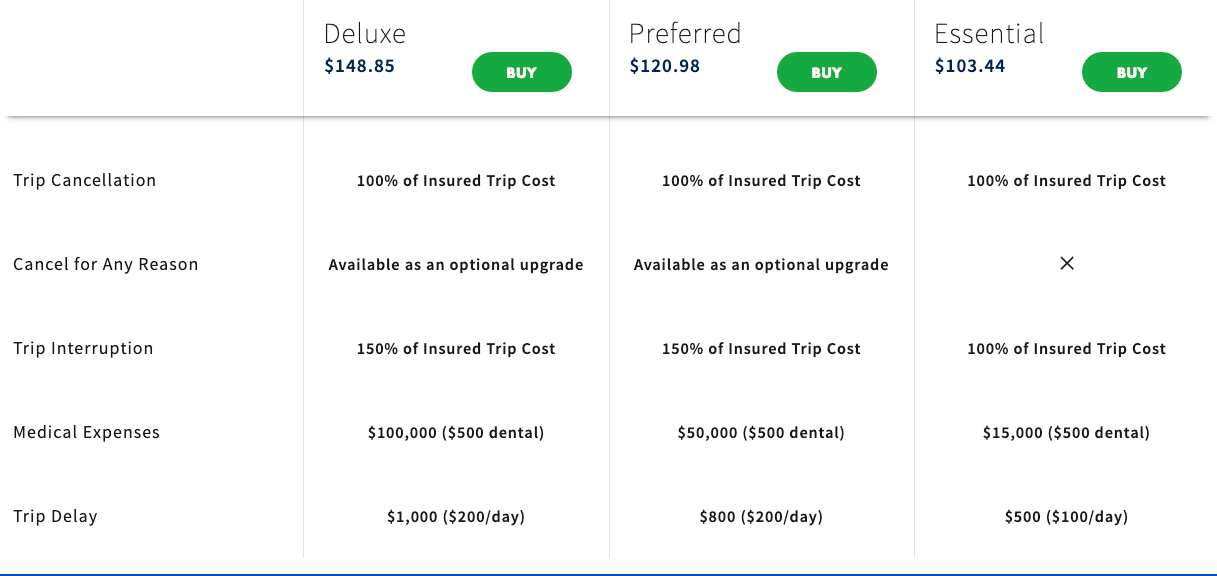
AIG Travel Guard also offers an annual travel plan. This plan is priced at $259 per year for one Florida resident.
Additionally, AIG Travel Guard offers several other policies, including a single-trip policy without trip cancellation protection . See AIG Travel Guard's COVID-19 notification and COVID-19 advisory for current details regarding COVID-19 coverage.
Preexisting conditions
Typically, AIG Travel Guard wouldn't cover you for any loss or expense due to a preexisting medical condition that existed within 180 days of the coverage effective date. However, AIG Travel Guard may waive the preexisting medical condition exclusion on some plans if you meet the following conditions:
- You purchase the plan within 15 days of your initial trip payment.
- The amount of coverage you purchase equals all trip costs at the time of purchase. You must update your coverage to insure the costs of any subsequent arrangements that you add to your trip within 15 days of paying the travel supplier for these additional arrangements.
- You must be medically able to travel when you purchase your plan.
Standout features
- The Deluxe and Preferred plans allow you to purchase an upgrade that lets you cancel your trip for any reason. However, reimbursement under this coverage will not exceed 50% or 75% of your covered trip cost.
- You can include one child (age 17 and younger) with each paying adult for no additional cost on most single-trip plans.
- Other optional upgrades, including an adventure sports bundle, a baggage bundle, an inconvenience bundle, a pet bundle, a security bundle and a wedding bundle, are available on some policies. So, an AIG Travel Guard plan may be a good choice if you know you want extra coverage in specific areas.
Purchase your policy here: AIG Travel Guard .
Allianz Travel Insurance
Allianz is one of the most highly regarded providers in the TPG Lounge, and many readers found the claim process reasonable. Allianz offers many plans, including the following single-trip plans for my sample trip to Turkey.

If you travel frequently, it may make sense to purchase an annual multi-trip policy. For this plan, all of the maximum coverage amounts in the table below are per trip (except for the trip cancellation and trip interruption amounts, which are an aggregate limit per policy). Trips typically must last no more than 45 days, although some plans may cover trips of up to 90 days.
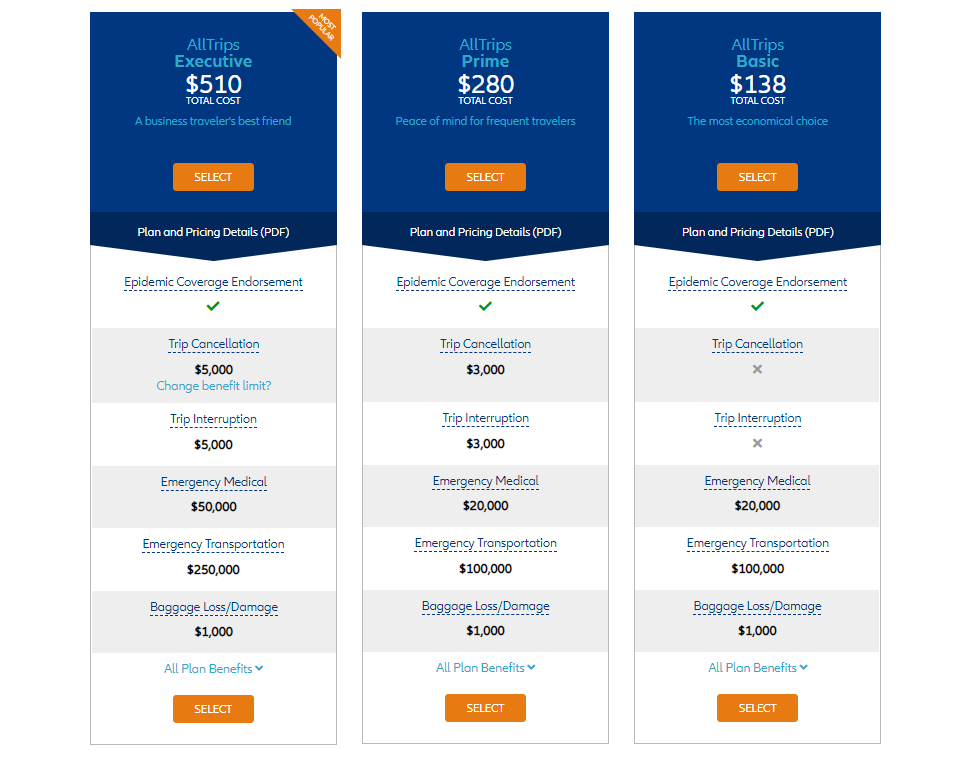
See Allianz's coverage alert for current information on COVID-19 coverage.
Most Allianz travel insurance plans may cover preexisting medical conditions if you meet particular requirements. For the OneTrip Premier, Prime and Basic plans, the requirements are as follows:
- You purchased the policy within 14 days of the date of the first trip payment or deposit.
- You were a U.S. resident when you purchased the policy.
- You were medically able to travel when you purchased the policy.
- On the policy purchase date, you insured the total, nonrefundable cost of your trip (including arrangements that will become nonrefundable or subject to cancellation penalties before your departure date). If you incur additional nonrefundable trip expenses after purchasing this policy, you must insure them within 14 days of their purchase.
- Allianz offers reasonably priced annual policies for independent travelers and families who take multiple trips lasting up to 45 days (or 90 days for select plans) per year.
- Some Allianz plans provide the option of receiving a flat reimbursement amount without receipts for trip delay and baggage delay claims. Of course, you can also submit receipts to get up to the maximum refund.
- For emergency transportation coverage, you or someone on your behalf must contact Allianz, and Allianz must then make all transportation arrangements in advance. However, most Allianz policies provide an option if you cannot contact the company: Allianz will pay up to what it would have paid if it had made the arrangements.
Purchase your policy here: Allianz Travel Insurance .
American Express Travel Insurance
American Express Travel Insurance offers four different package plans and a build-your-own coverage option. You don't have to be an American Express cardholder to purchase this insurance. Here are the four package options for my sample weeklong trip to Turkey. Unlike some other providers, Amex won't ask for your travel destination on the initial quote (but will when you purchase the plan).

Amex's build-your-own coverage plan is unique because you can purchase just the coverage you need. For most types of protection, you can even select the coverage amount that works best for you.
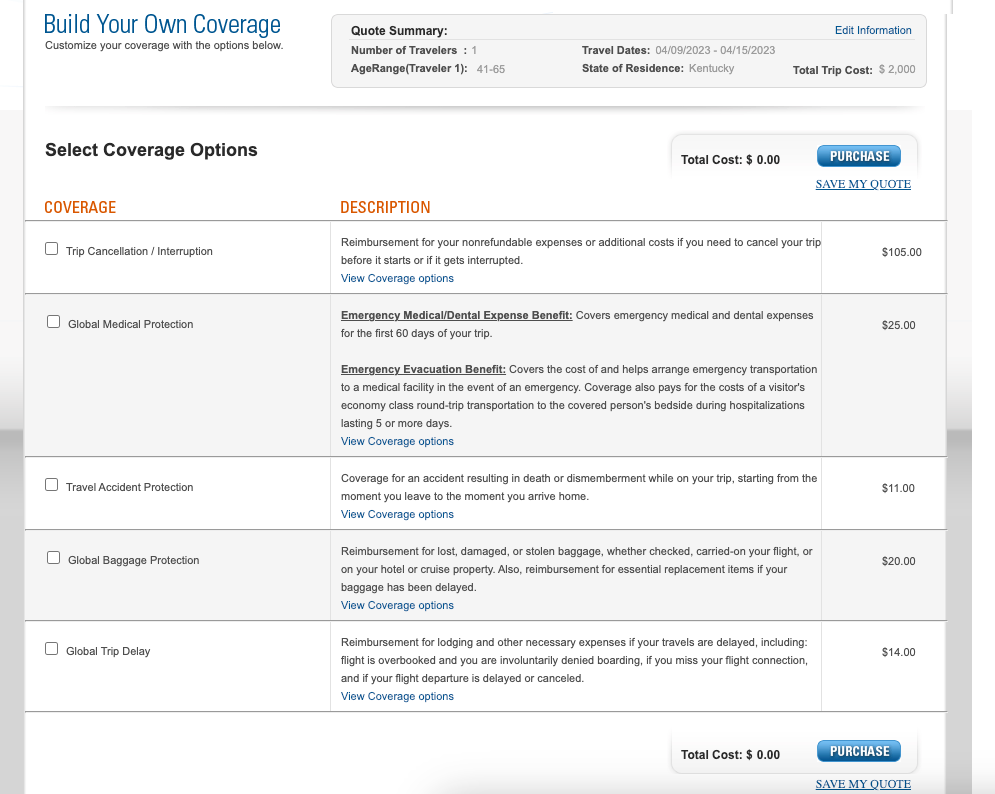
The prices for the packages and the build-your-own plan don't increase for longer trips — as long as the trip cost remains constant. However, the emergency medical and dental benefit is only available for your first 60 days of travel.
Typically, Amex won't cover any loss you incur because of a preexisting medical condition that existed within 90 days of the coverage effective date. However, Amex may waive its preexisting-condition exclusion if you meet both of the following requirements:
- You must be medically able to travel at the time you pay the policy premium.
- You pay the policy premium within 14 days of making the first covered trip deposit.
- Amex's build-your-own coverage option allows you to only purchase — and pay for — the coverage you need.
- Coverage on long trips doesn't cost more than coverage for short trips, making this policy ideal for extended getaways. However, the emergency medical and dental benefit only covers your first 60 days of travel.
- American Express Travel Insurance can protect travel expenses you purchase with Amex Membership Rewards points in the Pay with Points program (as well as travel expenses bought with cash, debit or credit). However, travel expenses bought with other types of points and miles aren't covered.
Purchase your policy here: American Express Travel Insurance .
GeoBlue is different from most other providers described in this piece because it only provides medical coverage while you're traveling internationally and does not offer benefits to protect the cost of your trip. There are many different policies. Some require you to have primary health insurance in the U.S. (although it doesn't need to be provided by Blue Cross Blue Shield), but all of them only offer coverage while traveling outside the U.S.
Two single-trip plans are available if you're traveling for six months or less. The Voyager Choice policy provides coverage (including medical services and medical evacuation for a sudden recurrence of a preexisting condition) for trips outside the U.S. to travelers who are 95 or younger and already have a U.S. health insurance policy.
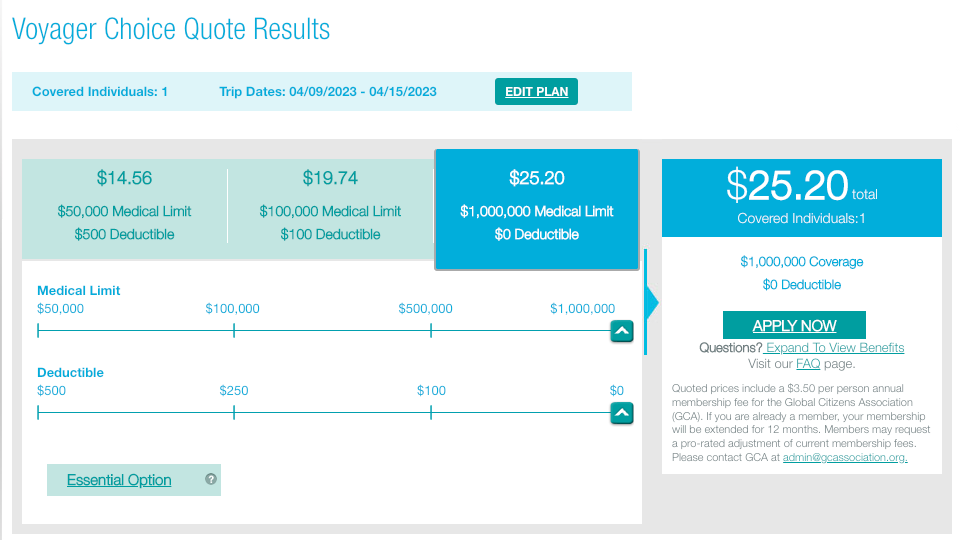
The Voyager Essential policy provides coverage (including medical evacuation for a sudden recurrence of a preexisting condition) for trips outside the U.S. to travelers who are 95 or younger, regardless of whether they have primary health insurance.
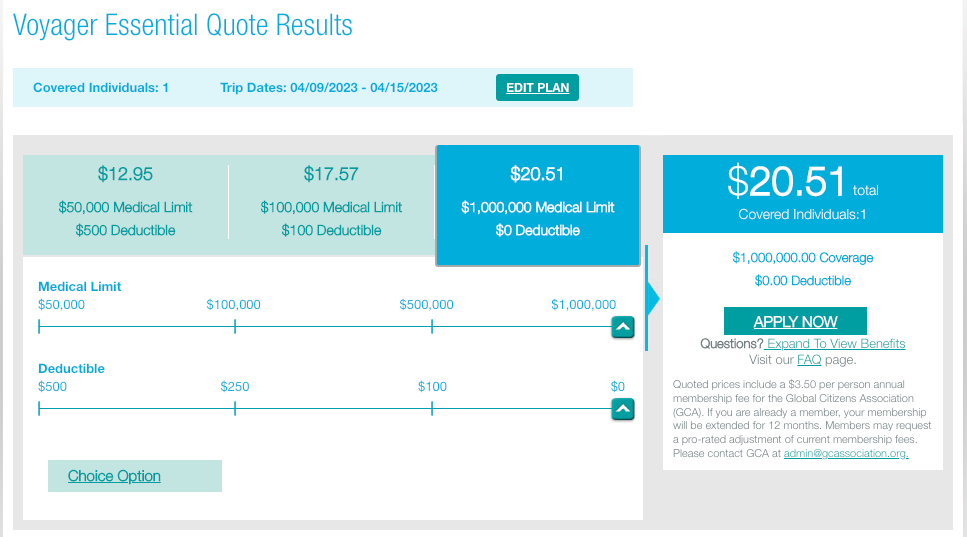
In addition to these options, two multi-trip plans cover trips of up to 70 days each for one year. Both policies provide coverage (including medical services and medical evacuation for preexisting conditions) to travelers with primary health insurance.
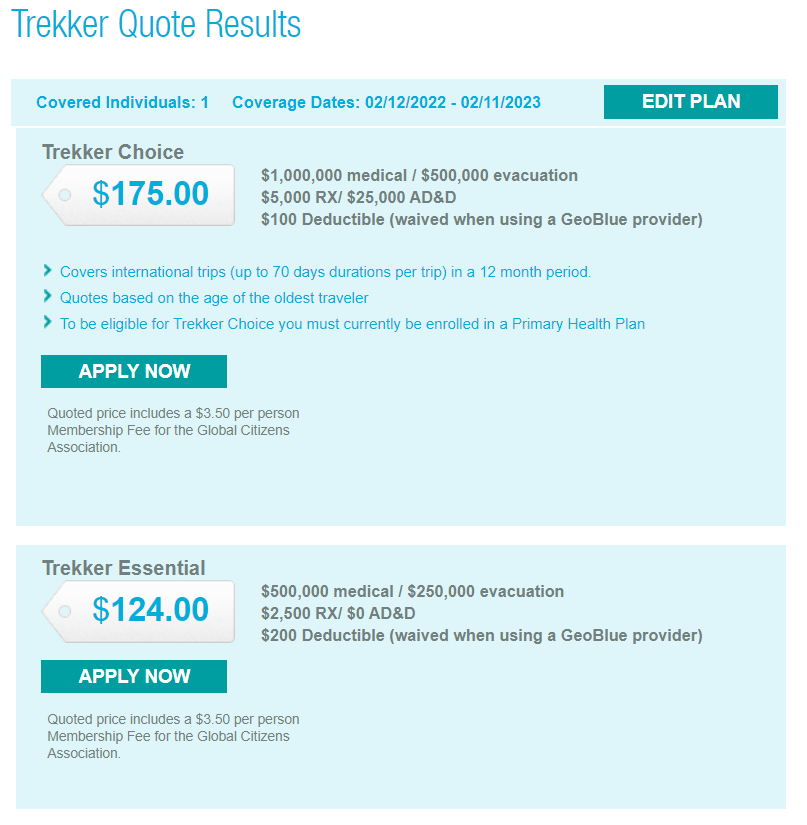
Be sure to check out GeoBlue's COVID-19 notices before buying a plan.
Most GeoBlue policies explicitly cover sudden recurrences of preexisting conditions for medical services and medical evacuation.
- GeoBlue can be an excellent option if you're mainly concerned about the medical side of travel insurance.
- GeoBlue provides single-trip, multi-trip and long-term medical travel insurance policies for many different types of travel.
Purchase your policy here: GeoBlue .
IMG offers various travel medical insurance policies for travelers, as well as comprehensive travel insurance policies. For a single trip of 90 days or less, there are five policy types available for vacation or holiday travelers. Although you must enter your gender, males and females received the same quote for my one-week search.
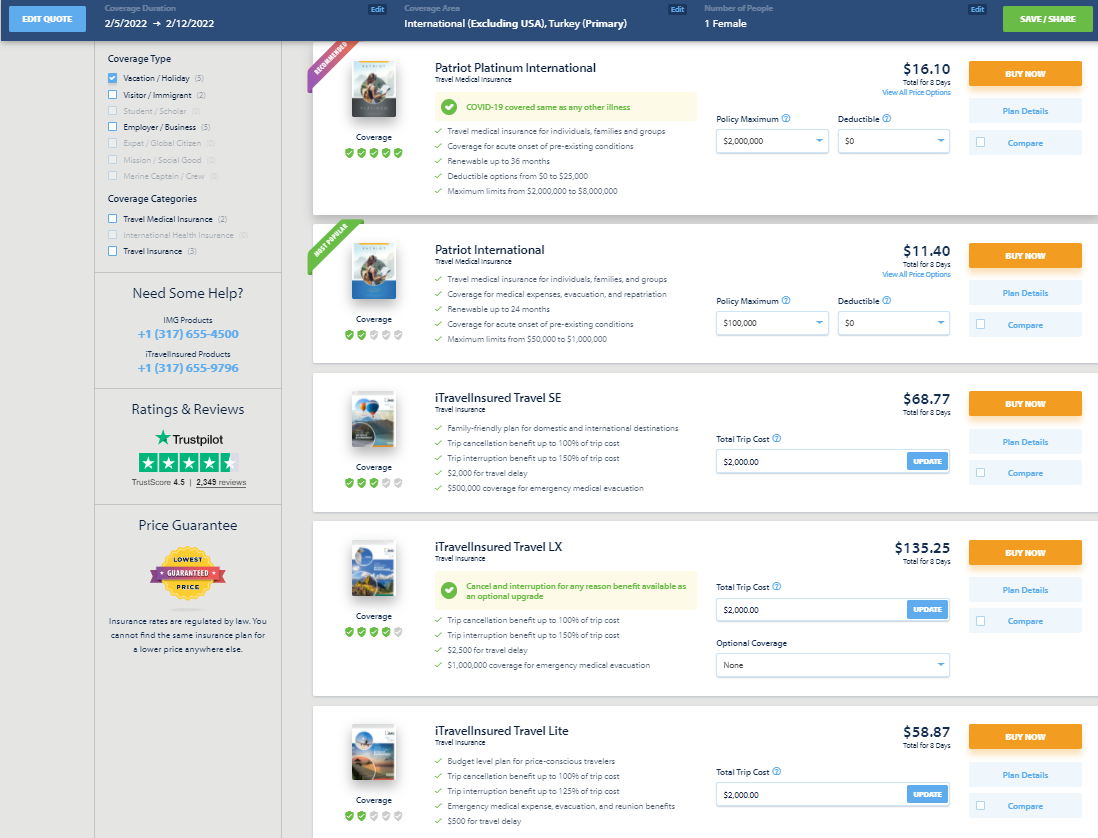
You can purchase an annual multi-trip travel medical insurance plan. Some only cover trips lasting up to 30 or 45 days, but others provide coverage for longer trips.
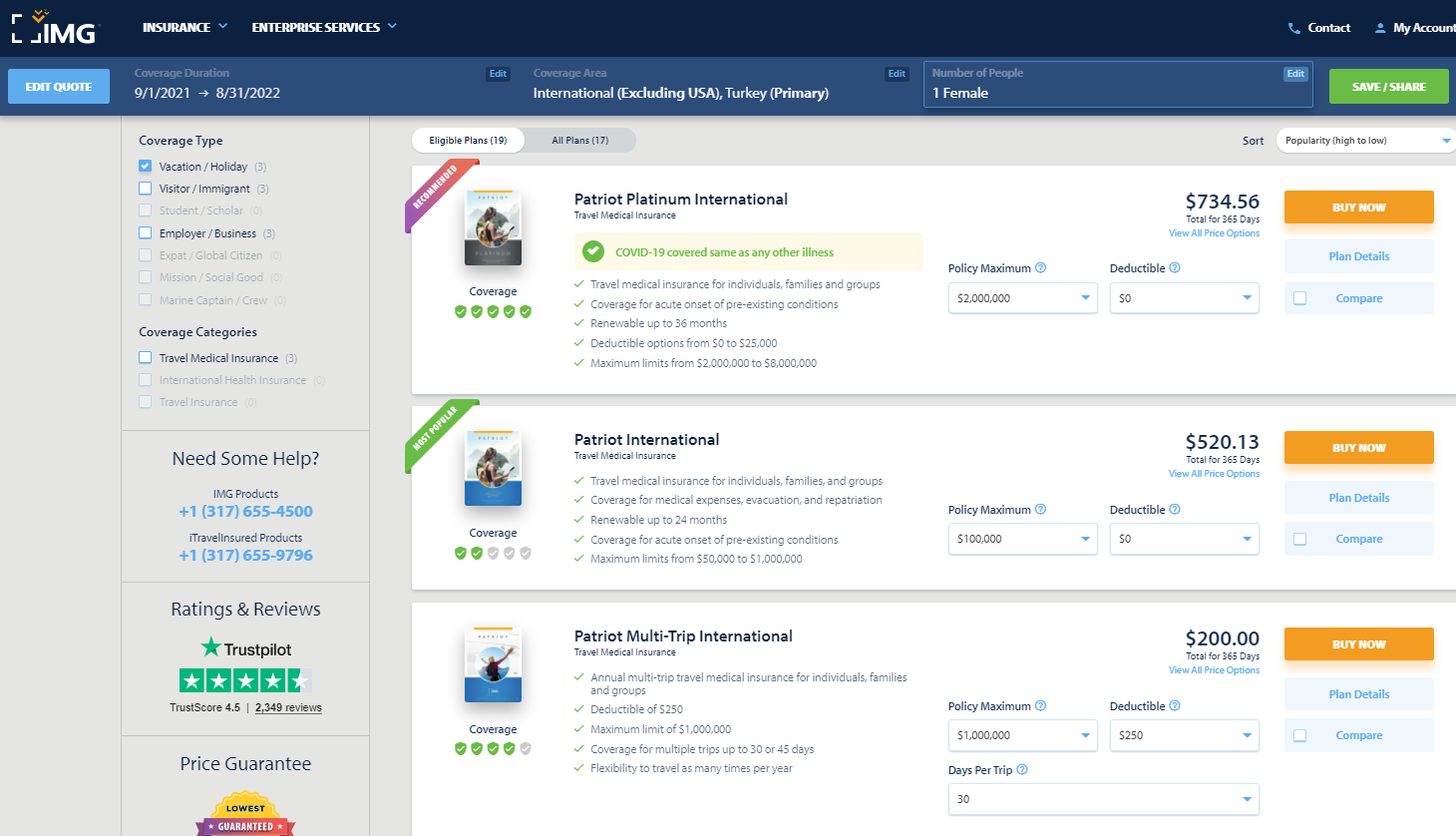
See IMG's page on COVID-19 for additional policy information as it relates to coronavirus-related claims.
Most plans may cover preexisting conditions under set parameters or up to specific amounts. For example, the iTravelInsured Travel LX travel insurance plan shown above may cover preexisting conditions if you purchase the insurance within 24 hours of making the final payment for your trip.
For the travel medical insurance plans shown above, preexisting conditions are covered for travelers younger than 70. However, coverage is capped based on your age and whether you have a primary health insurance policy.
- Some annual multi-trip plans are modestly priced.
- iTravelInsured Travel LX may offer optional cancel for any reason and interruption for any reason coverage, if eligible.
Purchase your policy here: IMG .
Travelex Insurance
Travelex offers three single-trip plans: Travel Basic, Travel Select and Travel America. However, only the Travel Basic and Travel Select plans would be applicable for my trip to Turkey.
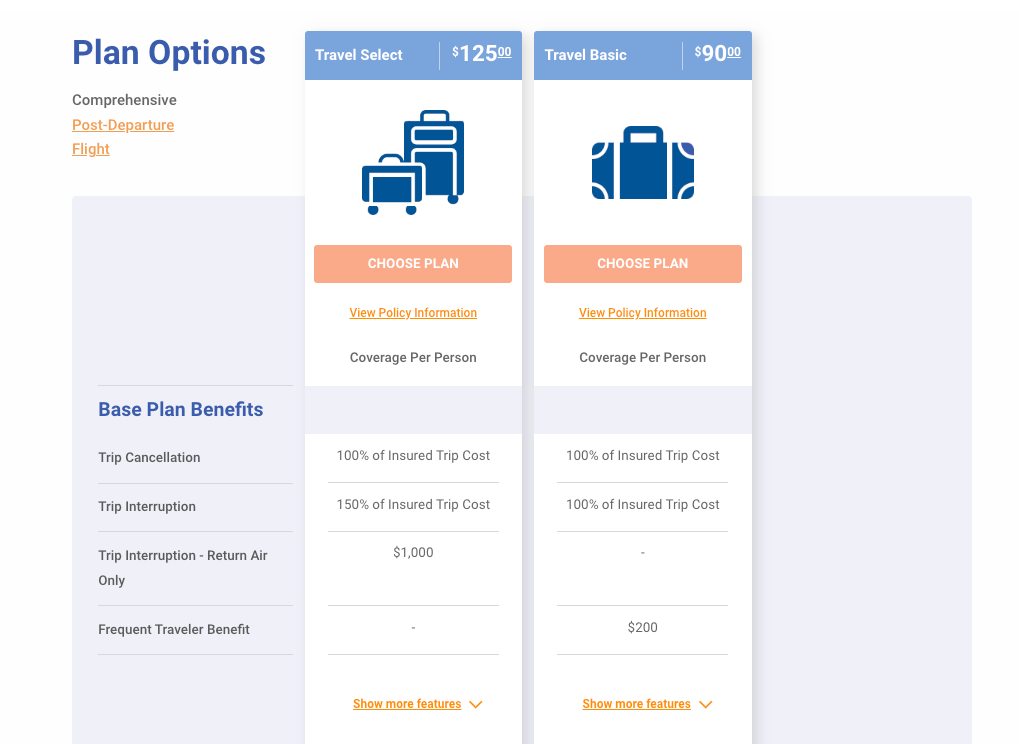
See Travelex's COVID-19 coverage statement for coronavirus-specific information.
Typically, Travelex won't cover losses incurred because of a preexisting medical condition that existed within 60 days of the coverage effective date. However, the Travel Select plan may offer a preexisting condition exclusion waiver. To be eligible for this waiver, the insured traveler must meet all the following conditions:
- You purchase the plan within 15 days of the initial trip payment.
- The amount of coverage purchased equals all prepaid, nonrefundable payments or deposits applicable to the trip at the time of purchase. Additionally, you must insure the costs of any subsequent arrangements added to the same trip within 15 days of payment or deposit.
- All insured individuals are medically able to travel when they pay the plan cost.
- The trip cost does not exceed the maximum trip cost limit under trip cancellation as shown in the schedule per person (only applicable to trip cancellation, interruption and delay).
- Travelex's Travel Select policy can cover trips lasting up to 364 days, which is longer than many single-trip policies.
- Neither Travelex policy requires receipts for trip and baggage delay expenses less than $25.
- For emergency evacuation coverage, you or someone on your behalf must contact Travelex and have Travelex make all transportation arrangements in advance. However, both Travelex policies provide an option if you cannot contact Travelex: Travelex will pay up to what it would have paid if it had made the arrangements.
Purchase your policy here: Travelex Insurance .
Seven Corners
Seven Corners offers a wide variety of policies. Here are the policies that are most applicable to travelers on a single international trip.
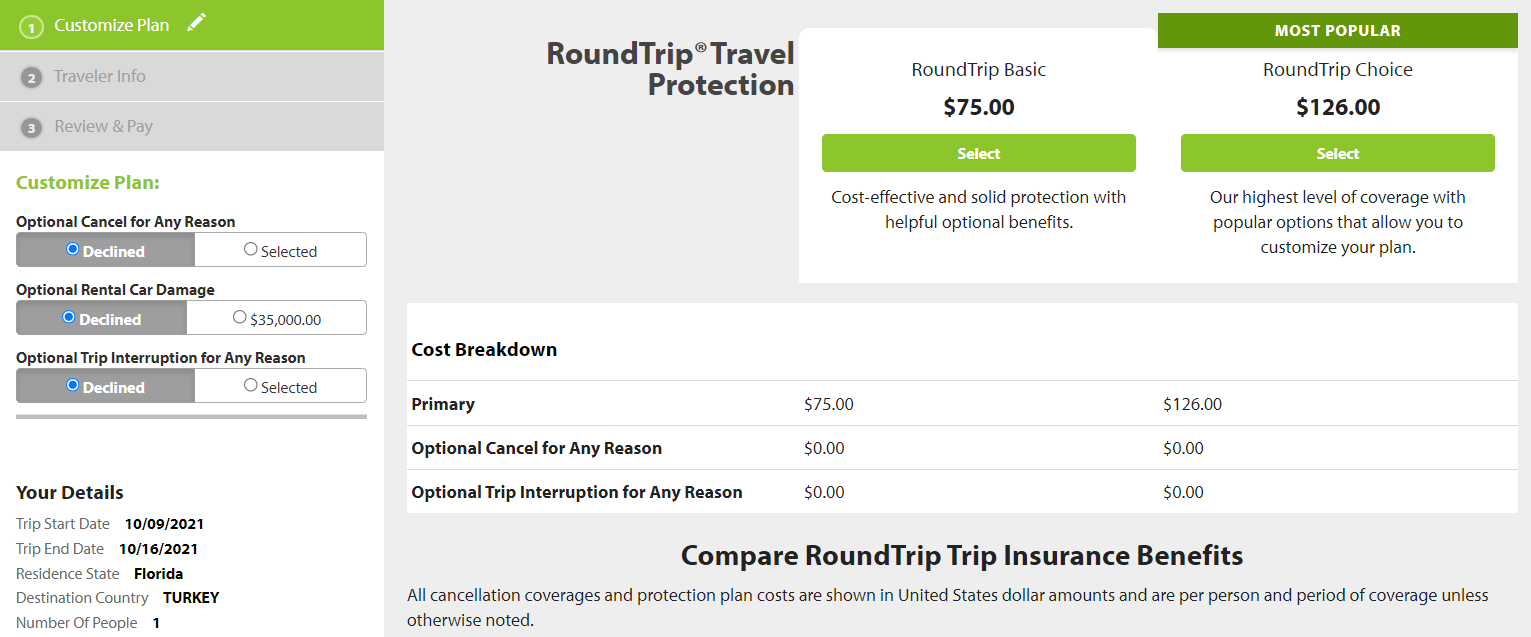
Seven Corners also offers many other types of travel insurance, including an annual multi-trip plan. You can choose coverage for trips of up to 30, 45 or 60 days when purchasing an annual multi-trip plan.
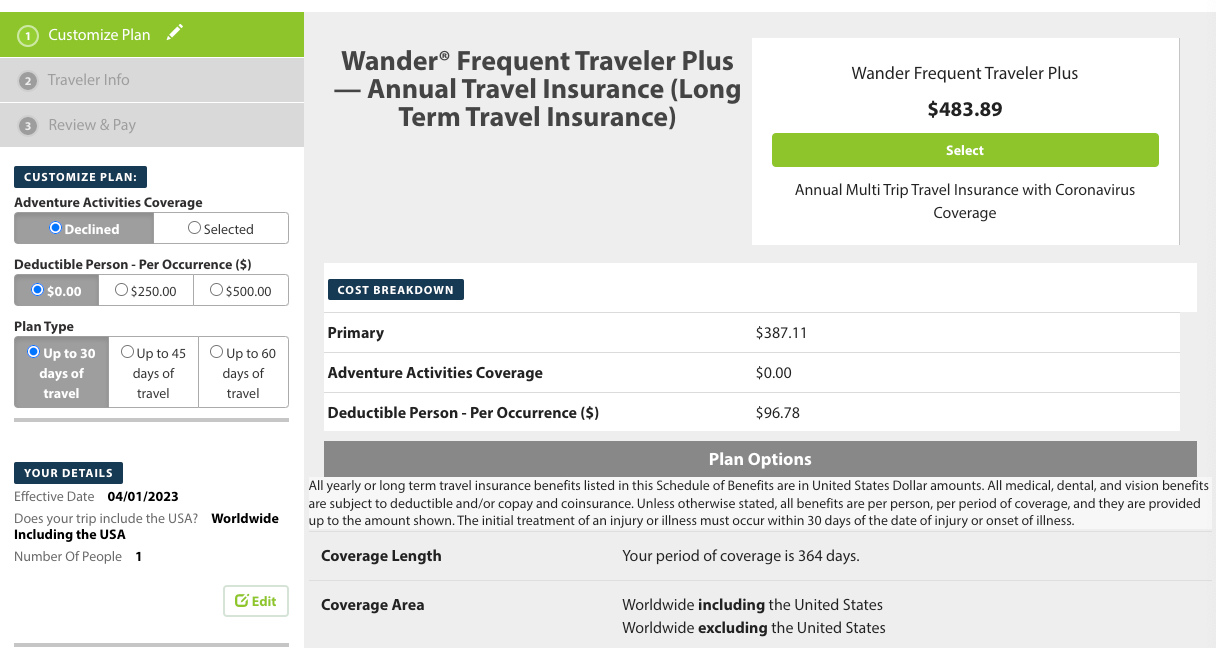
See Seven Corner's page on COVID-19 for additional policy information as it relates to coronavirus-related claims.
Typically, Seven Corners won't cover losses incurred because of a preexisting medical condition. However, the RoundTrip Choice plan offers a preexisting condition exclusion waiver. To be eligible for this waiver, you must meet all of the following conditions:
- You buy this plan within 20 days of making your initial trip payment or deposit.
- You or your travel companion are medically able and not disabled from travel when you pay for this plan or upgrade your plan.
- You update the coverage to include the additional cost of subsequent travel arrangements within 15 days of paying your travel supplier for them.
- Seven Corners offers the ability to purchase optional sports and golf equipment coverage. If purchased, this extra insurance will reimburse you for the cost of renting sports or golf equipment if yours is lost, stolen, damaged or delayed by a common carrier for six or more hours. However, Seven Corners must authorize the expenses in advance.
- You can add cancel for any reason coverage or trip interruption for any reason coverage to RoundTrip plans. Although some other providers offer cancel for any reason coverage, trip interruption for any reason coverage is less common.
- Seven Corners' RoundTrip Choice policy offers a political or security evacuation benefit that will transport you to the nearest safe place or your residence under specific conditions. You can also add optional event ticket registration fee protection to the RoundTrip Choice policy.
Purchase your policy here: Seven Corners .
World Nomads
World Nomads is popular with younger, active travelers because of its flexibility and adventure-activities coverage on the Explorer plan. Unlike many policies offered by other providers, you don't need to estimate prepaid costs when purchasing the insurance to have access to trip interruption and cancellation insurance.
World Nomads offers two single-trip plans.
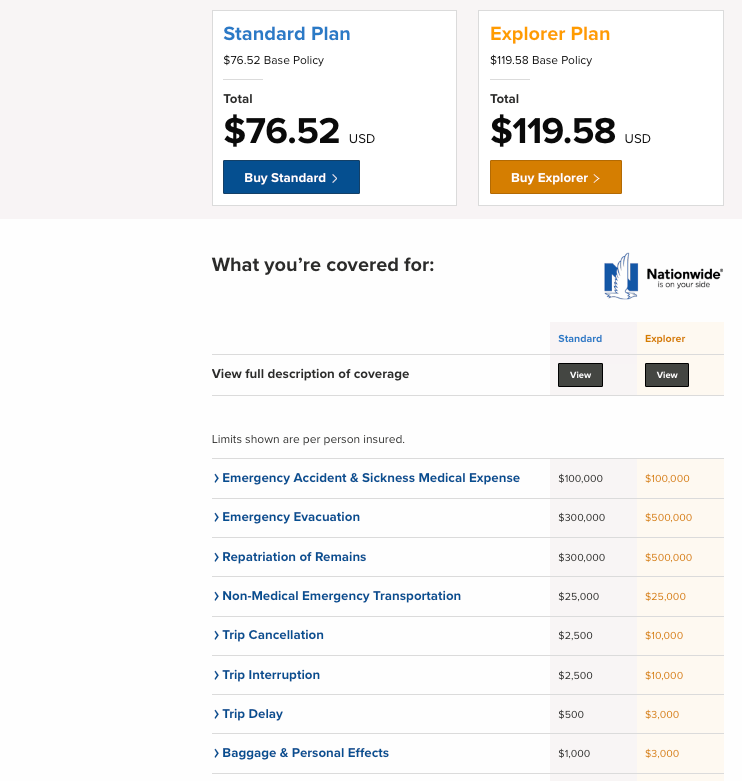
World Nomads has a page dedicated to coronavirus coverage , so be sure to view it before buying a policy.
World Nomads won't cover losses incurred because of a preexisting medical condition (except emergency evacuation and repatriation of remains) that existed within 90 days of the coverage effective date. Unlike many other providers, World Nomads doesn't offer a waiver.
- World Nomads' policies cover more adventure sports than most providers, so activities such as bungee jumping are included. The Explorer policy covers almost any adventure sport, including skydiving, stunt flying and caving. So, if you partake in adventure sports while traveling, the Explorer policy may be a good fit.
- World Nomads' policies provide nonmedical evacuation coverage for transportation expenses if there is civil or political unrest in the country you are visiting. The coverage may also transport you home if there is an eligible natural disaster or a government expels you.
Purchase your policy here: World Nomads .
Other options for buying travel insurance

This guide details the policies of eight providers with the information available at the time of publication. There are many options when it comes to travel insurance, though. To compare different policies quickly, you can use a travel insurance aggregator like InsureMyTrip to search. Just note that these search engines won't show every policy and every provider, and you should still research the provided policies to ensure the coverage fits your trip and needs.
You can also purchase a plan through various membership associations, such as USAA, AAA or Costco. Typically, these organizations partner with a specific provider, so if you are a member of any of these associations, you may want to compare the policies offered through the organization with other policies to get the best coverage for your trip.
Related: Should you get travel insurance if you have credit card protection?
Is travel insurance worth getting?
Whether you should purchase travel insurance is a personal decision. Suppose you use a credit card that provides travel insurance for most of your expenses and have medical insurance that provides adequate coverage abroad. In that case, you may be covered enough on most trips to forgo purchasing travel insurance.
However, suppose your medical insurance won't cover you at your destination and you can't comfortably cover a sizable medical evacuation bill or last-minute flight home . In that case, you should consider purchasing travel insurance. If you travel frequently, buying an annual multi-trip policy may be worth it.
What is the best COVID-19 travel insurance?
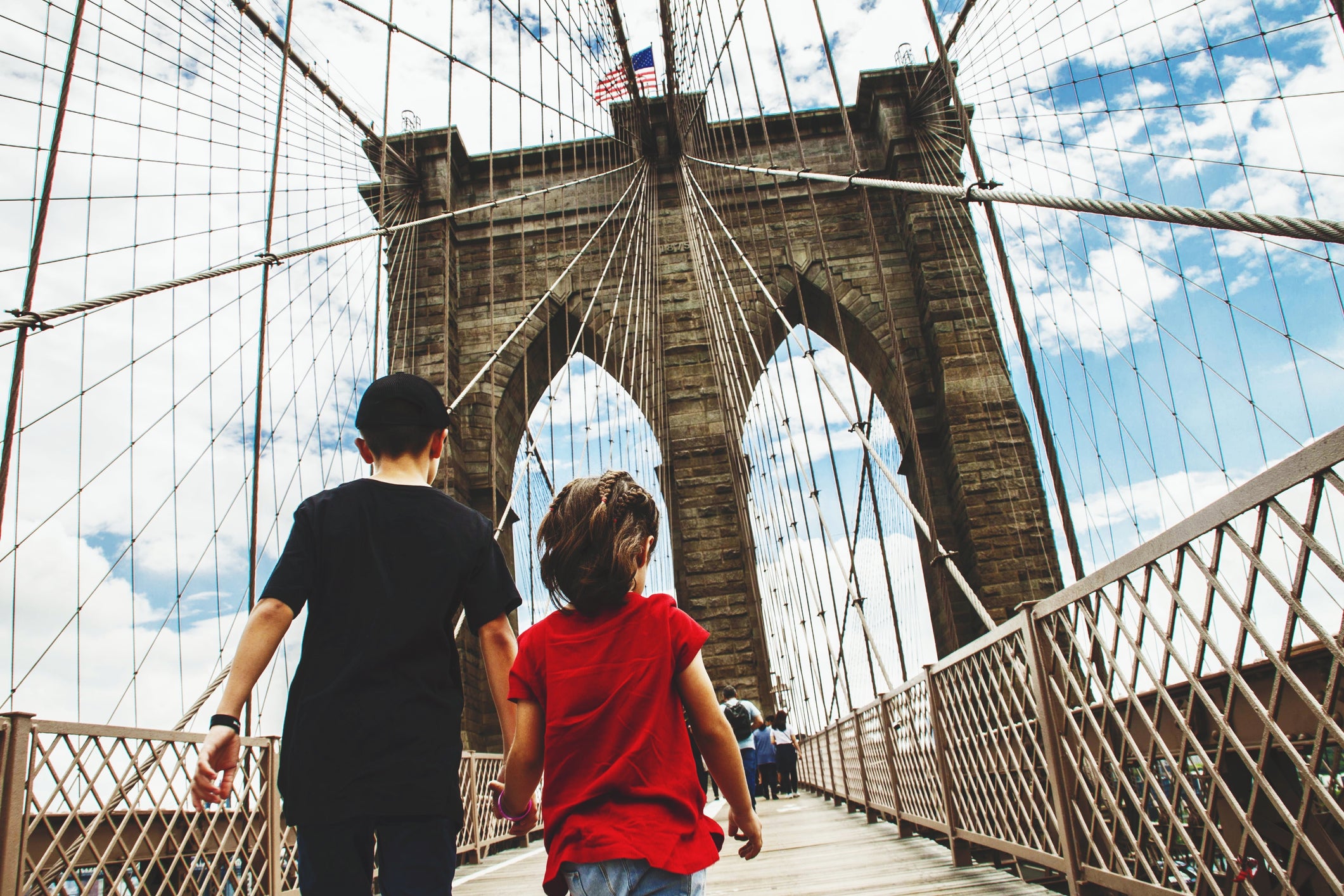
There are various aspects to keep in mind in the age of COVID-19. Consider booking travel plans that are fully refundable or have modest change or cancellation fees so you don't need to worry about whether your policy will cover trip cancellation. This is important since many standard comprehensive insurance policies won't reimburse your insured expenses in the event of cancellation if it's related to the fear of traveling due to COVID-19.
However, if you book a nonrefundable trip and want to maintain the ability to get reimbursed (up to 75% of your insured costs) if you choose to cancel, you should consider buying a comprehensive travel insurance policy and then adding optional cancel for any reason protection. Just note that this benefit is time-sensitive and has eligibility requirements, so not all travelers will qualify.
Providers will often require CFAR purchasers insure the entire dollar amount of their travels to receive the coverage. Also, many CFAR policies mandate that you must cancel your plans and notify all travel suppliers at least 48 hours before your scheduled departure.
Likewise, if your primary health insurance won't cover you while on your trip, it's essential to consider whether medical expenses related to COVID-19 treatment are covered. You may also want to consider a MedJet medical transport membership if your trip is to a covered destination for coronavirus-related evacuation.
Ultimately, the best pandemic travel insurance policy will depend on your trip details, travel concerns and your willingness to self-insure. Just be sure to thoroughly read and understand any terms or exclusions before purchasing.
What are the different types of travel insurance?
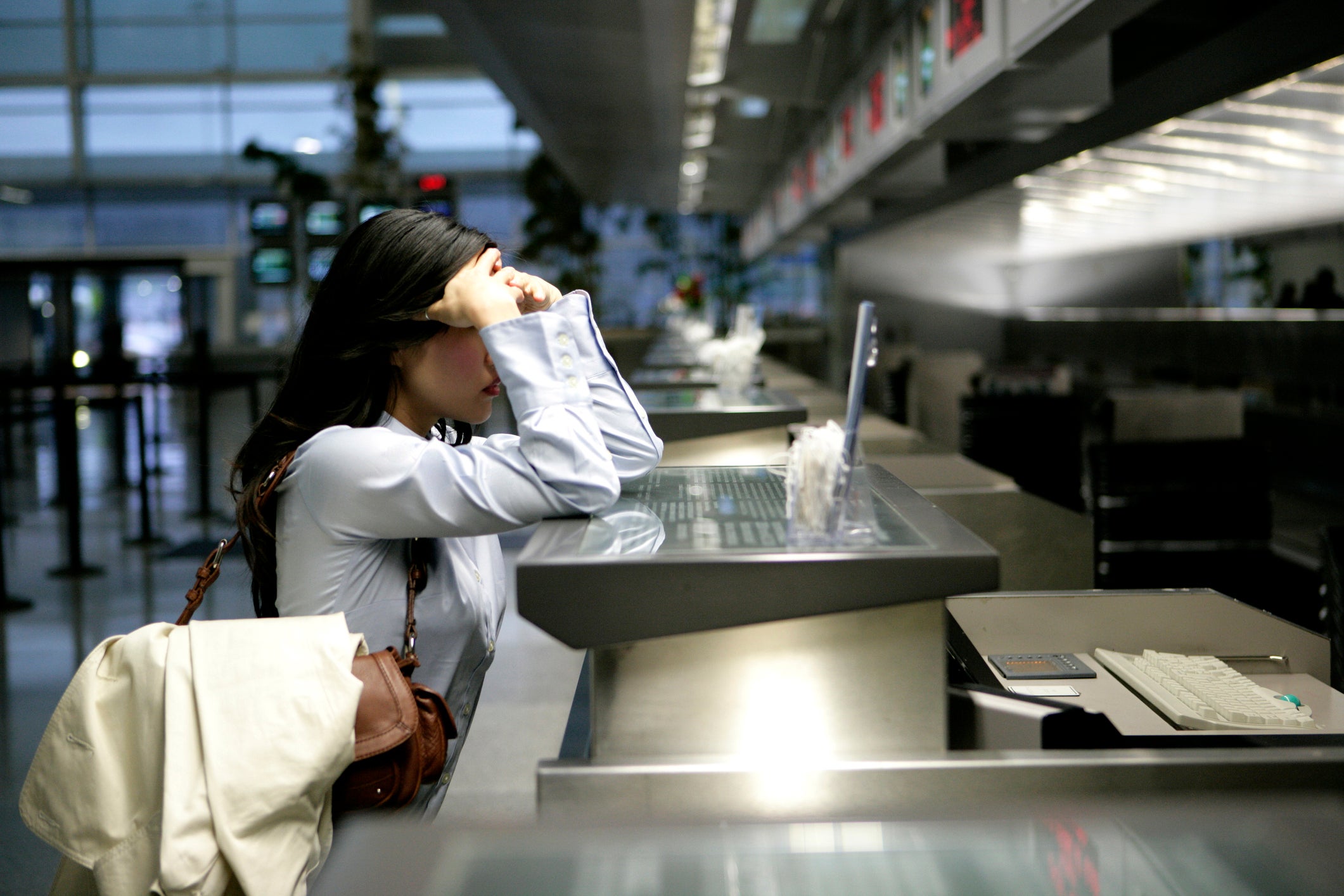
Whether you purchase a comprehensive travel insurance policy or rely on the protections offered by select credit cards, you may have access to the following types of coverage:
- Baggage delay protection may reimburse for essential items and clothing when a common carrier (such as an airline) fails to deliver your checked bag within a set time of your arrival at a destination. Typically, you may be reimbursed up to a particular amount per incident or per day.
- Lost/damaged baggage protection may provide reimbursement to replace lost or damaged luggage and items inside that luggage. However, valuables and electronics usually have a relatively low maximum benefit.
- Trip delay reimbursement may provide reimbursement for necessary items, food, lodging and sometimes transportation when you're delayed for a substantial time while traveling on a common carrier such as an airline. This insurance may be beneficial if weather issues (or other covered reasons for which the airline usually won't provide compensation) delay you.
- Trip cancellation and interruption protection may provide reimbursement if you need to cancel or interrupt your trip for a covered reason, such as a death in your family or jury duty.
- Medical evacuation insurance can arrange and pay for medical evacuation if deemed necessary by the insurance provider and a medical professional. This coverage can be particularly valuable if you're traveling to a region with subpar medical facilities.
- Travel accident insurance may provide a payment to you or your beneficiary in the case of your death or dismemberment.
- Emergency medical insurance may provide payment or reimburse you if you must seek medical care while traveling. Some plans only cover emergency medical care, but some also cover other types of medical care. You may need to pay a deductible or copay.
- Rental car coverage may provide a collision damage waiver when renting a car. This waiver may reimburse for collision damage or theft up to a set amount. Some policies also cover loss-of-use charges assessed by the rental company and towing charges to take the vehicle to the nearest qualified repair facility. You generally need to decline the rental company's collision damage waiver or similar provision to be covered.
Should I buy travel health insurance?
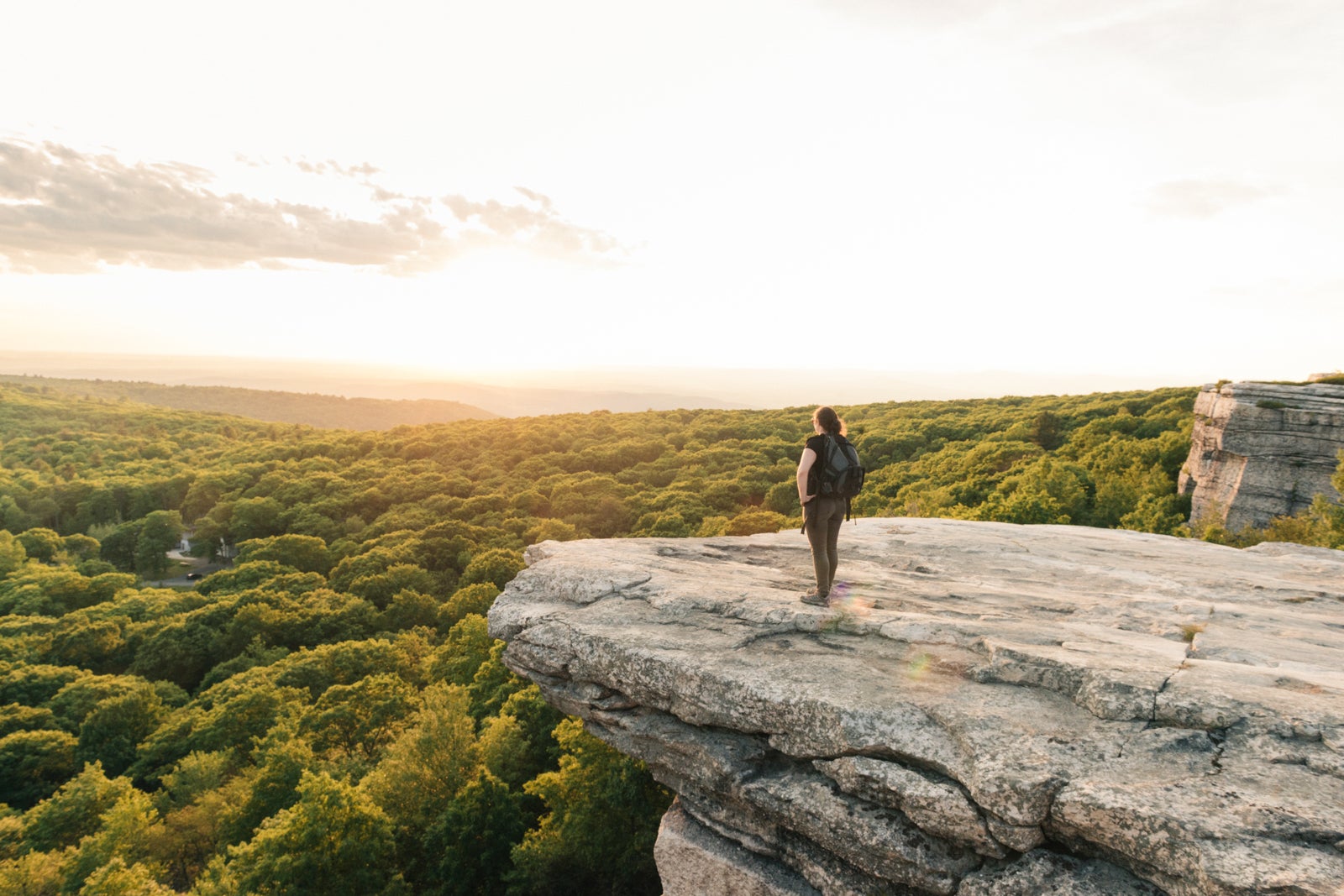
If you purchase travel with credit cards that provide various trip protections, you may not see much need for additional travel insurance. However, you may still wonder whether you should buy travel medical insurance.
If your primary health insurance covers you on your trip, you may not need travel health insurance. Your domestic policy may not cover you outside the U.S., though, so it's worth calling the number on your health insurance card if you have coverage questions. If your primary health insurance wouldn't cover you, it's likely worth purchasing travel medical insurance. After all, as you can see above, travel medical insurance is often very modestly priced.
How much does travel insurance cost?
Travel insurance costs depend on various factors, including the provider, the type of coverage, your trip cost, your destination, your age, your residency and how many travelers you want to insure. That said, a standard travel insurance plan will generally set you back somewhere between 4% and 10% of your total trip cost. However, this can get lower for more basic protections or become even higher if you include add-ons like cancel for any reason protection.
The best way to determine how much travel insurance will cost is to price out your trip with a few providers discussed in the guide. Or, visit an insurance aggregator like InsureMyTrip to quickly compare options across multiple providers.
When and how to get travel insurance

For the most robust selection of available travel insurance benefits — including time-sensitive add-ons like CFAR protection and waivers of preexisting conditions for eligible travelers — you should ideally purchase travel insurance on the same day you make your first payment toward your trip.
However, many plans may still offer a preexisting conditions waiver for those who qualify if you buy your travel insurance within 14 to 21 days of your first trip expense or deposit (this time frame may vary by provider). If you don't need a preexisting conditions waiver or aren't interested in CFAR coverage, you can purchase travel insurance once your departure date nears.
You must purchase coverage before it's needed. Some travel medical plans are available for purchase after you have departed, but comprehensive plans that include medical coverage must be purchased before departing.
Additionally, you can't buy any medical coverage once you require medical attention. The same applies to all travel insurance coverage. Once you recognize the need, it's too late to protect your trip.
Once you've shopped around and decided upon the best travel insurance plan for your trip, you should be able to complete your purchase online. You'll usually be able to download your insurance card and the complete policy shortly after the transaction is complete.
Related: 7 times your credit card's travel insurance might not cover you
Bottom line
Not all travel insurance policies and providers are equal. Before buying a plan, read and understand the policy documents. By doing so, you can choose a plan that's appropriate for you and your trip — including the features that matter most to you.
For example, if you plan to go skiing or rock climbing, make sure the policy you buy doesn't contain exclusions for these activities. Likewise, if you're making two back-to-back trips during which you'll be returning home for a short time in between, be sure the plan doesn't terminate coverage at the end of your first trip.
If you're looking to cover a sudden recurrence of a preexisting condition, select a policy with a preexisting condition waiver and fulfill the requirements for the waiver. After all, buying insurance won't help if your policy doesn't cover your losses.
Disclaimer : This information is provided by IMT Services, LLC ( InsureMyTrip.com ), a licensed insurance producer (NPN: 5119217) and a member of the Tokio Marine HCC group of companies. IMT's services are only available in states where it is licensed to do business and the products provided through InsureMyTrip.com may not be available in all states. All insurance products are governed by the terms in the applicable insurance policy, and all related decisions (such as approval for coverage, premiums, commissions and fees) and policy obligations are the sole responsibility of the underwriting insurer. The information on this site does not create or modify any insurance policy terms in any way. For more information, please visit www.insuremytrip.com .
What to consider before you go
What should be in your travel safety kit, what you should leave at home, is it safer to fly or drive, your driving safety plan, your airport safety plan, our experts, the 15 travel essentials to keep you the safest from omicron this holiday season.
When you buy through our links, Business Insider may earn an affiliate commission. Learn more
- COVID cases are up as the Omicron variant spreads, impacting holiday travel plans across the U.S.
- The best precautions for travel are getting vaccinated with a booster and wearing a mask in public.
- Additional items like at-home COVID tests and hand sanitizer can also help you travel safer.

COVID cases are on the rise again with the highly contagious Delta and Omicron variants. Initial reports do indicate that while Omicron spreads quickly, it might be milder than other COVID variants , at least for vaccinated people.
But taking precautions when you travel is still essential, whether or not you're vaccinated. Everyone must wear a mask over their nose and mouth on planes, buses, trains, taxis, and other forms of public transportation. And all experts agree the best way to protect yourself and others is to get your vaccine , including the booster if you're eligible.
And if you're traveling internationally, make sure you read up on your destination's specific visitation rules, as most require proof of vaccination and/or certification you've had a recent negative COVID test. Many experts also recommend taking a COVID test before and after you travel regardless of if it's required.
No matter if you're flying for driving, vaccinated or not, it's important to be prepared. We talked to three experts about everything you need to know to travel safely, including what essentials to pack and the proper precautions to take.
Here are the new essentials everyone should pack before traveling:
- Vaccine passport: CommonPass
- N95 mask: Kimberly-Clark N95 Respirator
- KN95 mask: Powecom KN95 masks, 10 pack
- Disposable mask: DemeTech DemeMask Surgical Mask
- Fabric face masks: Herschel Classic Fitted Face Mask
- Face masks with removable filter : Halo Life Nanofilter Mask
- Face masks for kids: Onzie Mindful Masks (2-Pack)
- At-home COVID test : EmpowerDX At-Home COVID-19 PCR Test
- Portable hand sanitizer: Touchland Power Mist Sanitizer Spray
- Travel-sized disinfectant wipes : Clorox Disinfectant Wipes To Go
- A smartphone sanitizer: PhoneSoap 3 Smartphone UV Sanitizer
- Packing cubes : eBags Hyperlite Packing Cubes
- Tape to help your face mask fit better : Cabeau Tape
- A mask bracket for added comfort : HeartFormSF Mask Bracket
- Reusable bags for safety gear : Stasher Reusable Silicone Bag
Vaccination against the SARS-CoV-2 virus is the most important and effective way we can reduce the spread and severity of COVID-19, David Aronoff, MD, director of the Division of Infectious Diseases at the Vanderbilt University Medical Center, told Insider during his medical review of this piece.
"While masks, reduced crowding, and social distancing are among the many things we can do to reduce the spread of COVID-19, vaccination has been shown to protect against getting infected, reduce the risk of symptoms or severe disease, and prevent death," he said.
Be sure that anyone in your traveling party (or meeting you at your destination) is vaccinated if they are eligible and vaccines are available in their country, and that they've received their booster vaccine dose, which is now available for most people who've already been immunized.
Additionally, all travelers should ask themselves before they go: Can I afford to be trapped somewhere if I or one of my travel companions gets COVID and can't travel home? "If the answer is no, stay home," Dr. Aronoff added.
If you are traveling, Dr. Aronoff encourages checking your health insurance carefully to find out where and how to seek medical attention if you need it and exactly what your policy covers. Some countries require proof of travel health insurance that covers COVID to enter their borders. Dr. Aronoff also suggested having a plan for where you'd go to get care if you got sick and how you'd quarantine from the people you're visiting.
Whether you're vaccinated or not, driving or flying, remember the basics of COVID travel: Wear the best mask you can (ideally an N95-type mask), making sure it fits snuggly without gaps at the sides (layering two masks can help), and keep your distance from people outside your household as much as possible.
Then, pack a portable COVID-19 safety kit, whether flying or driving.
Proof of vaccination
Again, getting the COVID vaccine is the best thing you can do to stay safe and keep others safe while traveling during the pandemic. Many countries require proof of vaccination before entering their borders, and even if you're traveling domestically, it's a good idea to have proof with you just in case a public space or business upon arrival requires it.
If you want to travel with your physical vaccine card, we suggest putting it in a protective vinyl casing . But there are also a handful of apps , such as CommonPass and VeriFLY , that allow you to upload proof of vaccine and even connect PCR test results so you have proof of your low-risk all in one place.
Masks for adults
Masks are required on all airlines, regardless of your vaccination status or where you're flying. They're also recommended for any public place while driving, like public restrooms or service stations.
As coronavirus is an airborne virus, wearing a mask is still one of the key ways to reduce spreading or getting COVID, especially in an indoor, crowded place like an airport or airplane, Joyce Sanchez, MD, medical director of the Travel Health Clinic at Froedtert and the Medical College of Wisconsin tells Insider.
Wearing the right mask the right way helps to protect not only the people around you but the wearer too.
Nearly everyone can safely wear a mask, other than those who can't put on or take off a mask themselves. This includes those with chronic lung and heart problems, Dr. Sanchez says. "Even if it feels harder to breathe while wearing a mask, it doesn't actually affect how much oxygen your body gets," she assures.
Why are masks so important? Think of the COVID virus like cigarette smoke spreading indoors — it flows throughout the space (beyond 6 feet from the person who exhaled it and around plexiglass barriers) and can hang in the air for hours, even after the person is no longer in the room.
Considering its spreadability, and given how contagious the Delta variant is, it's more important than ever to wear a well-fitting mask to both prevent spreading the virus to others and inhaling it yourself.
N95-type masks are best now that they're no longer in short supply like early in the pandemic, followed by KN95 masks (both technically called respirators rather than masks). Both seal the sides of the face and top of the nose to minimize any gaps where air can leak, and offer additional filtration of air as you breathe, Dr. Sanchez explains.
However, counterfeits are common, so check the CDC's list of approved masks and suppliers . A quick way to tell is that real N95s have straps around the back of the head instead of ear loops and a TC number (e.g., 84A-XXX for U.S.-approved N95s).
After N95s and KN95s, a three-layer cloth mask is your next best option. The outside two layers should be a tightly-woven fabric like cotton or linen and the middle a filter fabric, either built-in or added-in by you (a folded paper towel works great).
It's important that your mask fits snugly to trap the potentially-infected air particles rather than leaking through the edges of the mask and being directly inhaled, Abe Malkin, MD, MBA, the founder and medical director of Concierge MD LA , tells Insider. Make sure there are no gaps around the edges of your mask — a detail of equal importance regardless of if you're vaccinated or not.
If your mask has gaps on the top or sides or if you only have a single-ply mask, it's smart to double up with a disposable surgical-type mask underneath and a tighter cloth mask over top. And if your mask slips down under your nose as you talk, it's a sure sign you need a better-fitting mask.
Skip the neck gaiters and bandanas — early reports that they're worse than no mask at all were likely overblown , but researchers do know real masks are more effective. Plus, many airlines don't allow them anyway.
Masks for kids
A well-fitting mask is the most important factor for anyone, so children should use masks made for kids , Dr. Malkin says, adding "adult masks are too big for them."
If kids can help choose their own supplies, it increases the chance they'll use them. Dr. Malkin advises opting for a mask with a character or designs your child likes to increase the chance that they'll keep it on when you're not looking.
Masks are generally required on planes for kids 5 and older, though sometimes it's 2 or older (check your airline's requirements before you go). And Dr. Aranoff advises all kids over 2 years old should wear one in indoor, public places unless they physically can't. The CDC does not recommend masks for children under 2.
Kids need multiple masks just like adults, so stash a few extras in their backpacks and in the car, Jagdish Khubchandani , PhD, a professor of public health at New Mexico State University tells Insider.
At-home COVID-19 test
Most countries require you to have proof of a negative COVID test to enter. Taking one is a good idea even if you're traveling domestically, especially if you're unvaccinated, the CDC advises .
Even if your destination doesn't require it and even if you're vaccinated, it's wise to get a COVID test both before you travel and after you arrive to minimize the chance of spreading the virus to vulnerable people. "If you are planning on visiting others, make sure to get tested to ensure everyone's safety," Dr. Malkin adds.
For international or domestic travel, the CDC recommends that people who aren't vaccinated take a COVID test one to three days before you leave, keep your distance from others as much as possible while traveling, and once you return home, take another viral test and self-isolate for a full seven days. If you don't get a viral test, you should isolate for 10 days. Either way, avoid being around high-risk folks for 14 days.
As for where to get a COVID test, many towns have free testing sites. But you can also snag an at-home rapid antigen test or, slightly less common, more accurate molecular tests (such as a PCR test). Just remember, the tests aren't 100% foolproof.
Many at-home tests require you to mail in a nasal swab or spit tube to be processed in a lab. But newer tests (both antigen and molecular) available in some countries let you get your results online in as little as 45 minutes, with some antigen tests delivering results right in front of you, within 15 minutes. (Just be sure to follow the instructions closely and know that the tests can give a false negative.)
Most tests that are supervised by a health professional over video provide you with the certification you need for flights. Just make sure you know the precise time window to do your test and get the certification back before your flight.
When our team researched and tested the leading at-home COVID tests on the market throughout 2021, we found EmpowerDX Nasal to be the most accurate, covered by most insurance or the cheapest test available out of pocket and turns results around within two days of the lab receiving the sample. Dr. Sanchez also recommends the Abbott at-home antigen test kit, which offers six tests for $150.
Dr. Sanchez recommends each person bring at least two approved at-home test kits that meet the testing requirements when traveling internationally in case there's a problem with one or you need to re-test. "You do not want to be stuck or delayed in returning home because you have not prepared for that required step," she adds.
Hand soap, sanitizer, and wipes
Traveling exposes you to tons of germs — viruses, bacteria, protozoa, and fungi — outside of COVID that can cause illnesses. It's super important to clean your hands before and after you eat, in particular. The best way : Wash your hands with soap and water for at least 20 seconds and then dry them thoroughly with a paper or cloth towel (rather than an air blower).
But since that's not always possible, the second-best option is to use hand sanitizer. Always pack one with at least 60% alcohol in your carry-on, and rub it all over your hands, even the nooks and crannies, until it evaporates.
Antibacterial hand wipes are less ideal since they sometimes contain harmful chemicals and may contribute to antibiotic resistance. But in a pinch, they're definitely better than having unclean hands. Keep in mind that most wipes are formulated for objects and not for skin, Dr. Malkin points out. As with hand sanitizer, the formula needs to be at least 60% alcohol to kill viruses.
Disinfectant wipes
Keeping high-touch surfaces clean is important, but don't obsess over disinfecting every surface you come into contact with, Dr. Sanchez told us — you're not at all likely to acquire COVID by touching an infected surface . This is especially true when driving; there's no need to wipe down your car handles or steering wheel, for example.
That being said, high-touch surfaces on planes — armrests, tray tables, in-flight entertainment screens — can transmit germs, so it's wise to wipe down surfaces around your seat with a disinfectant wipe .
Be sure to clean your phone too — you might be surprised by how dirty it actually is . Follow the manufacturer's instructions for how to clean it and try to use it only with clean hands. (But be careful: Some cleaners can ruin your screen .)
Storage bags
When flying, carry-on storage is essential to make it easy to access hand sanitizer and other essential items. Ideally, your carry-on bag has multiple pockets so you can keep things like food and extra masks separate from dirty items. You can also use a small pouch to keep these essentials right on top (we like these durable, zippered pouches from Baboon to the Moon).
We also recommend having a few plastic bags available to store dirty masks, in addition to things like used disinfectant wipes or tissues until you can find a trash can. You'll want one for your car and in your carry-on.
It's also helpful to have a designated clean storage bag where you can put your mask when you take it off to eat away from dirty surfaces or other people's breath, Dr. Sanchez advises. Avoid placing your mask on a table or your arm to minimize germ contamination.
You don't need to bring gloves with you traveling. First of all, COVID-19 is transmitted by breathing, not by touching things and then touching your face. Regardless, germs can live on the surface of a latex glove, the same as skin, Dr. Malkin says. Plus, "some people become too relaxed when they are wearing gloves. They do not realize they are at more risk for spreading [germs] because they are touching multiple personal items in between other things," he adds.
Studies have suggested that people who wear gloves tend not to wash their hands as often or notice when gloves get dirty or damaged. It's also easy to contaminate your hands when removing gloves. Plus, we don't need any more COVID-19 waste than we already have.
Face shields
How important are face shields? "As we do not have data to support the use of face shields in protecting individuals from acquiring COVID-19 in the community setting, they should not be used as a substitute for a well-fitting mask," Dr. Sanchez says.
She added that while she saw no downside to adding a face shield to your travel safety kit, "they are not an equivalent substitute for face masks." They might provide protection if someone sneezes in your direction, for example, but they don't protect others from any virus you may be carrying.
If you do need to travel, driving is generally safer than flying commercially, Dr. Sanchez says. If you drive , you have control over who shares the car with you, where you stop along the way, and when you return.
If you're fully vaccinated and wearing a well-fitting mask, it's generally safe to fly from a COVID-19 transmission standpoint, she adds.
Just keep in mind that you're most likely to transmit or catch the coronavirus when in close proximity to an infected person, especially in situations where people aren't wearing masks at all or wearing them properly. That means airport lines are an issue (sitting on the plane much less so, as we'll explain below), as is driving with anyone not already in your household bubble. Eating indoors — since people have no choice but to remove their masks — is high risk.
Regardless of your mode of transportation, it's important to be diligent with precautions.
Remember that COVID is spread by people breathing and talking, not by touching surfaces. If you're driving, you don't need to wipe down your steering wheel. But it can bring peace of mind to clean your hands before getting in; have hand sanitizer at the ready before and after you eat, and for after you use a gas pump and public restroom, for example.
Choose restaurants where staff are diligent about wearing masks. Keep your mask on unless you're actively eating or drinking, and try to eat outdoors or in your car.
Use public restrooms for bathroom breaks. Pulling over for a roadside bathroom break is actually illegal throughout the U.S . Just wear a mask and try to wait outside in a well-ventilated space for a free stall. If the toilet has a lid, close it to flush. (There's evidence that the coronavirus can spread by flushing .)
Dr. Sanchez adds that you should assume public restrooms are not properly disinfected and that surfaces could be covered in many kinds of germs aside from COVID. Wash your hands with soap and water for at least 20 seconds and then use a paper towel to dry your hands and turn off the tap and open the door. If you do touch anything on your way out, use your 60%-plus alcohol hand sanitizer.
Airports — especially with lines at security, boarding gates, and within the plane itself — are risky because of the close proximity to other people. Wear your mask at all times and keep as much distance from others as you can.
When the TSA has you lower your mask for identity verification, touch it from the ear loops rather than the middle to avoid transferring any germs on the fabric onto your hands. It's wise to sanitize or wash your hands after you've touched security trays, not so much because of the coronavirus, but to protect yourself from other germs.
As for the plane itself, airlines have stepped up their disinfecting regimens. Many use electrostatic foggers nightly — sometimes between every flight. They spray a fine mist of disinfectant throughout the plane, and the electrostatic charge causes it to stick to all surfaces, not just fall to the floor.
Though COVID isn't transmitted by touching things, don't assume your flight has been freshly fogged with disinfectant. Planes can be filthy . It's still wise to wipe down everything in your seat area with a disinfecting wipe like Clorox Ultra Clean Disinfecting Wipes ; many airlines now hand out disinfecting wipes as you board, too.
If you bring your own, look for "disinfecting" and at least 60% alcohol on the label — a cleaning wipe rids your tray table of that splash of Coke, but it won't kill bacteria and viruses. Settle into your seat and wipe down everything you're likely to touch: the seat belt, armrests, the tray table, the air vent, the window-shade handle, and all places you need to touch to operate the entertainment system.
Then, thoroughly clean your hands with sanitizer. The TSA increased the size limit for sanitizer during the pandemic, and until further notice, you're allowed to bring one bottle that's up to 12 ounces in your carry-on bag. If you're flying internationally, note that some countries maintain the 3-ounce limit.
You might be worried about sitting in an enclosed space for hours, but the air on planes is cleaner than in many indoor places , and airlines' mandatory mask policies help protect everyone from virus particles that anyone could be breathing out. A September 2021 peer-reviewed, real-world study showed that the risk of contracting COVID-19 on a plane is 0.1% thanks to mask policies, requiring negative COVID tests to fly, and planes' hospital-grade air filtration systems.
When a plane cruises, the cabin air refreshes every three to four minutes, using both fresh air from outside and air that's gone through HEPA filters that remove virtually all viruses.
However, if you need to eat or drink on a plane, it's wise to wait a few minutes after the people around you have put their masks back on before you take yours off.
Minimize moving around on the plane, including wrestling carry-on luggage in and out of the overhead bin. If you need to use the restroom, be sure to close the toilet lid before you flush. After washing your hands for 20 seconds and drying them, use a paper towel to unlock and open the door. Avoid touching seatbacks as you return to your own, both to keep your hands clean ( headrests are the dirtiest surfaces inside an airplane cabin ) and so you don't disturb other passengers.
After your flight, it's smart to avoid crowds around the baggage carousel — wait until space clears before you grab your bag.
You'll also want to check your destination's latest COVID-19 rules for arriving passengers. Some countries require everyone, whether vaccinated or not, to have a negative COVID-19 test on arrival and self-isolate until it's confirmed negative.
For this article, we deeply researched across leading health organizations like the Centers for Disease Control and Prevention (CDC) and the World Health Organization (WHO). We also spoke with the following experts:
- Joyce Sanchez, MD , the medical director of the Travel Health Clinic at Froedtert and the Medical College of Wisconsin
- Dr. Abe Malkin, MD , MBA, the founder and medical director of Concierge MD LA
- Jagdish Khubchandani , PhD , a professor of public health at New Mexico State University
This piece was also medically reviewed for accuracy before publishing by Dr. David Aronoff, MD , director of the Division of Infectious Diseases at the Vanderbilt University Medical Center.
- Main content
sign up and keep track of your travel insurance events
What is Travel Protection? And Do You Need a Travel Protection Plan?

When exploring travel insurance options, you may find that while travel insurance is the most commonly used term, plans are also frequently referred to as travel protection or trip insurance. If you find yourself asking “What is travel protection?” “What is trip insurance?” or “What’s the difference?”, we have some answers for you.
What is a travel protection plan?
Travel protection plans provide assistance services in addition to travel insurance coverages. For example: Travel Protection plans from Generali Global Assistance come with coverages like Trip Cancellation and Medical & Dental, plus Travel Services that include access to a 24/7 Emergency Assistance phone line.
Also read our Guide to Understand, Purchase and Use Trip Insurance
What is included with a travel protection plan?
All travel protection plans available from this website include a combination of:
- Travel Insurance and
- Travel Assistance Services,
which together help give you aid and comfort during your travels.
For example:
- our Travel Insurance can reimburse you for medical costs if you fall and twist your ankle;
- while the 24/7 Travel Assistance included with the plan can help you find the closest doctor or help with translation.
- our Travel Insurance can reimburse for travel delay or travel interruption;
- while the 24/7 Travel Assistance Services included with the plan can help you find new flights home.
The price of your Travel Protection Plan includes the travel insurance premium and the cost of the Travel Assistance Services. A detailed price breakdown of the insurance and assistance services is available by phone or email.
Travel protection with assistance services
The global travel assistance services offered with Generali travel insurance plans include:
Travel Support Services On-the-spot and immediate assistance for unexpected problems while traveling. The hotline operates 24/7/365 for help anytime while traveling.
Telemedicine A service that instantly connects travelers with a network of physicians for information, advice and treatment, including prescriptions when appropriate.
Identity Theft Resolution Provides assistance when a traveler’s identity has been compromised during their trip and is automatically included for a full 180 days starting on the traveler’s scheduled departure date. Note: the service is not available for thefts involving non-U.S. bank accounts.
Concierge Services Includes pre-trip assistance, help making airline, hotel, rental car and restaurant reservations, event ticketing services, help scheduling golf tee times and more.
See details about all services that are available with our plans
Trip protection to the rescue
Insurance coverages and global travel assistance services can both be of use if a traveler’s trip is cancelled, interrupted or delayed due to a covered reason.
Consider this scenario: A traveler’s flight has arrived at her port city where she’ll be setting sail for her 14-day South American cruise the next morning. She retrieves her checked bag from the baggage carousel but when she returns to her carry-on luggage sees her backpack containing her passport has gone missing. She retraces her steps and searches the airport before the traveler presumes her backpack has been stolen, files a police report and cancels her cruise.
After contacting Generali Global Assistance , the traveler is relieved to not only learn that a documented theft of her passport is a covered reason and her trip interruption coverage will likely provide reimbursement for her prepaid non-refundable cruise but also that Generali’s designated service provider can open an identity theft case to resolve potential issues related to her stolen identification and even help arrange her flight back home.
Through her travel delay and baggage coverages, the traveler can also be reimbursed for lodging, meals and local transportation while her trip is delayed in addition to her stolen backpack and personal items. With some of her stress alleviated and spirits lifted, the traveler starts to think more about when she can reschedule her cruise and less about the cruise she can’t take.
When weighing their travel insurance options and exploring the questions, “What is travel protection?” and “What is trip insurance?” travelers will note travel insurance, travel protection and trip insurance plans can help when they’re faced with a variety of stressful circumstances, time-consuming inconveniences and financial losses. Including both valuable coverages and useful services, well-rounded travel protection products can help you travel with more peace of mind on domestic or international getaways.
Travel Resources

Average Customer Rating:

Thank you for visiting csatravelprotection.com
As part of the worldwide Generali Group we have rebranded our travel protection plans to Generali Global Assistance, offering the same quality travel insurance, emergency assistance and outstanding customer service as you've come to rely on for the last 25 years. Welcome to our new website!
Final step before you're signed up
Please verify that you're human.
You are using an outdated browser. Upgrade your browser today or install Google Chrome Frame to better experience this site.
What is COVID-19?
Who can get covid-19, can i travel if i recently had covid-19, what can travelers do to prevent covid-19, more information.
CDC Respiratory Virus Guidance has been updated. The content of this page will be updated soon.
Coronavirus disease 2019 (COVID-19) is a respiratory illness caused by the virus SARS-CoV-2. The virus spreads mainly from person to person through respiratory droplets and small particles produced when an infected person coughs, sneezes, or talks. The virus spreads easily in crowded or poorly ventilated indoor settings.
People with COVID-19 have reported a wide range of symptoms – ranging from no or mild symptoms to severe illness. Symptoms may appear 2–14 days after exposure to the virus. Possible symptoms include fever, chills, cough, shortness of breath, fatigue, muscle aches, headache, new loss of taste and smell, sore throat, runny nose, nausea, vomiting, or diarrhea.
Anyone can get COVID-19. However, some people are more likely than others to get very sick if they get COVID-19. These include people who are older, are immunocompromised , or have certain disabilities , or have underlying health conditions . Vaccination, past infection, and timely access to testing and treatment can help protect you from getting very sick from COVID-19.
Yes, you can travel once you have ended isolation . Check CDC guidance for additional precautions, including testing and wearing a mask around others. If you recently had COVID-19 and are recommended to wear a mask, do not travel on public transportation such as airplanes, buses, and trains if you are unable to wear a mask whenever around others.
Get up to date with your COVID-19 vaccines before you travel and take steps to protect yourself and others . Consider wearing a mask in crowded or poorly ventilated indoor areas, including on public transportation and in transportation hubs. Take additional precautions if you were recently exposed to a person with COVID-19. Don’t travel while sick.
If you have a weakened immune system or are at increased risk for severe disease talk to a healthcare professional before you decide to travel. If you travel, take multiple prevention steps to provide additional layers of protection from COVID-19, even if you are up to date with your COVID-19 vaccines. These include improving ventilation and spending more time outdoors, avoiding sick people, getting tested for COVID-19 if you develop symptoms, staying home if you have or think you have COVID-19, and seeking treatment if you have COVID-19.
Consider getting travel insurance in case you need medical care abroad .
Consider getting a COVID-19 test if you:
- Develop COVID-19 symptoms before, during, or after travel.
- Will be traveling to visit someone who is at higher risk of getting very sick from COVID-19.
- Were in a situation with a greater risk of exposure during travel (e.g., in an indoor, crowded space like an airport terminal while not wearing a mask).
If you traveled and feel sick, particularly if you have a fever, talk to a healthcare professional, and tell them about your recent travel.
- Masking During Travel
File Formats Help:
- Adobe PDF file
- Microsoft PowerPoint file
- Microsoft Word file
- Microsoft Excel file
- Audio/Video file
- Apple Quicktime file
- RealPlayer file
- Zip Archive file
Exit Notification / Disclaimer Policy
- The Centers for Disease Control and Prevention (CDC) cannot attest to the accuracy of a non-federal website.
- Linking to a non-federal website does not constitute an endorsement by CDC or any of its employees of the sponsors or the information and products presented on the website.
- You will be subject to the destination website's privacy policy when you follow the link.
- CDC is not responsible for Section 508 compliance (accessibility) on other federal or private website.
- Search Please fill out this field.
- Manage Your Subscription
- Give a Gift Subscription
- Newsletters
- Sweepstakes
We independently evaluate all of our recommendations. If you click on links we provide, we may receive compensation.
- Travel Products
- Travel Accessories
The 16 Best Travel Safety Products of 2024
From door alarms to fake wedding bands, here are your travel safety essentials.
:max_bytes(150000):strip_icc():format(webp)/Kaitlyn-McInnis-cee349fef7894ae0a9063c960b3eed93.jpeg)
In This Article
- Our Top Picks
- Tips for Buying
- Why Trust T+L
Travel & Leisure / Kevin Liang
Ensuring your personal safety and well-being is just as important as making memories and enjoying la dolce vita while traveling (if not more so). Luckily, staying safe while abroad or on a trip across the country doesn’t take much to get right. Simply come prepared with a few travel-focused safety products to give you peace of mind while you’re on the move.
We’ve rounded up some of the best safety products available, including those which we personally use. We especially love the Birdie Personal Safety Alarm, Monsin Door Stop Alarm, and Raytix RFID Money Belt, which can all help you stay safe in any situation you might encounter while traveling.
Best Door Wedge
Monsin door stop alarm.
This door stop doesn’t just block unwanted visitors — it actually includes a built-in alarm that will sound if someone tries to tamper with your hotel room door.
This alarm is very sensitive and could go off if room service or housekeeping staff attempt to enter your room.
It can be hard to fall asleep in a strange hotel room — even if it’s a plush five-star property. Whether you’re traveling solo or have a travel buddy sharing your room, the Monsin Door Stop Alarm is a great option for giving you peace of mind while you’re sleeping. Just wedge it into the closed hotel room door and it’ll keep unwanted visitors out by acting as a powerful doorstop. This option also comes with a built-in alarm that will ring if anyone tries to tamper with or open your door.
Best Secondary Door Lock
Winonly travel door lock for hotel rooms.
This budget-friendly door-locking system adds another layer of security to your hotel room and is pretty simple to set up.
This option might not fit very well on doors that have weatherproofing or other large seams along the doorframe.
The Winonly Travel Door Lock for Hotel Rooms is a great safety alternative for travelers who don’t want an alarm triggered when hotel staff enter the room for cleaning or turn-down services. Use this portable door lock by attaching it to the hole on the door jam, then inserting the red handle into the lock-in-place. It’s quick and efficient to use and install, and can also be easily removed in the dark for emergencies that require quick evacuation.
Best Personal Alarm
Birdie personal safety alarm.
This personal safety alarm is small, subtle, and can easily be slipped into your pocket or handbag.
Some reviewers note that this alarm should be louder and more offensive, especially for those traveling in big cities.
You never know when a personal safety alarm will come in handy — even in your own hometown or city. This alarm will immediately draw attention to you if your personal safety is threatened, if you encounter a pickpocket, or find yourself in any other unsavory situation.
This small device looks more like a USB drive than a personal safety alarm, and it fits conveniently into your pocket or handbag so you can keep it on you at all times. The compact alarm system sounds when you remove the top pin. To turn it off, just slide the pin back into place.
Best Motion Detector
Crevant portable mini motion detector alarm.
This compact motion detector is ultra-lightweight and small, so it’s easy to slip into a suitcase or carry-on bag.
The instructions aren’t very clear which makes the initial setup a bit difficult.
This small but mighty portable miniature motion detector alarm is a great alternative (or add-on) to a door wedge or door alarm. The compact safety product is extremely quick to trigger the alarm if it senses movement in the direction it's pointed — making it a great option for larger hotel rooms or suites where you don’t have your eye on the entrance at all times. Make sure to keep the “Do Not Disturb” sign on your door so you don’t set off a false alarm when housekeeping or other hotel staff attempt to enter your room.
Best Retractable Cable Lock
Lewis n clark triple security lock.
This cable lock offers extra strong, triple-security material that ensures it can’t be cut through or tampered with.
The lock itself can sometimes be finicky and may take a few minutes to get open.
Travel safety products range beyond personal safety items — to ensure a safe trip, you’ll also need to think about keeping your belongings secure while en route, and when you’re out and about. That’s where the Lewis N Clark Triple Security Lock comes in. This extra-strength lock can prevent thieves from getting into your handbag or backpack — even your bike bag . It’s also TSA-approved, which means you can use it on your checked luggage without worrying about having it cut off or confiscated while in transit.
Best Luggage Tracker
Eufy smarttrack link.
- Ease of Setup 5 /5
- Accuracy 5 /5
- Functionality 5 /5
- Design 4.5 /5
This subtle and compact tracker can easily be thrown in your handbag, backpack, or suitcase.
It is only compatible with Apple devices.
Most frequent flyers will tell you to buy a luggage tracker immediately if you plan on checking your luggage or taking a large carry-on on the plane with you. Adding the Eufy SmartTrack Link to your suitcase will allow you to easily track your belongings at all times. So if you do end up losing your luggage while in transit, you can pinpoint where it is — which can actually help the airline crew to expedite the process of getting your luggage back to you. We found the Eufy SmartTrack Link to be easy to use with Apple's Find My app, so you don't waste time learning a new system or downloading additional apps.
Best Portable Safe
Pacsafe travelsafe portable safe.
This portable safe isn’t imposing or heavy like a traditional metal safe — but it’ll keep your valuables just as secure while on the move.
The slim shape and flat bottom make it difficult to fit items like laptops or cameras.
Keeping your gear secure while at the beach can be a challenge — especially for solo travelers who don’t have someone with them to watch their stuff while they take a dip in the water or grab a drink at the pool bar. That’s where the Pacsafe Travelsafe Gii 5 Liter Portable Safe comes in. This unique portable safe isn’t a traditional metal security box — instead it’s lightweight and easily portable for travel. Another key feature is that it can easily be locked to a tree or a pool chair, making it extremely difficult for potential thieves to make a stealthy getaway with your belongings.
Best Money Belt
Raytix rfid money belt.
- Ease of Use 5 /5
- Comfort 5 /5
- Capacity 5 /5
- Performance 5 /5
- Quality 5 /5
This money belt fits beneath your clothing without looking bulky or obvious.
The small inside pocket is in the corner of the bag, so it's difficult to actually fit items inside.
If you’re more comfortable keeping your valuables hidden away in a discreet money belt than in a backpack or handbag, then you should absolutely consider the Raytix RFID Money Belt. When tested, we found it especially useful for carrying large amounts of cash or for storing passports on you for long periods of time.
This budget-friendly money belt is ultra-slim, discreet, and features RFID-blocking technology to ensure your cards stay safe from potential thieves. Plus, the two front pockets help keep you organized to access all items easily and quickly.
Best Anti-theft Backpack
Sherpani esprit at.
- Capacity 3 /5
This backpack features a slash-resistant bottom, zippers that clasp together, and can be worn on your back or front.
The small front pocket is a bit too small for most smart phones.
This anti-theft crossbody backpack is a stylish yet functional option for any adventure. It can easily be worn on your front or back and the shoulder strap is secured with a clip, so you don't need to lift it over your head to put on or take off. It is made from recycled materials and features a slash-resistant bottom, plus other safety features like RFID protection, locking zippers, and a wire-loop chair lock.
This bag is also the perfect size for day trips and features plenty of pockets, including an exterior water bottle pocket and shoulder strap pocket to keep small essentials easily accessible. With seven fun colors and patterns to choose from, the Sherpani Espirit offers something for everyone trying to stay safe on the go.
Best Hidden Stash Spot
Lokistashed 3-pack velvet hair tie scrunchies.
This hidden stash spot doubles as a functional (and stylish) hair scrunchie.
The zipper isn’t easy to hide and is noticeable on the lighter colorways.
Looking for a spot to safely stash a handful of cash without having to bring along your wallet or handbag? LokiStashed 3-pack Velvet Hair Tie Scrunchies are among our personal favorite options when it comes to discreet storage on the go. These velvet scrunchies function the exact same way a regular scrunchie does — but you can easily store at least a few folded-up bills inside without drawing any attention. It’s great for traveling in busy cities, and is a convenient choice if you’re heading out the door at home and don’t want to be weighed down with a handbag.
Best Fake Wedding Band
Thunderfit women breathable air grooves silicone wedding ring.
This affordable and comfortable silicone wedding band will send the desired message without attracting thieves or appearing overly flashy.
These wedding bands run large so you might want to size down at least a full ring size in order to ensure a proper fit.
Depending on where in the world you’re traveling , you may experience unwanted attention — especially if you’re a solo female traveler. If you’re worried about finding yourself in a situation where you feel harassed or unsafe, then wearing a fake wedding band might be a smart idea.
The ThunderFit Women Breathable Air Grooves Silicone Wedding Ring is a great option for this purpose. It isn’t flashy like a diamond engagement ring, so it won’t attract attention from potential thieves, but it’ll still send the right message to those who might otherwise be difficult to shrug off. These rings are waterproof and breathable, so you won’t have to worry about developing an unsightly green line across your finger, either.
Best First Aid Kit
First aid only all-purpose essentials first aid kit.
- Ease of Use 4 /5
- Organization 3 /5
- Quality 4 /5
This kit includes everything you need in a pinch.
At over nine inches long, it's not the most compact first aid kit out there.
This handy first aid kit comes with all the essentials from ibuprofen tablets to tweezers. Whether you're exploring a major city or hiking a new trail, this kit can help in the case of blisters, burns, headaches, cuts, and more. The 298-piece kit is organized with like-items together, so you can quickly access exactly what you need. Plus, it comes in a lightweight and waterproof carrying case so you can leave it in your vehicle or pack in a day bag to ensure that you're fully prepared for health issues on the go.
Best Passport Wallet
Melsbrinna waterproof rfid-blocking travel wallet.
Your passport fits snugly on one side of the wallet, so it's easy to slide out at customs.
There is no space to store coins.
We love a wallet that's large enough to safely store your passport and this Melsbrinna case is the perfect, safe-yet-stylish option that even includes RFID-blocking technology. Your passport sits on one side of this wallet and the other side features four slots for your credit cards, ID, transit cards, and more. There is also a pocket designed to hold your ticket or other important small documents and two pockets made to keep SIM cards safe. Throughout our travels, we loved that this passport wallet kept all of our items secure, but never felt cumbersome and, in fact, easily fits inside any purse or travel backpack.
Best Reflective Layer
Rei co-op active pursuits cycling jacket.
It's light, wind-resistant, and water-repellent, so it will keep you comfortable in any weather.
The hood may not fit over all bike helmets.
For a reflective layer that will guarantee you're seen whether hiking, walking, cycling, or running, this REI jacket in men's and women's sizes is the perfect choice. The neon yellow fabric features 360-degree reflective details to keep you visible even at night and is so light you can wear it year-round. If you're running or cycling in the heat, the underarm vents area breathable addition that also improves mobility. In winter months, this lightweight layer won't add too much weight to your standard set-up, but will keep you safe as the sun sets earlier.
Best Safety Bracelet
Flare smart safety bracelet.
Without touching your phone, the Flare Bracelet can alert your friends and/or emergency services of possible danger.
It is not yet compatible with Androids.
When traveling solo or to a new location, this bracelet helps keep you connected and safe. The discreet bracelet looks like an average stylish accessory, but uses Bluetooth technology to pair with an iOS app, so you can tap the bracelet in different ways depending on your needs. Hold the hidden button down to text your location to your friends, press the button once to get a pre-recorded phone call to offer you an excuse to leave a situation, or press and hold the button for three seconds to send your location to emergency services.
The bracelet works even when you're up to ten feet away from your phone and the battery lasts a full year, so you don't have to worry about charging the device. It can also be used internationally as long as you have Wi-fi or cell services in your location.
Best Drink Tester
Philmedi gcheck date rape drug test sticker.
It's designed so you can stick it on the back of your phone for discreet and handy use wherever you go.
Each sticker can only be used once.
While we hope you would never feel the need to test your drink, it's always important to be prepared, especially if you're traveling alone or notice someone hovering near your beverage. These discreet stickers test for GHB in less than one minute, so you can protect yourself quickly and effectively. They're conveniently designed to be attached to your phone, wallet, or other item you always carry with a micro-film on the outside to be removed if and when you want to test your drink. Then, you simply tap a bit of the beverage on the sticker and wait to see if it changes color.
Tips for Buying Travel Safety Products
Consider every step of your journey.
You’ll want to think about the potential risks you’ll be taking throughout your trip, from getting there to exploring your destination, and while staying at your hotel or Airbnb —a travel-sized carbon monoxide detector , for example, can provide you with added peace of mind. Travel safety products range significantly from items focusing on solo female travelers’ personal safety to items that protect against theft. Think about where you’re going and what makes the most sense for the destination or type of travel you have in mind, and go from there.
Pick the best way and place to secure valuables
This is something to think about before embarking on your adventure — not just to avoid potential theft, but also to make sure you don’t accidentally misplace anything. You’ll want to know where your valuables are at all times, whether they be jewelry, cash and credit cards, or your passport. Keeping your belongings in a personal safe or money belt while traveling can help give you peace of mind while also keeping you organized.
Why Trust Travel + Leisure
For this article, Kaitlyn McInnis used her experience as a travel writer and solo female traveler to curate the best options to suit most needs.
Love a great deal? Sign up for our T+L Recommends newsletter and we’ll send you our favorite travel products each week.
:max_bytes(150000):strip_icc():format(webp)/TaylorFoxHeadshot-7375be27aedf4b0ea0e0189a4befe7d0.jpeg)
Related Articles
Unveiling The Mystery: What Exactly Is A Travel Test?
- Last updated May 26, 2024
- Difficulty Intemediate
- Category Travel

Travel testing has become a hot topic in recent years, especially with the rise of international travel and the need for COVID-19 testing. But what exactly is a travel test? Is it just another name for a regular medical test? Or is there more to it than meets the eye? In this article, we will be unveiling the mystery behind travel tests and exploring why they have become a crucial aspect of modern-day travel. So, buckle up and get ready to dive into the fascinating world of travel testing.
What You'll Learn
Introduction to travel tests, common types of travel tests, benefits of taking a travel test.
- How to Prepare for a Travel Test?

Travel tests are an essential tool in today's world for anyone planning to travel internationally. These tests help to ensure the safety and wellbeing of both the traveler and the destination they will be visiting. In this article, we will provide an introduction to travel tests, including what they are and why they are necessary.
A travel test is a medical test that assesses an individual's health and determines whether they have a specific condition or meet certain criteria before they are allowed to travel to a particular destination. These tests can help identify individuals who may be carrying infectious diseases or are at risk of transmitting diseases to others.
There are different types of travel tests depending on the purpose and requirements of the destination. The most common types include COVID-19 tests, yellow fever tests, and malaria tests. These tests are usually carried out by medical professionals in designated testing centers or laboratories, and the results are verified and certified.
COVID-19 tests have become especially important in recent times due to the global pandemic. Many countries now require travelers to provide a negative COVID-19 test result before they can enter. This requirement helps to reduce the spread of the virus and protect the local population.
Yellow fever tests are mandatory for travelers visiting countries where the disease is prevalent. Yellow fever is a viral disease transmitted by mosquitoes and is common in certain parts of Africa and South America. The test helps to ensure that travelers are vaccinated against yellow fever and do not pose a risk to the local population.
Malaria tests are necessary for travelers visiting areas where malaria is prevalent. Malaria is a mosquito-borne disease that can be life-threatening if not treated promptly. The test helps to determine whether a traveler has been infected with malaria and allows for timely medical intervention if necessary.
Travel tests are typically required before travel, and the results must be presented upon arrival at the destination. It is important to check the specific testing requirements of your destination country well in advance of your trip and make necessary arrangements to ensure compliance.
In conclusion, travel tests are an integral part of international travel and play a crucial role in ensuring the safety of travelers and the local population. They help identify and prevent the spread of infectious diseases, including COVID-19, yellow fever, and malaria. It is important for travelers to be aware of the testing requirements of their destination and to plan and schedule their tests accordingly. Remember to always prioritize your health and that of others when planning your travel.
Does Travel to Peru Require a Visa: Everything You Need to Know
You may want to see also
Whether you're planning a quick weekend getaway or a longer trip abroad, it's important to make sure you're prepared with the necessary travel tests. Travel tests are designed to help protect both travelers and the communities they visit by identifying potential health risks before or during their trip. In light of the ongoing COVID-19 pandemic, travel tests have become even more essential to ensure safe and responsible travel.
COVID-19 PCR Test:
One of the most common types of travel tests is the COVID-19 Polymerase Chain Reaction (PCR) test. This test is used to detect the presence of the SARS-CoV-2 virus, which causes COVID-19. It involves collecting a nasal or throat swab, which is then analyzed in a laboratory to determine if the virus is present. Many countries now require a negative PCR test result within a specified timeframe before travel to ensure that travelers do not have an active infection.
Rapid Antigen Test:
Similar to the PCR test, the Rapid Antigen test also detects the presence of the SARS-CoV-2 virus. However, it provides faster results, usually within 15-30 minutes. This type of test is often used for point-of-care testing and is commonly employed in airports and other travel hubs to quickly screen travelers for COVID-19.
Serology or Antibody Test:
Unlike the PCR and antigen tests, serology or antibody tests do not detect the presence of the virus directly. Instead, they identify the presence of antibodies in the blood or serum, indicating a previous infection. While antibody tests are not typically used for pre-travel screening, they can provide useful information for individuals who want to know if they have already been infected with COVID-19.
Malaria Test:
For travelers heading to regions where malaria is prevalent, a malaria test may be required. Malaria is a potentially life-threatening disease transmitted through the bite of infected mosquitoes. A simple blood test can determine if the traveler has the malaria parasite, allowing for timely treatment if necessary.
Yellow Fever Test:
Some countries with a risk of yellow fever transmission require proof of vaccination or a negative yellow fever test result for entry. Yellow fever is a viral disease transmitted by mosquitos and can cause severe illness and death. The yellow fever test involves taking a blood sample to check for the presence of the virus.
Hepatitis Test:
Hepatitis is a viral infection that affects the liver and can be transmitted through contaminated food, water, or blood. Depending on the destination and the type of hepatitis (e.g., hepatitis A, B, or C), travelers may be required to undergo a blood test to check for the presence of the virus or antibodies.
Tuberculosis (TB) Test:
Travelers to certain countries with a high prevalence of tuberculosis may be required to undergo a tuberculosis test. Tuberculosis is an airborne bacterial infection that primarily affects the lungs. The test often involves a skin or blood test to check for exposure or active infection.
It's important to note that the specific travel tests required may vary depending on your destination, the purpose and duration of your trip, as well as any current health concerns or risks. Always check with the relevant authorities, such as your destination country's embassy or consulate and your healthcare provider, to ensure you have the most up-to-date and accurate information regarding the necessary travel tests. Additionally, be aware of any timeframes within which the test must be taken before travel and any specific requirements for test results documentation. Proper preparation and adherence to travel test requirements not only helps protect your health but also ensures a safer and smoother travel experience.
A Comprehensive Guide on Checking Your AirAsia Travel Itinerary
Taking a travel test before embarking on your journey can have numerous benefits that can make your trip more enjoyable and hassle-free. Whether you are traveling domestically or internationally, it is always a good idea to get tested for various reasons. In this blog post, we will explore the benefits of taking a travel test and why it can be beneficial for all travelers.
- Ensuring your safety: One of the primary reasons to take a travel test is to ensure your safety as well as the safety of others around you. By getting tested, you can have peace of mind knowing that you are not unknowingly carrying any contagious diseases or infections. This is especially important if you are traveling to a destination where there are cases of specific diseases or if you are traveling during a global pandemic, such as COVID-19. Testing negative before your trip can help reduce the risk of spreading the virus to others and minimize the chances of contracting it from others.
- Meeting travel requirements: Many countries and airlines have implemented health and safety protocols that include mandatory testing for travelers. By taking a travel test and getting a negative result, you can comply with these requirements and avoid any potential issues or delays at airports or immigration checkpoints. Some destinations may also require specific types of tests, such as PCR tests, which can detect the presence of the virus more accurately. Being aware of these requirements and getting tested accordingly can help ensure a smooth and hassle-free travel experience.
- Protecting vulnerable populations: Traveling often involves interaction with different communities and populations, including elderly individuals, children, and individuals with weakened immune systems. By taking a travel test, you are not only protecting yourself but also safeguarding these vulnerable populations. Testing negative before your trip reduces the risk of transmitting any infectious diseases, thereby contributing to the overall health and well-being of the communities you visit.
- Peace of mind: Traveling can be stressful, especially during uncertain times. Taking a travel test can provide you with peace of mind, knowing that you have taken the necessary precautions to protect yourself and others. It can help alleviate any anxiety or worries about the health risks associated with traveling, allowing you to focus on enjoying your trip to the fullest.
- Identifying asymptomatic cases: Many contagious diseases, including COVID-19, can be transmitted by individuals who are asymptomatic, meaning they show no symptoms of the infection. By taking a travel test, you can identify if you are carrying any disease without showing any symptoms. This is especially important for preventing the spread of diseases that have the potential to be severe or have long-term implications. Additionally, identifying asymptomatic cases can help in contact tracing efforts and prevent further transmission of the disease.
Taking a travel test before your trip can offer numerous benefits, ranging from protecting your own health and safety to ensuring the well-being of the communities you visit. It is crucial to stay informed about the specific testing requirements of your destination and comply with them accordingly. By doing so, you can have a more enjoyable and worry-free travel experience, knowing that you have taken the necessary precautions to protect yourself and those around you.
Exploring the Convenience of Sephora's Travel Size Options
How to prepare for a travel test.
Travel tests are becoming more common as countries and airlines implement stricter entry requirements due to the ongoing COVID-19 pandemic. These tests are designed to ensure that travelers are not carrying the virus and help prevent the spread of COVID-19 across borders. If you are planning to travel internationally, it is essential to understand what a travel test is and how to prepare for it.
A travel test, also known as a pre-travel test or a PCR test, is a medical test conducted to detect the presence of SARS-CoV-2, the virus that causes COVID-19. It involves collecting a sample, usually a nasal swab or a saliva sample, and sending it to a laboratory for analysis. The test looks for genetic material specific to the virus and can determine if a person is currently infected.
Here are some crucial steps you should follow to prepare for a travel test:
- Research the specific requirements: Different countries and airlines have varying requirements for travel tests. It is essential to research and understand the specific rules and regulations of your destination. Find out what type of test is accepted (PCR, antigen, or antibody), how recent the test needs to be, and what documentation is required. Check the official government websites or consult with your travel agent for accurate and up-to-date information.
- Schedule your test in advance: To ensure you have your test results in time for your travel, schedule your test well in advance. Keep in mind that some countries require the test to be taken within a specific timeframe before departure. Make an appointment with a reputable laboratory or testing center to get tested.
- Choose a reliable testing facility: It is crucial to select a testing facility that is authorized and recognized by the destination country or airline. Look for laboratories or clinics that have a good reputation for conducting COVID-19 tests accurately and delivering timely results. Check online reviews and recommendations from other travelers if possible.
- Take the right type of test: Make sure you are aware of the specific test type required by your destination. As mentioned earlier, PCR tests are the most commonly accepted type of test. However, some countries may also accept rapid antigen tests or antibody tests. Ensure you take the correct test to meet the entry requirements.
- Follow the testing guidelines: Each testing facility may have its own set of instructions for sample collection, packaging, and shipping. It is essential to follow these guidelines precisely to ensure the validity of your test. Improper sample collection or handling can lead to inaccurate results or test rejection.
- Allow enough time for results: Most countries require a negative test result to be presented upon arrival. Make sure you take the test with enough time for processing and to receive your results before your scheduled departure. Check the average turnaround time for test results from the chosen facility and plan accordingly.
- Pack your documentation: Once you receive your negative test result, make sure to keep a printed or electronic copy of it with your travel documents. Many airlines and immigration authorities will require proof of a negative test result before allowing you to board or enter the country. It is important to have all the necessary paperwork ready to prevent any complications during your journey.
In summary, to prepare for a travel test, you need to research the requirements, schedule your test in advance, choose a reliable testing facility, take the appropriate test, follow the testing guidelines, allow enough time for results, and pack your documentation. By being well-prepared and following the necessary steps, you can ensure a smooth and hassle-free travel experience while keeping yourself and others safe.
Understanding the Travel Parole: Exemptions and Visa Requirements
Frequently asked questions.
A travel test is a medical test that is required for individuals traveling to certain destinations. These tests may include COVID-19 PCR tests, antigen tests, or antibody tests.
Travel tests are often required by governments or airlines to ensure that individuals do not have an infectious disease, such as COVID-19, which could be spread during travel. This helps to minimize the risk of transmission and protect public health.
Travel tests can typically be obtained through healthcare providers, clinics, or testing centers. Some countries may have specific testing requirements or approved testing sites, so it is important to check the requirements of your destination before scheduling a test.

- Viajera Compulsiva Author Editor Reviewer

- Pop Panupong Author Reviewer Traveller
It is awesome. Thank you for your feedback!
We are sorry. Plesae let us know what went wrong?
We will update our content. Thank you for your feedback!
Leave a comment
Travel photos, related posts.
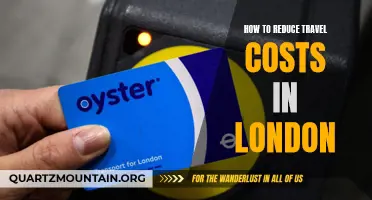
Smart Tips to Minimize Travel Expenses in London
- May 09, 2024

The Ultimate Guide on How to Travel from London to Swansea
- May 10, 2024

The Ultimate Guide to Funding Your Travels by Teaching English
- May 15, 2024

Christopher Columbus: The First Explorer to Travel to America
- May 25, 2024

The Best Places to Donate Travel Size Toiletries

Ultimate Guide to Saving Money While Backpacking for Travel
- May 13, 2024
June 1, 2020
Due to travel restrictions, plans are only available with travel dates on or after
Due to travel restrictions, plans are only available with effective start dates on or after
Ukraine; Belarus; Moldova; North Korea; Russia; Israel
This is a test environment. Please proceed to AllianzTravelInsurance.com and remove all bookmarks or references to this site.

Use this tool to calculate all purchases like ski-lift passes, show tickets, or even rental equipment.

Find the Right Travel Insurance Plan for You
Whether you're traveling for leisure or business, you'll appreciate the benefits and coverage Allianz Travel Insurance plans can provide. With 24/7 support from our travel professionals around the world, we helped over 70 million people last year to protect themselves from the unpredictable.

OneTrip Prime

AllTrips Executive


OneTrip Rental Car Protector

OneTrip Basic

OneTrip Premier

OneTrip Emergency Medical

OneTrip Cancellation Plus
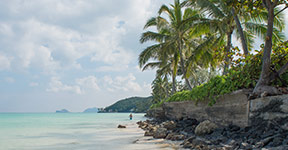
AllTrips Basic

AllTrips Prime

AllTrips Premier
Terms, conditions, and exclusions apply. Please see your plan for full details. Benefits/Coverage may vary by state, and sublimits may apply.

Insurance benefits underwritten by BCS Insurance Company (OH, Administrative Office: 2 Mid America Plaza, Suite 200, Oakbrook Terrace, IL 60181), rated “A” (Excellent) by A.M. Best Co., under BCS Form No. 52.201 series or 52.401 series, or Jefferson Insurance Company (NY, Administrative Office: 9950 Mayland Drive, Richmond, VA 23233), rated “A+” (Superior) by A.M. Best Co., under Jefferson Form No. 101-C series or 101-P series, depending on your state of residence and plan chosen. A+ (Superior) and A (Excellent) are the 2nd and 3rd highest, respectively, of A.M. Best's 13 Financial Strength Ratings. Plans only available to U.S. residents and may not be available in all jurisdictions. Allianz Global Assistance and Allianz Travel Insurance are marks of AGA Service Company dba Allianz Global Assistance or its affiliates. Allianz Travel Insurance products are distributed by Allianz Global Assistance, the licensed producer and administrator of these plans and an affiliate of Jefferson Insurance Company. The insured shall not receive any special benefit or advantage due to the affiliation between AGA Service Company and Jefferson Insurance Company. Plans include insurance benefits and assistance services. Any Non-Insurance Assistance services purchased are provided through AGA Service Company. Except as expressly provided under your plan, you are responsible for charges you incur from third parties. Contact AGA Service Company at 800-284-8300 or 9950 Mayland Drive, Richmond, VA 23233 or [email protected] .
Return To Log In
Your session has expired. We are redirecting you to our sign-in page.
Suggested companies
Was insurance, allclear travel insurance (australia), fast cover travel insurance.

Travel Protect Reviews
In the Travel Insurance Company category
Visit this website
Company activity See all

Write a review
Reviews 4.4.
Most relevant
Followed up that day with a call due to…
Followed up that day with a call due to myself putting in an incorrect email address. Good service.
Date of experience : 22 May 2024
Terrible! Because we extended our trip & we weren't in Australia when taking out the policies, travel protect won't cover us for anything. We did the right thing, we bought a new policy to cover us for the extra days we were staying but that, in Travel Protects opinion doesn't count.
Date of experience : 01 May 2024
That the cover quoted is for the policy and not per person.
Good experience and easy to subscribe. Competitive pricing. What did confuse me is that I thought the quoted cover was per person(I.e., like other providers) but it is not.
Date of experience : 06 May 2024
Return customer
Great price and second time this year I’ve opted for cover with these guys. I did claim on the first one and it was a very easy process and they paid out everything I requested (trip cancellation due to cyclone). I’ll continue to get quotes in the future too based on my experience so far.
Date of experience : 28 April 2024
The ease of purchase and policy out…
The ease of purchase and policy out lined in detail.
Nothing to review
Nothing to review. I purchased the product and thankfully didn’t require it so had no further engagement.
Date of experience : 22 April 2024
I had no reason to make a claim on the…
I had no reason to make a claim on the insurance i purchased so i have no estimation of my satisfaction with or of the quality of the service if i had made a claim. I found the provision about pre existing conditions vague as to whether i would be covered.
Date of experience : 16 April 2024
Very easy process to follow and great…
Very easy process to follow and great cover options
Date of experience : 15 May 2024
Peace of mind with Travel Protect
We used Travel Protect for our travel insurance for a cruise we took in November 2023, and were extremely happy with the whole process. Unfortunately on that cruise I contracted Covid and had to isolate in my cabin. When I contacted a Travel Protect representative they were so lovely and helpful and offered assistance. I submitted my claim when I returned home and received my insurance payment very promptly. They are very professional and helpful, so I have taken travel insurance with them again for our upcoming cruise in May. I know I can travel with peace of mind. Thank you Travel Protect.
Date of experience : 17 April 2024
great price and easy to navigate and…
great price and easy to navigate and choose which insurance we needed
Date of experience : 07 May 2024
Easy sign up
Easy sign up. Their PDS had everything I needed and easy to read. Gave them a call on a particular enquiry... immediate answer and no mucking around. Best Travel Insurance I've obtained for some time. No stress as compared to other travel insurance providers! Comes highly recommended!!!
Date of experience : 26 January 2024
Spoke to a travel consultant about some questions and she was helpful
My help today was very helpful when speaking to the consultant
Date of experience : 27 April 2024
Absolutely loved signing up with them!
Absolutely loved signing up with them. Their PDS was short and concise and I found exactly the information I was looking for regarding home country departure requirements and scuba diving inclusions. Very few questions asked in the application form too and boom..straight to the payment page. Easy. Done. No stress as compared to the forms/requirements of other travel insurance providers!
Date of experience : 27 December 2023
Amazing Deal
Good price, appears to be an excellent offer. Just booked it, hopefully won't have to use it!
Date of experience : 02 May 2024
We did compare the market Travel…
We did compare the market Travel protect was the Best Details easy to follow online
Date of experience : 23 April 2024
Easy sign up and very affordable for seniors. Was easy to understand and links were clear and informative. We have not travelled yet so will provide further feedback after our holiday.
Date of experience : 22 February 2024
Easy to set up and offers good cover…
Easy to set up and offers good cover level at a reasonable price. I haven't made a cliam so can't give 5 stars.....online reviews seem good for those that have.
Date of experience : 08 April 2024
Ease of access and available products
Date of experience : 13 May 2024
Easy to do, prompt confirmation and emailing of documents
Date of experience : 10 May 2024
Primary Traveller Assumptions
Booking the insurance cover was easy. But the assumption that the youngest traveller is the primary contact is very assumptious and probably incorrect most of the time.
Date of experience : 26 March 2024
Advertiser Disclosure
Many of the credit card offers that appear on this site are from credit card companies from which we receive financial compensation. This compensation may impact how and where products appear on this site (including, for example, the order in which they appear). However, the credit card information that we publish has been written and evaluated by experts who know these products inside out. We only recommend products we either use ourselves or endorse. This site does not include all credit card companies or all available credit card offers that are on the market. See our advertising policy here where we list advertisers that we work with, and how we make money. You can also review our credit card rating methodology .
- Credit Cards ›
- Chase Sapphire Reserve
Full List of Travel Insurance Benefits for the Chase Sapphire Reserve Card [2023]
Christine Krzyszton
Senior Finance Contributor
311 Published Articles
Countries Visited: 98 U.S. States Visited: 45
Director of Operations & Compliance
6 Published Articles 1178 Edited Articles
Countries Visited: 10 U.S. States Visited: 20
![test travel protect Full List of Travel Insurance Benefits for the Chase Sapphire Reserve Card [2023]](https://upgradedpoints.com/wp-content/uploads/2020/01/Chase-Sapphire-Reserve-Upgraded-Points-LLC-Large-9.jpg?auto=webp&disable=upscale&width=1200)
Table of Contents
Chase sapphire reserve card — travel insurance benefits and protections, how to file a claim, everything else you need to know, why we like the chase sapphire reserve overall, alternative travel rewards cards, final thoughts.
We may be compensated when you click on product links, such as credit cards, from one or more of our advertising partners. Terms apply to the offers below. See our Advertising Policy for more about our partners, how we make money, and our rating methodology. Opinions and recommendations are ours alone.
Few credit cards can compete with the Chase Sapphire Reserve ® when you’re looking for a premium travel rewards credit card. There are also few, if any, travel rewards cards that offer a better selection of travel insurance benefits.
Travel insurance benefits and protections that come with your credit card can provide valuable assistance if your trip is disrupted, reimburse you for expenses if things go wrong during your journey, and much more.
It’s become increasingly more important to have a level of travel insurance for peace of mind and to make you whole after an unexpected event. While the travel insurance that comes on your credit card is not meant to take the place of a comprehensive travel insurance policy , it can provide sufficient coverage for most trips you make.
Today, we’ll dive deep into the assortment of travel insurance benefits that come with the Chase Sapphire Reserve card.
We’ll also look at how the coverages work, glance at the process for filing a claim if something does go wrong, and in the end, give you all the other reasons we like the card for frequent travelers.
There are so many reasons we like the Chase Sapphire Reserve card overall and we’ll cover those later in our article. For now, we’re going to jump right into the focus of our review, the travel insurance benefits and protections offered on the card.
Some benefits or protections can save you money , others provide assistance during your travels, and yet others offer peace of mind .
Here is our breakdown of the travel insurance coverages that can be found on your Chase Sapphire Reserve card.
Auto Rental Collision Damage Waiver

The auto rental insurance coverage on your Chase Sapphire Reserve card could save you hundreds of dollars on your car rental bill. Simply reserve and pay for your car rental with the card, decline the car rental agency’s collision damage waiver (CDW) or loss damage waiver (LDW) coverage, and receive primary car rental coverage for theft or damage to the rental car.
Primary coverage means that you do not have to file a claim with another insurance company first.
Additional coverage includes loss of use charges and reasonable and customary towing charges.
You and authorized drivers listed on the rental agreement are covered.
Coverage limitations and conditions apply, including:
- $75,000 coverage limit
- Rental period cannot exceed 31 days
- Liability coverage and the loss of personal items are not covered
- Expenses reimbursed by other insurance are not covered
- Antique vehicles, vans that carry more than 9 people, motorcycle/bikes, limos, and recreational vehicles are not covered
Bottom Line: The Chase Sapphire Reserve card comes with primary car rental insurance. If a car rental agency charges $20 per day for this coverage, you could save $140 on a 7-day rental by declining the rental car agency’s collision damage waiver or loss damage waiver coverage.
Trip Cancellation and Trip Interruption
When you pay for your trip partially or in full with your Chase Sapphire Reserve card, with Ultimate Rewards points earned on your card, or a combination of both, you could receive a benefit if your trip has to be canceled or is disrupted for a covered reason.
Examples of covered events could include:
- Severe weather that prevents you from beginning a trip or keeps you from continuing your travels
- Illness or death of an immediate family member or travel companion
- Certain legal obligations
Examples of expenses reimbursed include:
- Prepaid non-refundable expenses charged by a travel supplier, such as a tour operator, airline, or other common carriers
- Non-refundable prepaid expenses charged by rental car or travel agencies
- Under trip interruption, $250 for emergency ground transport
The trip cancellation/interruption coverage that comes with the Chase Sapphire Reserve card pays up to $10,000 per person, per trip , up to $20,000 per occurrence, and up to a maximum of $40,000 in a 12-month period.
Examples of losses that would not be covered could include:
- Cancellation by the travel provider (unless due to severe weather)
- You change your plans
- Preexisting conditions
- Financial insolvency of the travel provider
- Losses that occur on trips exceeding 60 days
Hot Tip: The trip cancellation and trip interruption insurance that comes with a credit card, including the Chase Sapphire Reserve card, does not cover voluntary trip cancellations. If you think you might have to cancel a trip, you should purchase Cancel for Any Reason Insurance which provides coverage regardless of the reason for cancellation.
Trip Delay Reimbursement

Trip delays of more than 6 hours or an overnight stay trigger the trip delay reimbursement coverage on your Chase Sapphire Reserve card. You and your eligible family members could receive up to $500 for each purchased ticket , per trip, for unreimbursed expenses for incidentals, lodging, and meals.
Lost Luggage Reimbursement
If your checked or carry-on luggage is lost, stolen, or damaged, you could receive up to $3,000 per person , per trip. There is a sub-limit of $500 included in the $3,000 maximum for valuable items such as jewelry watches, and specific electronics.
Baggage Delay
When your bags are delayed for more than 6 hours , you could receive up to $100 per day for 5 days for reimbursement of essentials such as clothing, toiletries, and a cell phone charger.
Roadside Assistance
Make just a call if you have a roadside emergency and receive assistance with services such as flat tire replacement, emergency fuel, jump-start service, towing, lock-outs, and more.
The number of covered service calls each 12-month period is limited to 4 and the maximum coverage is $50 per service call. Any charges over that amount will be charged to the Chase Sapphire Reserve card.
Emergency Evacuation and Transportation
Pay for at least a portion of your common carrier trip with your Chase Sapphire Reserve card. Then, if you or an immediate family member become injured or sick during your travels and need emergency evacuation, the card could provide up to $100,000 in coverage .
Trips must be at least 5 days in length , not more than 60 days, and the traveler must be more than 100 miles from home.
This is not reimbursement coverage — you must call the benefits administrator at the time of the incident to initiate emergency transport.
Emergency Medical and Dental Benefit
It’s rare to find any medical or dental coverage provided on a credit card, but the Chase Sapphire Reserve card offers this benefit for its cardholders and qualifying family members.
Here’s how the coverage works:
- Provides up to $2,500 ($50 deducible) for emergency medical or dental services during a covered trip
- Up to $75 per day for 5 days for a hotel if ordered by the attending physician
- Emergency medical/dental services, hospital room, ambulance, medicines, and supplies are examples of covered items
- The trip must be more than 100 miles from your residence
Travel Accident Insurance
Travel Accident Insurance is a benefit seldom ever used but it can provide peace of mind knowing that if a covered death or dismemberment occurred during you or your family’s common carrier trip, there could be a benefit provided.
The card comes with up to $1,000,000 in coverage.
Travel and Emergency Assistance
Whether you need assistance planning your trip or need help during your travels, you’ll have access to a dedicated phone line 24/7 . Receive assistance such as help securing emergency transportation, translation, medical, and legal referrals, help with lost passports, or emergency ticket replacement.
The cost of the actual services received is the responsibility of the cardholder.
Bottom Line: The Chase Sapphire Reserve card comes with one of the best collections of travel insurance benefits and protections available. To learn about additional credit cards also offering travel insurance, check out our list of the best credit cards for travel insurance .

The best time to think about filing a travel insurance claim is before an event happens . Before setting off on your trip, it’s wise to take a few minutes to learn how you or your travel companions could receive assistance, should your trip be disrupted.
Reviewing the process of how to contact the claims administrator en route, should it become necessary, could save you money and frustration after the fact for not following the correct procedure for coverage to be valid.
Reviewing the claims process in advance also makes it easier to gather needed information at the time of disruption, such as photos or a statement from the travel provider, versus trying to secure the needed documentation once you’ve arrived home from a disrupted trip.
Here’s what you’ll need to know about filing a claim for Chase credit card travel insurance benefits and/or protections.
Time Is of the Essence
Each specific travel insurance coverage has stated time limits to report a claim, submit the completed and signed claim form, and for supplying all of the required documentation. Failing to do so could jeopardize the processing of your claim.
The best rule of thumb is to contact the claims administrator as soon as an event occurs . This action can also help you receive proper instructions on how to proceed to make sure your expenses will be covered.
Documentation Is Important
You will be asked to submit documentation for your claim to be processed properly. Keep in mind that Chase is not processing your claim as the card issuer utilizes a third-party claims administrator .
You could be asked to provide any of the following information:
- A completed and signed claim form
- Your credit card statement that includes the last 4 digits of the card and receipts showing you paid for the trip/car rental with the eligible card and/or associated points
- A copy of your common carrier ticket and itinerary
- Any related medical documents and/or death certificate
- Documentation from the travel provider as to why the trip was interrupted, canceled, or delayed
- Receipts for purchases and food expense receipts over $50
- Copy of the travel provider’s cancellation or refund policy
- Any additional documentation requested by the benefit administrator
Hot Tip: The claims process will be easier if you have saved receipts, kept travel provider cancellation/refund policy documentation, and have copies of your ticket information and itineraries.
Our list of Chase Sapphire Reserve card travel insurance benefits is an overview only. We have also abbreviated the coverage descriptions. You will need to access the official Guide to Benefits for the card for terms, conditions, current coverage limits, and claim procedures.
Also, note that most travel insurance benefits that come with credit cards are normally secondary to other insurance you might have that would otherwise cover the loss. If you are compensated by an airline for lost luggage, for example, you would only have coverage via your credit card for any excess loss you incurred above the airline’s payment (up to the limits of coverage).
In addition to having one of the best travel insurance offerings among credit cards, the Chase Sapphire Reserve card comes with strong earnings, redemption options, statement credits, and additional benefits.
Here are some of the reasons we like this premium travel rewards card.
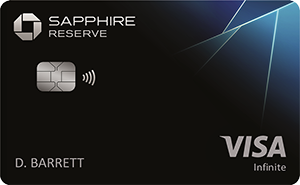
A top player in the high-end premium travel credit card space that earns 3x points on travel and dining while offering top luxury perks.
If you’re looking for an all-around excellent travel rewards card, the Chase Sapphire Reserve ® is one of the best options out there.
The card combines elite travel benefits and perks like airport lounge access , with excellent point earning and redemption options. Plus it offers top-notch travel insurance protections to keep you covered whether you’re at home or on the road.
Don’t forget the $300 annual travel credit which really helps to reduce the annual fee!
- 10x total points on hotels and car rentals when you purchase travel through Chase TravelSM immediately after the first $300 is spent on travel purchases annually
- 10x points on Lyft purchases March 31, 2025
- 10x points on Peloton equipment and accessory purchases over $250 through March 31, 2025
- $550 annual fee
- Does not offer any sort of hotel elite status
- Earn 75,000 bonus points after you spend $4,000 on purchases in the first 3 months from account opening. That’s $1,125 toward travel when you redeem through Chase Travel SM .
- $300 Annual Travel Credit as reimbursement for travel purchases charged to your card each account anniversary year.
- Earn 5x total points on flights and 10x total points on hotels and car rentals when you purchase travel through Chase Travel SM immediately after the first $300 is spent on travel purchases annually. Earn 3x points on other travel and dining & 1 point per $1 spent on all other purchases
- Get 50% more value when you redeem your points for travel through Chase Travel SM . For example, 75,000 points are worth $1125 toward travel.
- 1:1 point transfer to leading airline and hotel loyalty programs
- Access to 1,300+ airport lounges worldwide after an easy, one-time enrollment in Priority Pass TM Select and up to $100 application fee credit every four years for Global Entry, NEXUS, or TSA PreCheck ®
- Count on Trip Cancellation/Interruption Insurance, Auto Rental Collision Damage Waiver, Lost Luggage Insurance and more.
- Member FDIC
- APR: 22.49%-29.49% Variable
- Foreign Transaction Fees: $0
Chase Ultimate Rewards
The Chase Sapphire Reserve card earns valuable, flexible Ultimate Rewards points on every purchase you make.
Here’s how you’ll earn points on the card:
- 10x earnings on car rentals, hotels, and dining booked via Chase Travel
- 5x earnings on air travel
- 3x earnings on all other travel and dining
- 10x earnings on Lyft rides (through March 2025)
- 1x earnings on all other purchases
When it comes time to redeem your Ultimate Rewards points , you’ll have several options offering various values:
- Transfer Ultimate Rewards points to Chase airline and hotel partners to redeem for award tickets or free hotel nights
- Redeem via the Chase travel portal for 1.5 cents each
- Redeem for a statement credit or cash-back at 1 cent each
- Pay Yourself Back to redeem your points for a statement credit at 1.25 to 1.5 each from a list of eligible purchases that rotates
- Redeem for gift cards, experiences, merchandise, or at Amazon and Apple
Other redemption values vary, but always strive to receive no less than 1 cent per point redeemed as you can cash out points for that amount. Transferring Ultimate Rewards points to travel partners can potentially result in the most value for your points. You may also find good value via the Chase travel portal utilizing points at 1.5 cents each for inexpensive flights.
Statement Credits
Receiving statement credits for purchases you’ll be making anyway is an effective way to offset the card’s annual fee. Here are the statement credits you can expect from the Chase Sapphire Reserve card:
- $300 Travel Statement Credit — Each card anniversary year, you’ll receive reimbursement for your travel purchases in the form of a statement credit of up to $300.
- Global Entry, NEXUS, or TSA PreCheck Fee Reimbursement — Once every 4 years, you can receive up to $100 reimbursement for Global Entry fees, $50 for NEXUS enrollment, or $78 for TSA PreCheck.
Additional Benefits

- Complimentary Priority Pass Select Membership — Enjoy access to over 1,400 airport lounge and lounge-alternative properties worldwide with your membership. You’ll also be able to bring in 2 additional guests at no extra charge.
- Complimentary DoorDash DashPass Subscription — You’ll have free delivery on all orders $12 or more and discounted fees (over $100 value). Activate by December 31, 2024.
- No Foreign Transaction Fees — A typical foreign transaction fee can be 3% of your transaction. You won’t have any such fees on your foreign purchases when you use your Chase Sapphire Reserve card.
- Purchase Protection — Use your card to purchase an eligible item and if that item is damaged, stolen, or experiences “involuntary and accidental parting” you could receive up to $10,000 per claim, for a maximum of $50,000 per year . The coverage is valid for 120 days from the purchase date. Gifts purchased for others are also covered.
- Return Protection — If the merchant will not take back any eligible item within 90 days after the purchase date, you could receive up to $500 per item, $1,000 maximum per year.
- Extended Warranty — The manufacturer’s warranty of 3 years or less will be extended for 1 additional year for eligible items. Coverage is limited to $10,000 per claim, $50,000 per account.
Bottom Line: With powerful earning and redemption options, statement credits for specific purchases, worldwide lounge access, and a long list of travel and shopping benefits/protections, the Chase Sapphire Reserve card can be worth the annual fee.
While we think the Chase Sapphire Reserve card is an excellent choice for a travel rewards card, here are a couple of equally appropriate alternatives for the frequent traveler.
The Platinum Card ® from American Express
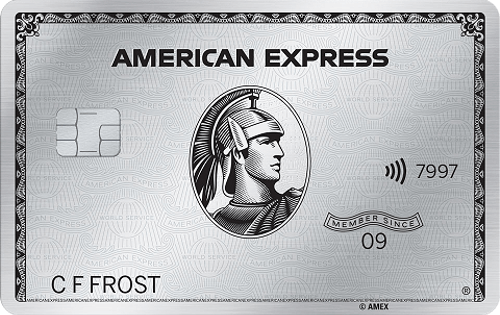
The Amex Platinum reigns supreme for luxury travel, offering the best airport lounge access plus generous statement credits, and complimentary elite status.
Apply With Confidence
Know if you're approved with no credit score impact.
If you're approved and accept this Card, your credit score may be impacted.
When it comes to cards that offer top-notch benefits, you’d be hard-pressed to find a better card out there than The Platinum Card ® from American Express.
Make no mistake — the Amex Platinum card is a premium card with a premium price tag. With amazing benefits like best-in-class airport lounge access , hotel elite status, and tremendous value in annual statement credits, it can easily prove to be one of the most lucrative cards in your wallet year after year.
- The best airport lounge access out of any card (by far) — enjoy access to over 1,400 worldwide lounges, including the luxurious Amex Centurion Lounges, Priority Pass lounges, Plaza Premium Lounges, and many more!
- 5x points per dollar spent on flights purchased directly with the airline or with AmexTravel.com (up to $500,000 per year)
- 5x points per dollar spent on prepaid hotels booked with AmexTravel.com
- $695 annual fee ( rates and fees )
- Airline credit does not cover airfare (only incidentals like checked bags)
- Earn 80,000 Membership Rewards ® Points after you spend $8,000 on eligible purchases on your new Card in your first 6 months of Card Membership. Apply and select your preferred metal Card design: classic Platinum, Platinum x Kehinde Wiley, or Platinum x Julie Mehretu.
- Earn 5X Membership Rewards ® Points for flights booked directly with airlines or with American Express Travel up to $500,000 on these purchases per calendar year and earn 5X Membership Rewards ® Points on prepaid hotels booked with American Express Travel.
- $200 Hotel Credit: Get up to $200 back in statement credits each year on prepaid Fine Hotels + Resorts ® or The Hotel Collection bookings with American Express Travel when you pay with your Platinum Card ® . The Hotel Collection requires a minimum two-night stay.
- $240 Digital Entertainment Credit: Get up to $20 back in statement credits each month on eligible purchases made with your Platinum Card ® on one or more of the following: Disney+, a Disney Bundle, ESPN+, Hulu, The New York Times, Peacock, and The Wall Street Journal. Enrollment required.
- The American Express Global Lounge Collection ® can provide an escape at the airport. With complimentary access to more than 1,400 airport lounges across 140 countries and counting, you have more airport lounge options than any other credit card issuer on the market. As of 03/2023.
- $155 Walmart+ Credit: Save on eligible delivery fees, shipping, and more with a Walmart+ membership. Use your Platinum Card ® to pay for a monthly Walmart+ membership and get up to $12.95 plus applicable taxes back on one membership (excluding Plus Ups) each month.
- $200 Airline Fee Credit: Select one qualifying airline and then receive up to $200 in statement credits per calendar year when incidental fees are charged by the airline to your Platinum Card ® .
- $200 Uber Cash: Enjoy Uber VIP status and up to $200 in Uber savings on rides or eats orders in the US annually. Uber Cash and Uber VIP status is available to Basic Card Member only. Terms Apply.
- $189 CLEAR ® Plus Credit: CLEAR ® Plus helps to get you to your gate faster at 50+ airports nationwide and get up to $189 back per calendar year on your Membership (subject to auto-renewal) when you use your Card. CLEARLanes are available at 100+ airports, stadiums, and entertainment venues.
- Receive either a $100 statement credit every 4 years for a Global Entry application fee or a statement credit up to $85 every 4.5 year period for TSA PreCheck ® application fee for a 5-year plan only (through a TSA PreCheck ® official enrollment provider), when charged to your Platinum Card ® . Card Members approved for Global Entry will also receive access to TSA PreCheck at no additional cost.
- Shop Saks with Platinum: Get up to $100 in statement credits annually for purchases in Saks Fifth Avenue stores or at saks.com on your Platinum Card ® . That's up to $50 in statement credits semi-annually. Enrollment required.
- Unlock access to exclusive reservations and special dining experiences with Global Dining Access by Resy when you add your Platinum Card ® to your Resy profile.
- $695 annual fee.
- Terms Apply.
- APR: See Pay Over Time APR
- Foreign Transaction Fees: None
American Express Membership Rewards
Also packed with a generous collection of travel insurance benefits , the Amex Platinum card shines as a companion for the frequent traveler.
Its lounge access benefits are second to none, plus it offers hotel program elite status, rental car perks , and statement credits for specific purchases. It also earns valuable, and flexible, Membership Rewards points via a generous bonus earnings on eligible travel.
Chase Sapphire Preferred ® Card
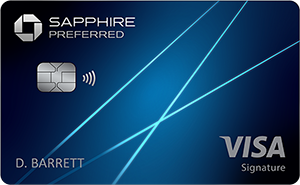
A fantastic travel card with a huge welcome offer, good benefits, and perks for a moderate annual fee.
The Chase Sapphire Preferred ® card is one of the best travel rewards cards on the market. Its bonus categories include travel, dining, online grocery purchases, and streaming services, which gives you the opportunity to earn lots of bonus points on these purchases.
Additionally, it offers flexible point redemption options, no foreign transaction fees, and excellent travel insurance coverage including primary car rental insurance . With benefits like these, it’s easy to see why this card is an excellent choice for any traveler.
- 5x points on all travel booked via the Chase Travel portal
- 5x points on select Peloton purchases over $150 (through March 31, 2025)
- 5x points on Lyft purchases (through March 31, 2025)
- $95 annual fee
- No elite benefits like airport lounge access or hotel elite status
- Earn 75,000 bonus points after you spend $4,000 on purchases in the first 3 months from account opening. That’s over $900 when you redeem through Chase Travel SM .
- Enjoy benefits such as 5x on travel purchased through Chase Travel SM , 3x on dining, select streaming services and online groceries, 2x on all other travel purchases, 1x on all other purchases, $50 Annual Chase Travel Hotel Credit, plus more.
- Get 25% more value when you redeem for airfare, hotels, car rentals and cruises through Chase Travel SM . For example, 75,000 points are worth $937.50 toward travel.
- Get complimentary access to DashPass which unlocks $0 delivery fees and lower service fees for a minimum of one year when you activate by December 31, 2024.
- APR: 21.49%-28.49% Variable
If you’re looking for a travel rewards credit card but are reluctant to pay a high annual fee, or you won’t use all of the benefits offered on the Chase Sapphire Reserve card, you might want to consider the Chase Sapphire Preferred card .
The Chase Sapphire Preferred comes with many of the travel insurance benefits and protections offered by the Chase Sapphire Reserve card and it’s one of our favorite travel rewards cards.
Capital One Venture X Rewards Credit Card

The Capital One Venture X card is an excellent option for travelers looking for an all-in-one premium credit card.
The Capital One Venture X Rewards Credit Card is the premium Capital One travel rewards card on the block.
Points and miles fans will be surprised to see that the Capital One Venture X card packs quite the punch when it comes to bookings made through Capital One, all while offering the lowest annual fee among premium credit cards.
Depending on your travel goals and preferences, the Capital One Venture X card could very well end up being your go-to card in your wallet.
- 10x miles per $1 on hotels and rental cars purchased through Capital One Travel
- 5x miles per $1 on flights purchased through Capital One Travel
- 2x miles per $1 on all other purchases
- $395 annual fee ( rates & fees )
- Does not offer bonus categories for flights or hotel purchases made directly with the airline or hotel group, the preferred booking method for those looking to earn elite status
- Earn 75,000 bonus miles when you spend $4,000 on purchases in the first 3 months from account opening, equal to $750 in travel
- Receive a $300 annual credit for bookings through Capital One Travel, where you'll get Capital One's best prices on thousands of trip options
- Get 10,000 bonus miles (equal to $100 towards travel) every year, starting on your first anniversary
- Earn unlimited 10X miles on hotels and rental cars booked through Capital One Travel and 5X miles on flights booked through Capital One Travel
- Earn unlimited 2X miles on all other purchases
- Unlimited complimentary access for you and two guests to 1,300+ lounges, including Capital One Lounges and the Partner Lounge Network
- Use your Venture X miles to easily cover travel expenses, including flights, hotels, rental cars and more—you can even transfer your miles to your choice of 15+ travel loyalty programs
- Elevate every hotel stay from the Premier or Lifestyle Collections with a suite of cardholder benefits, like an experience credit, room upgrades, and more
- Receive up to a $100 credit for Global Entry or TSA PreCheck ®
- APR: 19.99% - 29.99% (Variable)
Capital One Miles
The newest premium travel rewards card on the block is the Capital One Venture X card . We like that the card comes with an annual $300 credit for travel purchased via Capital One Travel .
The card’s annual fee is also lower than most premium travel rewards cards but you’ll still find travel insurance , worldwide lounge access , Global Entry or TSA PreCheck fee reimbursement, stellar earnings on travel, cell phone protection , and a respectable 2x earnings on all other purchases.
While the high annual fee may be off-putting, the Chase Sapphire Reserve card is packed with plenty of benefits to justify the expense — if you’ll utilize the majority of those benefits.
Our focus today was on travel insurance benefits that alone could save you money, provide compensation, and/or reimbursement if your trip is disrupted. But there is additional value in all the other benefits offered on the card .
A Priority Pass Select membership, for example, will set you back as much as $469 each year, plus $35 for each guest, per visit. The Priority Pass membership that comes with the Chase Sapphire Reserve card offers unlimited access for the cardholder and allows 2 additional guests at no charge.
The card also comes with a $300 travel credit , and up to $100 for Global Entry, NEXUS. or TSA PreCheck fees.
If you can utilize the benefits, the card can be worth it.
All information and content provided by Upgraded Points is intended as general information and for educational purposes only, and should not be interpreted as medical advice or legal advice. For more information, see our Medical & Legal Disclaimers .
For Capital One products listed on this page, some of the above benefits are provided by Visa ® or Mastercard ® and may vary by product. See the respective Guide to Benefits for details, as terms and exclusions apply.
Enrollment required through Capital One website or mobile app. Upon enrollment, eligible cardholders will remain at upgraded status level through December 31, 2024. Please note, enrolling through the normal Hertz Gold Plus Rewards enrollment process (e.g. at Hertz.com) will not automatically detect a cardholder as being eligible for the program and cardholders will not be automatically upgraded to the applicable status tier. Additional terms apply.
For rates and fees of The Platinum Card ® from American Express, click here .
Frequently Asked Questions
Does the chase sapphire reserve card have travel insurance.
The Chase Sapphire Reserve card has one of the best travel insurance packages available.
You’ll find a collection of travel insurance coverages that include primary car rental insurance, trip cancellation/interruption, lost and delayed baggage coverage, emergency evacuation and medical, roadside assistance, and more.
Is the Chase Sapphire Reserve card worth the annual fee?
If you will utilize the benefits offered on the Chase Sapphire Reserve card, the card is definitely worth it.
In fact, we’ve estimated that the card offers benefits that could be valued at nearly $3,500.
Does the Chase Sapphire Reserve card have primary car rental insurance?
The Chase Sapphire Reserve card does offer primary car rental insurance.
Primary car rental insurance does not require that you file a claim with your own car insurance company insurance first. If a covered event occurs, you will have coverage on your Chase Sapphire Reserve card.
You must pay for the entire rental with your Chase Sapphire Reserve card and decline the rental car agency’s collision damage waiver coverage for coverage to be valid.
Can I have more than 1 Chase Sapphire credit card?
While you can have more than 1 Chase credit card, you can only be the primary cardholder on 1 Chase Sapphire credit card, either the Chase Sapphire Reserve card or the Chase Sapphire Preferred card. You could, however, be an authorized user on another Sapphire card.
Which card is better, the Chase Sapphire Preferred card or the Chase Sapphire Reserve card?
Both the Chase Sapphire Preferred card and Chase Sapphire Reserve card offer benefits for the frequent traveler.
The better card for you will depend on your spending mix, your preferred redemption options, your tolerance for paying an annual fee, and the level of travel benefits/protections you will use on the card.
To assist you further, we’ve put together a detailed article comparing the 2 cards. Access our article on the Chase Sapphire Reserve card vs. the Chase Sapphire Preferred card .
Was this page helpful?
About Christine Krzyszton
Christine ran her own business developing and managing insurance and financial services. This stoked a passion for points and miles and she now has over 2 dozen credit cards and creates in-depth, detailed content for UP.
INSIDERS ONLY: UP PULSE ™

Get the latest travel tips, crucial news, flight & hotel deal alerts...
Plus — expert strategies to maximize your points & miles by joining our (free) newsletter.
We respect your privacy . This site is protected by reCAPTCHA. Google's privacy policy and terms of service apply.
Related Posts
![test travel protect IHG® Rewards Club Select Credit Card — Full Review [2024]](https://upgradedpoints.com/wp-content/uploads/2018/03/IHG-Select-Card.jpg?auto=webp&disable=upscale&width=1200)
UP's Bonus Valuation
This bonus value is an estimated valuation calculated by UP after analyzing redemption options, transfer partners, award availability and how much UP would pay to buy these points.
An official website of the United States government Here's how you know
Official websites use .gov A .gov website belongs to an official government organization in the United States.
Secure .gov websites use HTTPS A lock ( Lock A locked padlock ) or https:// means you’ve safely connected to the .gov website. Share sensitive information only on official, secure websites.
May 2024 Air Travel Consumer Report
About this document.
The Air Travel Consumer Report is a monthly product of the Department of Transportation's Office of Aviation Consumer Protection. The report is designed to assist consumers with information on the quality of services provided by the airlines.
Data Included in this Report
Flight Delays: March 2024 / January- March 2024 Mishandled Baggage / Wheelchairs and Scooters: March 2024 /January - March 2024 Oversales: 1st Quarter 2024 (January- March 2024) Consumer Complaints: See Report for Details Customer Service Reports to the Dept. of Homeland Security: March 2024 Airline Animal Incident Reports: March 2024
Individual redacted animal incident reports may be seen by clicking the airline’s name in the report.
COVID is rising in California. Here’s how to protect yourself from FLiRT subvariants
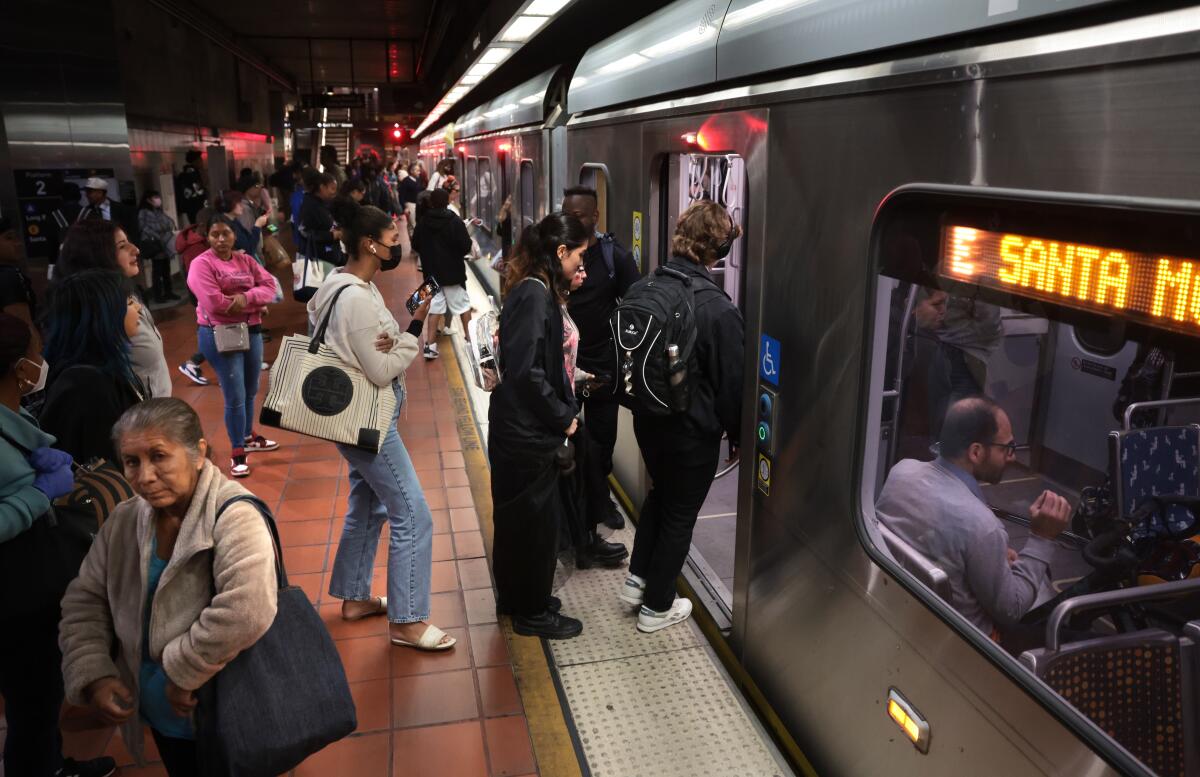
- Show more sharing options
- Copy Link URL Copied!
There are growing signs of an uptick in COVID-19 in California thanks to the new FLiRT subvariants .
It’s far too early to know if FLiRT will be a major change in the COVID picture, and so far the impacts have been small.
But health officials are taking note and are urging Californians — especially those at risk — to be prepared.
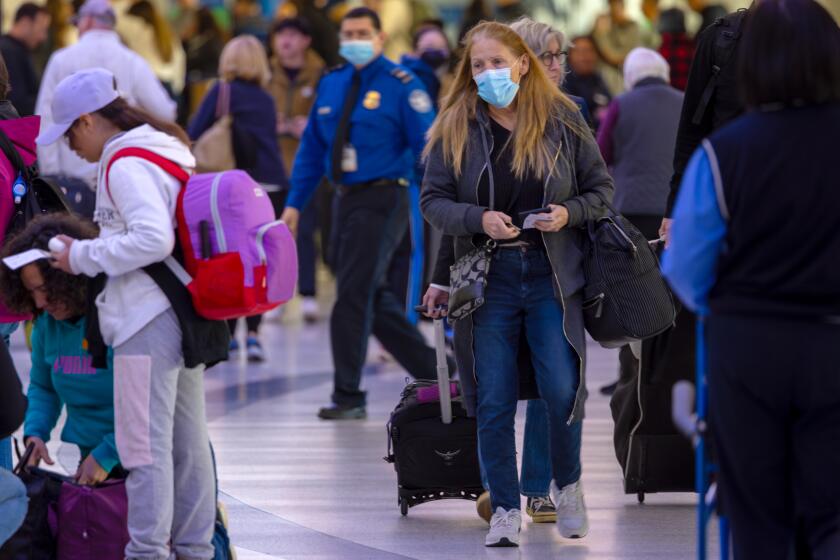
There’s a new highly transmissible COVID-19 variant. Could FLiRT lead to a summer uptick?
In years past, summer travel and gatherings have spurred surges in coronavirus infections. As immunity wanes for those who received the most recent vaccine, experts urge caution.
May 10, 2024
Here’s rundown of what we know and how you can protect yourself.
What are FLiRT subvariants?
The FLiRT subvariants — officially known as KP.2, KP.3 and KP.1.1 — have overtaken the dominant winter variant, JN.1. For the two-week period that ended Saturday, they were estimated to account for a combined 50.4% of the nation’s coronavirus infections, up from 20% a month earlier.
Despite their increased transmissibility, the new mutations don’t appear to result in more severe disease. And the vaccine is expected to continue working well, given the new subvariants are only slightly different from the winter version.
“It’s been quite a while since we’ve had a new dominant variant in the U.S.,” Dr. David Bronstein, an infectious diseases specialist at Kaiser Permanente Southern California told The Times earlier this month. “With each of these variants that takes over from the one before it, we do see increased transmissibility — it’s easier to spread from person to person. So, that’s really the concern with FLiRT.”
What are officials seeing?
Doctors say they are not seeing a dramatic jump in severely ill people, and COVID levels still remain relatively low. But there are signs of a rise in infections that could lead to the summer coronavirus season beginning earlier than expected.
Over the seven-day period that ended May 20, about 3.8% of COVID-19 tests in California came back positive; in late April, that share was 1.9%. (Last summer’s peak test-positive rate was 12.8%, at the end of August.)
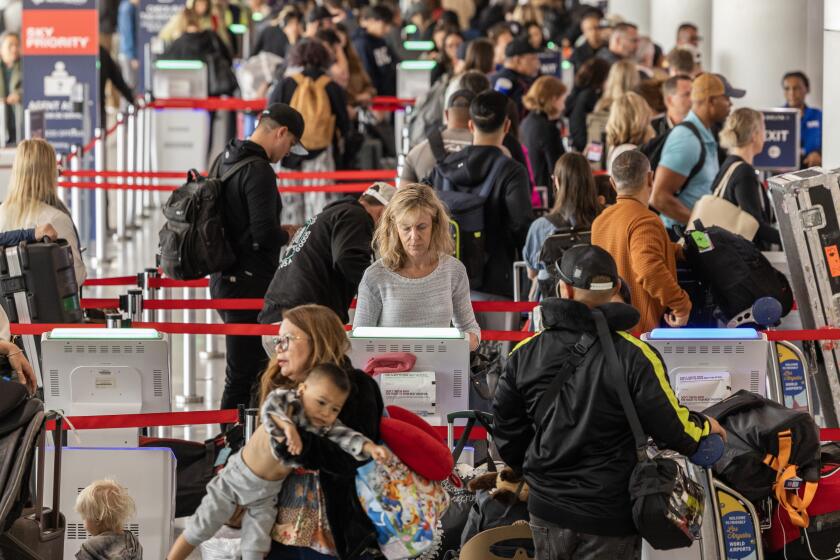
Signs of rising COVID in California as new FLiRT subvariants dominate
California may be headed to an earlier start to the summer COVID-19 season than normal as the latest family of coronavirus subvariants, FLiRT, has made significant gains nationally.
May 27, 2024
In San Francisco, infectious disease doctors are noticing more people in the hospital with COVID-caused pneumonia.
The Los Angeles County Department of Public Health has also started to see a very small uptick in cases in recent days. And Kaiser Permanente Southern California is reporting a small increase in outpatient COVID-19 cases.
How can I protect myself?
Doctors urged people to consider getting up to date on their vaccinations — particularly if they are at higher risk of severe complications from COVID-19.
In California, just 36% of seniors ages 65 and older have received the updated COVID-19 vaccine that first became available in September. The U.S. Centers for Disease Control and Prevention has urged everyone ages 6 months and older to get one dose of the updated vaccine. A second dose is also recommended for those ages 65 and older, as long as at least four months have passed since their last shot.
It’s especially important that older people get at least one updated dose. Of the patients he has seen recently who had serious COVID, said UC San Francisco infectious diseases specialist Dr. Peter Chin-Hong, all of them hadn’t gotten an updated vaccine since September, and were older or immunocompromised.
Avoid sick people. Some sick people might pass off their symptoms as a “cold,” when it could be the start of a COVID-19 illness.
Test if you’re sick, and test daily. It’s sometimes taking longer after the onset of illness for a COVID-19 rapid test to show up as positive. Consider taking a rapid COVID test once a day for three to five consecutive days after the onset of cough-and-cold symptoms, said Dr. Elizabeth Hudson, regional chief of infectious disease at Kaiser Permanente Southern California. Doing so can help the sickened person take measures to later isolate themselves and limit spread of the illness to others.
Have a plan to ask for Paxlovid if you become ill. Paxlovid is an antiviral drug that, when taken by people at risk for severe COVID-19 who have mild-to-moderate illness, reduces the risk of hospitalization and death.
Masks are much less common these days but can still be a handy tool to prevent infection. Wearing a mask on a crowded flight where there are coughing people nearby can help reduce the risk of infection.
How can I protect my family and friends?
The U.S. Centers for Disease Control and Prevention has recently eased COVID isolation guidance, given that the health impacts of COVID-19 are lower than they once were, due to the availability of vaccines, anti-COVID medicines such as Paxlovid and increased population immunity.
There are fewer people getting hospitalized and dying, and fewer reports of complications such as multi-inflammatory syndrome in children.
Still, doctors say it remains prudent to take common sense steps to avoid illness and spreading the disease to others, given that COVID still causes significant health burdens that remain worse than the flu. Nationally, since the start of October, more than 43,000 people have died of COVID; by contrast, flu has resulted in an estimated 25,000 fatalities over the same time period.
While the prevalence of long COVID has been going down, long COVID can still be a risk any time someone gets COVID.
Here’s a guide on what to do if you get COVID-19:
Stay home and away from others while sick, plus a day after you’ve recovered
The CDC says people should stay home and away from others in their household until at least 24 hours after their respiratory viral symptoms are getting better overall, and they have not had a fever (and are not using fever-reducing medicine). Previously, the CDC suggested people with COVID isolate for at least five days, and take additional precautions for a few more days.
In terms of deciding when symptoms are getting better overall, what’s most important is “the overall sense of feeling better and the ability to resume activities,” the CDC says . A lingering cough by itself can last beyond when someone is contagious, the CDC said.
The Los Angeles County Department of Public Health also recommends testing yourself using a rapid test, and getting a negative result, before leaving isolation.
The agency also suggests staying away from the elderly and immunocompromised people for 10 days after you start to feel sick.
Take additional precautions after you recover in case you’re still contagious
People who have recovered from COVID-19 may still be contagious a few days after they have recovered. The CDC suggests taking added precautions for five days after they leave their household and resume spending time with others to keep others safe. They include:
- Wearing a well-fitting mask;
- Continuing to test for COVID-19. If positive, it’s likely you’re more likely to infect others, still;
- Keeping distance from other people;
- Increasing air circulation by opening windows, turning on air purifiers, gathering outdoors if meeting with people;
- And sticking with enhanced hygiene: washing and sanitizing hands often, cleaning high-touch surfaces, and covering coughs and sneezes.
Masking for 10 days to protect others
The L.A. County Department of Public Health says people with COVID-19 need to wear a well-fitting mask for 10 days after starting to feel sick, even if signs of illness are improving, to reduce the chance that other people could get infected. Masks can be removed sooner if you have two consecutive negative test results at least one day apart, the agency says .
Be aware of COVID rebound
COVID rebound can occur when people with COVID-19 feel better, but then start to feel sick two to eight days after they’ve recovered. Some people may also test positive again. COVID rebound can result in you becoming infectious again, capable of infecting those with whom you interact.
Rebound can happen whether or not you take Paxlovid .
Officials say if you feel sick again after having recovered from COVID, go back to following the same instructions to stay at home and away from other people during the first phase of the illness.
If you test positive but have no symptoms
The CDC says if you never had any symptoms, but test positive, take additional precautions for the next five days, such as masking up, testing, increasing air circulation, keeping distance and washing hands often.
The L.A. County Department of Public Health recommends wearing a well-fitting mask for 10 days after testing positive for COVID-19, and also avoiding contact with any high-risk people for 10 days after starting to feel sick, such as the elderly and immunocompromised people. You can remove your mask sooner if you have two consecutive negative tests at least one day apart.
If you are a close contact to someone with COVID-19
L.A. County health officials recommend close contacts of people who have COVID-19 wear a well-fitting mask around other people for 10 days after their last exposure. They suggest getting tested three to five days after their last exposure.
More to Read
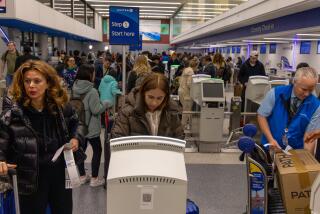
A new coronavirus variant may be behind California’s COVID rise
Dec. 23, 2023
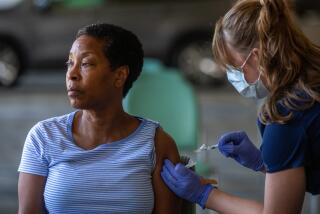
COVID-19 and flu cases are rising in California. How bad will the holiday uptick be?
Dec. 16, 2023
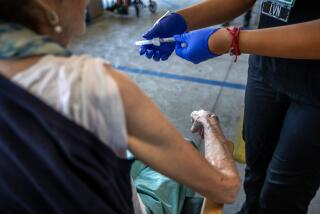
COVID, flu, RSV on the rise in California. Is another ‘tripledemic’ coming?
Dec. 5, 2023

With coronavirus on the upswing in California, new vaccine coming sooner than expected
Aug. 26, 2023

Summer brings COVID-19 uptick amid renewed travel, socializing. How bad will it get?
July 28, 2023
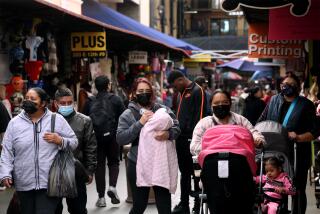
Has California avoided another devastating winter COVID wave?
Jan. 23, 2023
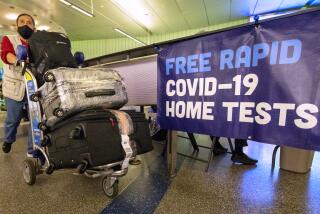
Will XBB.1.5, the latest Omicron subvariant, fuel another California COVID surge? What we know
Jan. 11, 2023
Start your day right
Sign up for Essential California for news, features and recommendations from the L.A. Times and beyond in your inbox six days a week.
You may occasionally receive promotional content from the Los Angeles Times.

Rong-Gong Lin II is a Metro reporter based in San Francisco who specializes in covering statewide earthquake safety issues and the COVID-19 pandemic. The Bay Area native is a graduate of UC Berkeley and started at the Los Angeles Times in 2004.
More From the Los Angeles Times

Los Angeles woman arrested again on suspicion of attempted kidnapping in Koreatown

Entertainment & Arts
‘Outrageous!’ ‘Tears of Joy.’ Hollywood reacts to Trump’s guilty verdict with rage, rapture
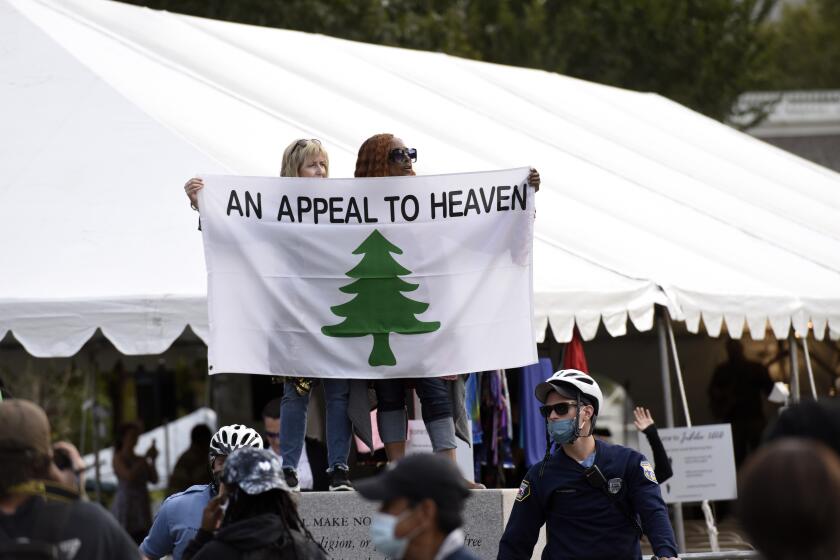
San Francisco removes Pine Tree flag, says it’s tainted by something ‘abhorrent and disgraceful’
May 30, 2024

WeHo Pride is around the corner. Which roads are going to be closed?
Protect Your Trip »
Carry-on luggage and personal item size limits (2024).
Just like checked bags, carry-on luggage size restrictions can vary by airline.
Carry-on Luggage Sizes by Airline

Key Takeaways
- The carry-on size limit for many airlines is 22 x 14 x 9 inches.
- Most domestic airlines do not have a weight limit for carry-on bags.
- You can typically bring a carry-on bag in addition to a personal item.
- Your personal item should be able to fit neatly under the seat in front of you.
If you're traveling with carry-on luggage and/or a personal item, you'll need to adhere to size restrictions in the same way you do with checked bags . These rules include the dimensions of your carry-on bag and, in some scenarios, even the weight.
What size luggage is a carry-on?
While carry-on luggage sizes can vary by airline, several major carriers go by these dimensions.
Airlines calculate carry-on luggage size measurements using two methods:
- Height by width by depth: Most – but not all – airlines measure bags by inches or centimeters using this formula: height by width by depth, such as 22 x 14 x 9 inches. (Note: The dimensions listed below, which are given according to that formula, may differ slightly from the way each individual airline formats its size requirements.)
- Linear inches: A few airlines have linear inch restrictions for carry-on baggage, meaning the airline gives one number for the total of all three dimensions. As long as the combined height, width and depth don't exceed that number, you're in the clear.
Can a 24-inch bag be a carry-on?
Yes, a 24-inch bag can be used as a carry-on suitcase when flying with the following airlines: Frontier, Southwest and Sun Country . However, if you're shopping for new carry-on luggage, it's best to opt for something that meets the requirements for most major airlines (22 x 14 x 9 inches or smaller).
Is there a weight limit for carry-on bags?
Most major domestic airlines do not impose a weight limit on carry-on bags; however, several international airlines have weight restrictions for carry-on luggage and, in some cases, personal items.
Carry-on vs. personal item: What's the difference?
A carry-on bag is typically stored in a plane's overhead bin, while a personal item should fit under the seat in front of you. Most airlines allow economy passengers to bring one carry-on and one personal item – such as an underseat bag – at no extra cost.
Carry-on luggage sizes by airline
Click on the major domestic and international airlines below to see their carry-on luggage size restrictions in inches for economy passengers – and note that any handles and wheels on your bags count toward size limits as well.
Domestic Airlines
Alaska airlines, allegiant air, american airlines, delta air lines, frontier airlines, hawaiian airlines, southwest airlines, spirit airlines, sun country airlines, united airlines, international airlines, all nippon airways, british airways, cathay pacific, klm royal dutch airlines, qatar airways, scandinavian airlines, singapore airlines, turkish airlines, virgin atlantic.
See all Alaska Airlines carry-on policies.
The fee is often around $20 if you pay for your carry-on baggage at the time of booking; it costs a hefty $45 if you add a carry-on bag later – and up to $75 at the gate.
See all Allegiant Air carry-on policies.
The above rules also apply to basic economy tickets.
See all American Airlines carry-on policies.
Note that if you're flying to or from Beijing or Shanghai, there is a 22-pound weight limit for a carry-on; for Singapore, there is a 15-pound limit.
See all Delta Airlines carry-on policies.
There are two instances where the carry-on bag fee is waived:
- You're an elite member of the FRONTIER Miles rewards program .
- You bought a specialty ticket like the WORKS bundle.
Also note that carry-on bag fees, which typically start at around $30, depend on your destination, and that prices are cheapest if you add baggage when you make your booking. You'll pay more to add it later, especially if you do so at the airport. Sometimes it's actually cheaper to purchase a checked bag instead of a carry-on.
See all Frontier Airlines carry-on policies.
See all Hawaiian Airlines carry-on policies.
If you booked a Blue Basic ticket, you're only permitted to bring a personal item that fits under the seat in front of you. If you bring a carry-on bag, you will have to pay $65 to check it at the gate (or up to $180 if you've already checked two other bags). However, select customers with Blue Basic fares can bring carry-on bags for free. These include:
- Active U.S. military personnel
- Unaccompanied minors
- Customers flying to London
If you purchase a higher-class seat or if you reach Mosaic status on JetBlue's TrueBlue rewards program , you can also bring a carry-on bag for free on a Blue Basic ticket.
See all JetBlue carry-on policies.
See all Southwest Airlines carry-on policies.
Spirit's carry-on bag fees vary between flights, but they tend to start at around $25 to $30 for U.S. domestic flights. If you need to bring carry-on luggage, it's always cheapest to pay for it when you first book your flight. It will cost you more to add a bag afterward – and at least double the initial fee if you do it at the airport.
See all Spirit Airlines carry-on policies.
The Sun Country Airlines fee for a carry-on bag is around $30 if you pay for it when booking, or more if you add it later.
See all Sun Country carry-on policies.
There's one notable exception for carry-on baggage with United: Passengers with a basic economy ticket can only take one personal item on board – no carry-on bag. This policy applies to travelers flying basic economy domestically or between the U.S. and Canada. If you have a basic economy ticket and are going to Central or South America (including Mexico) or taking trans-Atlantic or trans-Pacific flights, you can bring a full-size carry-on bag.
See all United Airlines carry-on policies.
Aer Lingus' carry-on policy depends on where you're flying. For trans-Atlantic flights, you can bring one carry-on bag within the dimensions above, plus a small personal item for free. If you're flying within Europe on Aer Lingus, the rules are a bit different: You'll have to pay a fee to bring a carry-on with you on board, starting at 5.99 euros. However, you can check that same bag for free.
If you're flying Aer Lingus Regional (a service with smaller planes, flying mostly around Ireland and the U.K.), a smaller carry-on limit applies: 18.5 x 13 x 8 inches, with a weight limit of 15 pounds.
See all Aer Lingus carry-on policies.
All Aeroméxico customers can bring a standard carry-on bag and a personal item on board. Be careful with the weight limit, though: For international flights or basic fare flights within Mexico, these two items combined cannot weigh more than 22 pounds. So, if your carry-on bag weighs 15 pounds, for example, your personal item cannot be more than 7 pounds.
See all Aeroméxico carry-on policies.
While there's no weight limit for carry-on luggage, Air Canada says your carry-on bag should be light enough that it can easily be lifted into the overhead bin. Also note that airport purchases (for example, larger duty-free items) count toward your baggage limit.
See all Air Canada carry-on policies.
Note that both your personal item and carry-on bag (referred to as "hand baggage") combined must not weigh more than 26 pounds if you're traveling economy. The weight limit is 40 pounds for premium economy and other higher-class cabins.
See all Air France carry-on policies.
A variety of personal items (think a handbag and umbrella) are permitted as long as they fit under the seat in front of you; this includes any items purchased at the airport.
See all All Nippon Airways carry-on policies.
If airline staff put a yellow tag on your bag, it should be stored under the seat in front of you.
See all British Airways carry-on policies.
Cathay Pacific has shifted from a weight allowance to a piece allowance, and this policy varies by itinerary. Passengers are generally permitted to bring one carry-on bag plus a small personal item (and assistive devices like a walking stick), but it's best to check your booking carefully to confirm the exact allowance. You're asked to check in any baggage that's too heavy to lift into the overhead compartment.
See all Cathay Pacific carry-on policies.
Since easyJet is a budget airline, standard fares only allow customers to bring one personal item (called a "small cabin bag") aboard for free. Fees for standard carry-on bags are between 5.99 and 32.99 British pounds, depending on your destination and when you add an extra bag to your reservation.
See all easyJet carry-on policies.
The above rules apply to all economy passengers except those traveling from Brazil, whose carry-on luggage can weigh up to 22 pounds. Emirates only allows economy passengers to bring one item on board; whether you bring a carry-on bag for the overhead bin or a personal item to tuck under the seat, this bag must comply with the size limits.
See all Emirates carry-on policies.
Be aware that the 22-pound weight limit applies to both your personal item and carry-on combined. If your flight was booked through Iberia but is operated by Vueling, similar rules apply, but the size limits for your carry-on bags are slightly smaller.
See all Iberia carry-on policies.
If you're traveling on the cheaper Light ticket, you may be asked to check your carry-on bag for no extra cost, if space is limited.
See all KLM Royal Dutch Airlines carry-on policies.
See all Lufthansa carry-on policies.
The above rules apply to LowFare+ customers. Passengers who fly LowFare (comparable to Basic Economy fare) can only bring a personal item (underseat bag) measuring 15 x 11.5 x 7.5 inches.
See all Norwegian carry-on policies.
Qantas
Economy passengers can opt to bring a nonrigid garment bag measuring 45 x 24 x 4 inches (or 73 linear inches) instead of a standard 22 x 14 x 9-inch carry-on bag. The above rules apply to all economy tickets and vary for higher classes on international and domestic flights with Qantas.
See all Qantas carry-on luggage policies.
Qatar Airways allows passengers to bring multiple personal items provided they fit under the seat in front of you. Unlike with other airlines, laptops and laptop bags do not count as personal items and must fit within your main hand baggage allowance. For tickets issued in Brazil, the carry-on weight limit is 22 pounds.
Be careful: Qatar doesn't accept carry-ons longer than 20 inches, which is shorter than many other airlines.
See all Qatar Airways carry-on policies.
Ryanair is a low-cost carrier, so unless you pay extra, you can only bring one small bag that fits under the seat in front of you, per the personal item guidelines above. To bring a larger carry-on bag, travelers need to purchase Ryanair's Priority & 2 Cabin Bags option, which typically costs between 6 and 32 euros depending on your destination.
See all Ryanair carry-on policies.
Tips on Trips and Expert Picks Newsletter
Travel tips, vacation ideas and more to make your next vacation stellar.
Sign up to receive the latest updates from U.S News & World Report and our trusted partners and sponsors. By clicking submit, you are agreeing to our Terms and Conditions & Privacy Policy .
Most (but not all) Scandinavian Airlines fares allow you to bring one traditional carry-on bag, plus a personal item, which SAS calls an "underseat bag." There's one exception: Passengers traveling within Europe on the Go Light fare must pay for a larger carry-on bag. If you booked a Go Light ticket for intercontinental flights, a carry-on bag is included.
See all Scandinavian Airlines carry-on policies.
Singapore Airlines has an unusual method for measuring carry-on bags – the dimensions of the bag must not add up to more than 45 linear inches total. For example, a bag measuring 15 x 15 x 15 inches would be suitable. All passengers can bring one bag of this size, plus a smaller personal item. The personal item, whose dimensions are specified above, does not count toward the 15-pound carry-on limit.
See all Singapore Airlines carry-on policies.
See all Turkish Airlines carry-on policies.
Virgin Atlantic lets every passenger bring a carry-on bag, including children younger than age 2. You can bring a bag weighing no more than 13 pounds for your child, in addition to a collapsible stroller and/or car seat. Each passenger is also allowed to bring a handbag or small backpack, an umbrella, a walking stick and airport purchases. Take note: Laptops do not count as personal items on Virgin Atlantic and should fit into your main carry-on bag. There's no specific size limit on the other personal items, but bags or airport purchases should fit under the seat in front of you.
See all Virgin Atlantic carry-on policies.
Note that the above rules apply to passengers who book a TimeFlex or Premium Fare, as well as anyone traveling with a child under age 2 and/or requiring special assistance at the airport.
See all Vueling carry-on policies.
See all WestJet carry-on policies.
Why Trust U.S. News Travel
Amanda Norcross is a seasoned traveler who packs just one carry-on bag and a personal item – even when adventuring with her toddler . She used her personal experience and research skills to put together this guide, and notes that even if your carry-on bag meets size restrictions, you may still need to check it at the gate because of limited space in the overhead bin. Luckily, it's still free.
You might also be interested in:
- The Best Carry-on Backpacks
- What Is Allowed in a Carry-on?
- What to Pack in a Carry-on Bag
- The Best Travel Insurance Companies
Tags: Travel , Airlines , Travel Tips
World's Best Places To Visit
- # 1 South Island, New Zealand
- # 4 Bora Bora
If you make a purchase from our site, we may earn a commission. This does not affect the quality or independence of our editorial content.
You May Also Like
Road trip essentials.
Alissa Grisler and Amanda Norcross May 29, 2024

The Best Whale Watching in Santa Barbara
John Rodwan and Suzanne Mason May 29, 2024

Top Pride Parades and Celebrations
Suzanne Mason May 28, 2024

The Best Underseat Luggage
Rachael Hood May 28, 2024

The Best Miami Boat Tours
Gwen Pratesi May 28, 2024

The Best Travel Purses
Rachael Hood May 24, 2024

The Best Beach Games
Gwen Pratesi May 24, 2024

The Best Branson Shows
Carrie A. Back May 23, 2024

The Best Beach Toys for Kids
Amanda Norcross May 23, 2024

The Best Charleston Tours
John Rodwan May 23, 2024


An official website of the United States government
Here’s how you know

Official websites use .gov A .gov website belongs to an official government organization in the United States.
Secure .gov websites use HTTPS A lock ( Lock A locked padlock ) or https:// means you’ve safely connected to the .gov website. Share sensitive information only on official, secure websites.

- Local Media Release
Baltimore CBP Officer Overcomes Incredible Challenges and Health Scare to Earn the Commissioner’s Award for Resiliency
BALTIMORE – It’s a remarkable story of bravely juggling a challenging professional career and raising five energetic children while battling through a rare and unforgiving cancer, and it’s a story that earned Sicklerville, N.J., resident Tahira Manns national recognition recently for exceptional resiliency.

Manns, 42, serves as a passenger operations program manager with U.S. Customs and Border Protection’s (CBP) Baltimore Field Office, a Mid-Atlantic regional operations headquarters. On April 22, Troy A. Miller, Senior Official Performing the Duties of the Commissioner, presented Manns with the Commissioner’s Resiliency Award for 2023 during a ceremony at Constitution Hall in Washington, D.C.
Manns was diagnosed in August 2021 with Stage 2B Triple Negative Breast Cancer (TNBC). At the time, she was the sole caregiver for her teen son and daughter, two young nieces, a young nephew, and her 86-year-old grandmother. She also served in a leadership position with CBP’s Mid-Atlantic Intelligence Division, a critical assignment on a team that constantly pored over evolving intelligence and investigated dangerous threats to our homeland.
According to the American Cancer Society, TNBC tends to grow quickly, is more likely to have spread at the time it is found, and is more likely to come back after treatment than other types of breast cancer. Because of this, the survival rates for TNBC are generally not quite as high as they are for other types of breast cancer.
As expected, this was a stressfully terrifying time, so Manns sought comfort by staying busy and focusing on task management – meeting her family’s needs, meeting her work expectations, supporting her peers’ needs, and attacking cancer treatment head on.
“It was hard. My emotions were unstable. Talking about my situation would bring tears to my eyes, but I tried to keep a smile on my face,” Manns said. “I just tried to stay busy. I still had goals I wanted to achieve, and if my time clock was ticking, I still wanted to be remembered for my awesome personality, my love for my family and friends, my work ethic and ambition, and my willingness to always help others.”
Manns is a single-parent and relied on family and friends, the goodwill of neighbors, and especially on her three other children – biological daughter, and adopted son and daughter, all in their early 20’s – to help her through surgery and radiation treatments and with family responsibilities.
“My family and friends were very supportive during this time. The exhaustion and the changes my body was going through were very dramatic,” Manns said. “My oldest daughters would take me to my treatment appointments, and my youngest daughter, who is an aspiring immunologist, helped prepare my meals to ensure that I was eating right; she wouldn’t let me eat junk food.”

Manns, who was raised in Willingboro, N.J., and still lives in Sicklerville, has been with CBP since 2014. She had previously served on CBP’s passenger analysis unit at Philadelphia International Airport, and has been detailed to CBP’s Baltimore Field Office since 2019. She appreciates her leadership, mentors, the very small number of peers who knew of her cancer, and especially her doctors for accommodating her telework option to address her healthcare needs.
“Telework was the best thing that happened in this entire experience,” Manns said. “My doctors were so understanding. They set me up in a private room so that I could still work during my chemotherapy treatments. I really didn’t want my illness to keep me from still achieving my goals, and so I focused on thriving through this traumatic experience.”
“The fact that I have so many people depending on me keeps me moving forward and trying to stay positive,” Manns said.
Manns has completed chemotherapy and continues appointments with her surgical oncologist.
“Tahira Manns is an amazing Hallmark story of inspirational bravery and perseverance through a life-altering health scare to care for her family and satisfy her work responsibilities, and she epitomizes the very resiliency that we hope to instill in all our workforce. She is very deserving of the Commissioner’s Resiliency Award,” said Matthew Davies, CBP’s Acting Director of Field Operations, Baltimore Field Office.
CBP annually hosts its annual Commissioner’s Awards Ceremony to recognize employees for remarkable deeds and accomplishments. CBP presented awards to 294 employees across 21 categories, including recognition for heroism, safety, integrity, best practices, volunteer service, and leadership. The Commissioner Awards recognized both individual and team performance. Read more about the CBP Commissioner’s Awards ceremony .
CBP's border security mission is led at our nation’s Ports of Entry by CBP officers and agriculture specialists from the Office of Field Operations. CBP screens international travelers and cargo and searches for illicit narcotics, unreported currency, weapons, counterfeit consumer goods, prohibited agriculture, invasive weeds and pests, and other illicit products that could potentially harm the American public, U.S. businesses, and our nation’s safety and economic vitality.
See what more CBP accomplished during " a Typical Day ." Learn more about CBP at www.CBP.gov .
Follow the Director of CBP’s Baltimore Field Office on X (formerly Twitter) at @DFOBaltimore for breaking news, current events, human interest stories and photos, and CBP’s Office of Field Operations on Instagram at @cbpfieldops .
U.S. Customs and Border Protection (CBP) is America's frontline: the nation's largest law enforcement organization and the world's first unified border management agency. The 65,000+ men and women of CBP protect America on the ground, in the air, and on the seas. We facilitate safe, lawful travel and trade and ensure our country's economic prosperity. We enhance the nation's security through innovation, intelligence, collaboration, and trust.

IMAGES
VIDEO
COMMENTS
Best Covid Travel Insurance Policies. Travel Insured - Worldwide Trip Protector. WorldTrips - Atlas Journey Premier/Atlas Journey Preferred. Seven Corners - Trip Protection Choice/Trip ...
Best travel insurance category. Company winner. Best overall. Berkshire Hathaway Travel Protection. Best for emergency medical coverage. Allianz Global Assistance. Best for travelers with pre ...
Berkshire Hathaway Travel Protection: $147. $246. $595. ... accommodations if you're required to quarantine during your trip if you test positive for coronavirus; health care; and trip ...
The best travel insurance companies are PrimeCover, Travel Insured International and WorldTrips, based on our analysis of 42 policies. Travel insurance policies package together valuable benefits ...
Testing before and after travel can lower the risk of spreading the virus that causes COVID-19. If you haven't been vaccinated, the CDC recommends getting a viral test within three days before your trip. Delay travel if you're waiting for test results. Keep a copy of your results with you when you travel.
The terms travel protection and travel insurance are often used interchangeably, and both aim to protect you financially if you have issues during your travel. Although it can offer some of the ...
Countries that require travel insurance to visit; Qualified Home Test Kits - See requirements for at-home COVID-19 testing in order to file a travel insurance claim and common testing kits that qualify. ... your travel protection plan can help if you get sick during your trip and need to seek treatment or medical evacuation. In addition, our ...
Why we chose it: We chose Seven Corners as the best travel insurance for large groups because it insures parties of 10 or more travelers through comprehensive policies that cover medical expenses and evacuations.. Seven Corners' simple and budget-friendly Trip Protection Choice plan covers trip cancellation, interruption or delays for specific reasons, including COVID-19 for groups of 10 or ...
For reentry to the U.S., the CDC requires all air passengers age 2 years and older (including U.S. citizens and fully vaccinated passengers) to provide either documentation of a negative test taken within one day of their flight or documentation of recent recovery from COVID-19, along with a letter from a health professional certifying that the person is cleared to travel.
Travelex Insurance Services: Best Optional Coverage Add-ons. Allianz Travel Insurance: Best for Multitrip and Annual Plans. World Nomads Travel Insurance: Best for Active Travelers. Generali ...
For a single trip, multiple trips or long term. Covered by most policies. $15/25. IMG. Single trip or multiple trips (travel insurance and travel medical insurance options are available). Waived under set conditions for travel insurance; covered but capped for single-trip travel medical insurance. $17/$94.
If you're traveling without being fully vaccinated, you can take some steps to protect yourself and the people around you: Get a COVID test 1 to 3 days before you leave. Wear a mask on public ...
At-home COVID test: EmpowerDX At-Home COVID-19 PCR Test. Portable hand sanitizer: Touchland Power Mist Sanitizer Spray. Travel-sized disinfectant wipes: Clorox Disinfectant Wipes To Go. A ...
All travel protection plans available from this website include a combination of: Travel Insurance and. Travel Assistance Services, which together help give you aid and comfort during your travels. For example: our Travel Insurance can reimburse you for medical costs if you fall and twist your ankle; while the 24/7 Travel Assistance included ...
Get up to date with your COVID-19 vaccines before you travel and take steps to protect yourself and others.Consider wearing a mask in crowded or poorly ventilated indoor areas, including on public transportation and in transportation hubs. Take additional precautions if you were recently exposed to a person with COVID-19. Don't travel while sick. If you have a weakened immune system or are ...
With ResNexus Travel Protection, your guest will get a 100% reimbursement minus the Travel Protection fee in the event of an unexpected death of an immediate family member that occurs 14 days or less before their arrival date that prevents them from attending or completing their booking. And yes, ResNexus Travel Protection does reimburse the ...
Best Portable Safe: Pacsafe Travelsafe Portable Safe at Amazon ($110) Jump to Review. Best Money Belt: Raytix RFID Money Belt at Amazon ($20) Jump to Review. Best Anti-theft Backpack: Sherpani ...
A travel test, also known as a pre-travel test or a PCR test, is a medical test conducted to detect the presence of SARS-CoV-2, the virus that causes COVID-19. It involves collecting a sample, usually a nasal swab or a saliva sample, and sending it to a laboratory for analysis. The test looks for genetic material specific to the virus and can ...
The Best Travel Medical Insurance for Visitors to the U.S. Atlas America - Best Overall. Patriot America Lite - Best for Cost. Patriot America Plus - Great for Trip Interruption Insurance ...
AllTrips Premier. This plan provides an entire year of worldwide travel protection and concierge service. One plan can cover you and your household, whether you're traveling separately or together. Discover the affordable and comprehensive travel insurance plans offered by Allianz Global Assistant. Get a Quote and buy online instantly.
File a travel claim, upload supporting documents, check the status of an existing claim and more.
Aon Affinity's Travel Practice is a leader in the provision of customized travel insurance and protection programs for many of the world's most renowned travel companies. With a focus on the design, distribution, and management of customized programs, Aon Affinity empowers clients to optimize program performance.
Because we extended our trip & we weren't in Australia when taking out the policies, travel protect won't cover us for anything. We did the right thing, we bought a new policy to cover us for the extra days we were staying but that, in Travel Protects opinion doesn't count. Date of experience: 01 May 2024. Useful. Share. CH. Chantelle. 2 reviews.
The Chase Sapphire Reserve card has travel insurance benefits that can save you money, offer travel protections, and provide peace of mind. News. Credit Cards. Credit Cards By Issuer. ... stellar earnings on travel, cell phone protection, and a respectable 2x earnings on all other purchases. Final Thoughts. While the high annual fee may be off ...
The Air Travel Consumer Report is a monthly product of the Department of Transportation's Office of Aviation Consumer Protection. The report is designed to assist consumers with information on the quality of services provided by the airlines. Data Included in this Report. Flight Delays: March 2024 / January- March 2024.
Masking for 10 days to protect others. The L.A. County Department of Public Health says people with COVID-19 need to wear a well-fitting mask for 10 days after starting to feel sick, even if signs ...
WASHINGTON - U.S. Customs and Border Protection (CBP) announced today that the Global Entry mobile application can now be used at eight additional airports, enabling more trusted travelers to complete their arrival processing on the plane instead of waiting in line to use a portal. "CBP has prioritized Global Entry arrival to enhance the speed, accuracy, and security of the arrival process ...
Protect Your Trip » Search, compare and buy the best travel insurance for the lowest price. Carry-on Luggage Sizes by Airline. Advice. Travel. Carry-on Luggage and Personal Item Size Limits (2024)
The 65,000+ men and women of CBP protect America on the ground, in the air, and on the seas. We facilitate safe, lawful travel and trade and ensure our country's economic prosperity. We enhance the nation's security through innovation, intelligence, collaboration, and trust.
Driving the day. SUMMER TRAVEL SURGE: Summer travel has arrived. And the thousands of flights and millions of passengers anticipated this season bring inherent risks that could test the system ...